World Bank Projects Oil Glut in 2025, Foresees Price Drop to
Dike Onwuamaeze

Dike Onwuamaeze
if he makes a comeback. Having survived two assassination attempts, convicted of 34 felony charges, found liable by a New York Court of sharp business practices,
Deji Elumoye and Chuks Okocha
Former Vice President Atiku Abubakar and the presidency, yesterday, squabbled over the state of the nation, especially the tottering economy.
Atiku, the Peoples Democratic Party (PDP) 2023 presidential candidate, who took a swipe at President Bola Tinubu’s leadership, advising him to eat the humble pie and adopt some of the policies in his manifesto in order to turn around the economy for good.
But the presidency, in its response, said if Atiku had won the 2023 presidential election, which held March last year, Nigeria would have been worse under his watch.
In a long statement personally signed, Atiku said he had been inundated with questions as to what he would have done differently if he was at the helm of affairs of the country. He stated, “I am not the president, Tinubu is. The focus should be on





him and not on me or any other. I believe that such inquiries distract from the critical questions of what Tinubu needs to do to save Nigerians from the excruciating pains arising from his trial-and-error economic policies.
''However, I understand and appreciate the challenges faced by citizens in seeking alternatives to what is not working for them. I hope Tinubu and members of his administration are humble enough to borrow one or two things from our ideas in the interest of the Nigerian people.
“I would now go ahead and articulate some of our ideas that would have had the potential to transform our beloved country,'' he said.
On subsidy removal, Atiku pointed out that he has always advocated for the removal of subsidy on petrol because its administration had been mildly put, opaque with so much scope for arbitrariness and corruption. He insisted that mind boggling rent profit from oil subsidy accrued to the cabals in public institutions and the private sector.
''I would have prioritised the following: First, tackling corruption. Fighting corruption should have commenced with the repositioning of the Nigerian National Petroleum Company Limited (NNPC), which is a huge beneficiary of the status quo.
“Its commitment to reform and capacity to implement and enforce
reforms is suspect. The subsidy regime has provided an avenue for rent seeking, and the NNPC and its guardians will be threatened by reforms.”
The former vice president added, “Second, paying particular attention to Nigeria’s poor refining infrastructure. We are by far the most inefficient Organisation of Petroleum Exporting Countries (OPEC) member country in terms of both the percentage of installed refining capacity that works and the percentage of crude refined.
“We would’ve commenced the privatisation of all state-owned refineries and ensure that Nigeria starts to refine at least 50 per cent of its current crude oil output. Nigeria should aspire to export 50 per cent of that capacity to ECOWAS member states.”
He stated that he would have adopted a gradualist approach in the implementation of the subsidy reforms, highlighting that subsidies would not have been removed suddenly and completely.
Atiku said during his time as vice president, the government adopted a gradualist approach and had completed phases one and two of the reform before the tenure ended.
He stated, “The incoming administration in 2007 abandoned the reforms, unfortunately. The majority of the countries that review or rationalise subsidy payments adopt a
gradualist approach by phasing price increases or shifting from universal to targeted approach (Malaysia, 2022 and Indonesia, 2022 -2023).
“In many European Union (EU) economies, complete withdrawal often takes five years to effect. The gradualist approach allows for adjustments, adaptation and minimises disruptions and vulnerability.”
Atiku said he would have implemented a robust social protection programme that will support the poor in navigating the cost of living challenges arising from reform implementation.
He explained, “We would’ve invested the savings from subsidy withdrawal to strengthen the productive base of the economy through infrastructure maintenance and development; to improve outcomes in education and healthcare delivery.
“To improve rural infrastructure and support livelihood expansion in agriculture; and develop the skills and entrepreneurial capacity of our youth in order to enhance their access to better economic opportunities.”
On a general level, Atiku said he would have planned better and more robustly, stating that his reforms would have benefited from more adequate preparation; more sufficient diagnostic assessment of the country’s conditions; more consultations with key stakeholders; and better ideas for
the final destination.
According to him, ''We would have been guided by my robust reform agenda as encapsulated in 'My Covenant With Nigerians', my policy document that sought to, among others, protect our fragile economy against much deeper crisis by preventing business collapse; our document had spelt out policies that were consistent and coherent.
''We would have sequenced my reforms to achieve fiscal and monetary congruence. Unleashing reforms to determine an appropriate exchange rate, cost-reflective electricity tariff, and PMS price at one and the same time is certainly an overkill.”
He said the bullish money tightening spree by the Central Bank of Nigeria (CBN) was also an issue. He stressed that as importer of premium motor spirit (PMS) and other petroleum products, removing subsidy on these products without a stable exchange rate was counterproductive.
Atiku stated, “We would have been more strategic in our response to reform fallout. We would not over-estimate the efficacy of the reform measures or underestimate the potential costs of reforms. I would recognise that reforms could sometimes fail.
“I would not underestimate the numerous delivery challenges, including the weaknesses of our institutions, and would work assiduously to correct the
nearly $500 million, and having been impeached twice, accused of being a racist, fascist and so on, will Americans hand him the keys to the White House for another term?
Seen by a section of American voters as an extraordinary candidate, never seen in the history of America, Trump appears to have surmounted every negativity, whether those thrown at him by his political detractors or in many cases, the ones that are self-induced.
Besides, poll after poll have shown that other key concerns to Americans include immigration and the economy, two main issues that are expected to significantly swing the votes.
In all, the election will see the end of almost two years of non-stop exhausting political campaigns, including a last-minute switch of the Democrats’ erstwhile candidate, President Joe Biden, who was replaced by his vice, Harris, in July.
The nail-biting election, which has left many voters on edge, is also expected to significantly alter the dynamics of major crisis points around the world, including the conflict between Russia and Ukraine; the war between Israel and Hamas, and, by extension, Iran and others. The outcome of the polls may also affect the confrontations in Yemen, Sudan, Myanmar, among others, depending on who eventually emerges victorious.
Several polls have come out with mixed results and largely predicted a very tight race between the two major contenders, with election just a day away.
An exclusive USA TODAY/Suffolk poll at the weekend showed Harris and Trump tied in Pennsylvania, the swing state with the most electoral votes, while a The Washington Post poll of likely voters and registered voters saw Harris leading Trump by one percentage point. Harris, 60, was at 48 per cent among both likely and registered voters, while Trump,78 was at 47 per cent.
But Harris' lead in the battleground states has slimmed from a Harris/ Forbes poll released a week earlier; at that point Harris had a 50 per cent-to-46 per cent advantage. Some voters remain undecided, the latest poll found, with 10 per cent of likely voters and 16 per cent of all registered voters still weighing their choices.
Harris was also leading Trump in Michigan in a new Detroit Free Press poll released this weekend, showing the vice president leading 48 per cent to 45 per cent, with a margin of error of ± 4 points.
But Trump is leading Harris in Florida in a new Stetson University Centre for Public Opinion Research poll, with 53 per cent to 46 per cent for Harris.
In the blue state of Massachusetts,
Harris appears to be getting the same support President Joe Biden and candidate Hillary Clinton received from voters in the 2020 and 2016 elections, suggested the MassINC Polling Group's final poll of Massachusetts voters.
Harris leads Trump 61 per cent to 31 per cent in the poll. But a Reuters report found Harris' lead over Donald Trump dwindled in the final stretch of the US presidential contest, with the Democrat ahead by a single percentage point over the Republican, 44 per cent to 43 per cent, according to the Reuters/ Ipsos poll.
Both Harris and Trump have widely differing positions on many policy issues, ranging from education and taxes to social security and Medicare. As they compete for the White House, both candidates have laid out their plans in speeches, campaign ads and media interviews. Most of it amounts to a wish list, sketched out in broad strokes and lacking concrete details about how they would be implemented or paid for. A number of Trump’s proposals raise legal questions, while some of Harris’s would probably require Democratic control of Congress.
On reproductive rights, after the conservative-dominated US Supreme Court in 2022 struck down the constitutional right to abortion, Democrats made restoring access to reproductive care a core campaign issue.
Harris was a vocal proponent of reproductive rights before she became the nominee, assailing Trump and Republicans for creating a “healthcare crisis” that has led to the preventable deaths of women seeking abortion care.
As a candidate, she has called on Congress to pass legislation to restore the protections of Roe v Wade, which the Supreme Court overturned in 2022 and which, in effect, blocked states from banning abortion before foetal viability, or about 24 weeks of pregnancy. As president, Harris has vowed she would veto any nationwide abortion ban.
Harris pledged to protect access to contraception and other fertility treatments, such as in vitro fertilisation (IVF). She has also touted efforts by the Biden-Harris administration to safeguard access to medical abortion and protect women who cross state lines to access the procedure.
Trump has, alternately, bragged about his role appointing three Supreme Court justices whose votes were decisive in overturning Roe, and complained that bans on abortion in Republican-controlled states may
hurt him electorally.
Trump said abortion access should be left to the states, and vowed that as president he would not sign a national abortion ban.
He has also said that if he wins he would make IVF free for women, though he has provided few specifics and Republicans in Congress have repeatedly blocked legislation that would protect the treatment.
As for immigration, Trump has made it central to his campaign, promising mass deportations of millions of immigrants living in the country without authorisation. In a second term, he has vowed to go much further than he did four years ago.
He has promised to carry out the largest domestic deportation operation in US history. He has said he would reinstate several controversial policies from his first term, including the Remain in Mexico programme, and a travel ban targeting several Muslim-majority nations. He has vowed to rescind programmes that shield undocumented people from deportation, including children.
But Harris has mainly stated that she would revive a bipartisan congressional agreement when it comes to addressing US immigration policy. She has sought to flip the script on immigration, one of her biggest political vulnerabilities.
While housing is typically handled at the local level, both presidential candidates want to tackle the housing crisis at the federal level, according to States Newsroom, the nation’s largest state-focused non-profit news organisation
On taxation, the tax law crafted under the Trump administration in 2017 is set to expire next year, meaning whichever candidate wins the White House will either overhaul the previous law or extend it
Regardless of who wins the White House, the next president will have several international crises to address. They include the Israel-Hamas war in the Middle East, Russia-Ukraine conflict, and US-China trade relations.
On the issue of inflation, while the overall economic picture has brightened in recent months, Harris has said she agrees with Americans that prices are “still too high” after several years of significant inflation.
She wants to build up the “opportunity economy,” focused on the middle class, with plans to combat price gouging, boost housing development, aid first-time homebuyers, and expand tax credits for parents.
She has pledged to cut taxes for tens of millions of middle- and low-income families, while saying she supports tax breaks for entrepreneurs and small business owners. She also backs a proposal championed by
same. I would, as a responsible leader, pause, reflect, and where necessary, review implementation.''
Atiku said he would have led by example.
He added, ''Any fiscal reform to improve liquidity and the management of our fiscal resources must first eliminate revenue leakages arising from governance, including the cost of running the government and the government procurement process. I (and members of my team) would not have lived in luxury while the citizens wallow in misery.
''We would have communicated more effectively with the people, with civility, tact, and diplomacy. Transparent communication with the public is essential to build public trust, which in turn is important to ensure that the public understands what the government is doing.
''We would have consulted more with all stakeholders to learn, negotiate, adapt, and modify, among other policy goals. We would have demonstrated more empathy. My Reforms would wear a human face.
capacity of approximately $10 billion to support small businesses across all economic sectors.
Alongside the ESF, he stated that he would have launched a uniquely designed skills-to-job programme that targets all categories of youth, including graduates, early school leavers as well as the massive numbers of uneducated youth currently not in education, employment, or training. He said, “To underscore our commitment to the development of infrastructure, an Infrastructure Development Unit (IDU) directly under the President’s watch would have come into operation.
“The IDU will have a coordinating function and a specific mandate of working with the MDAs to fast track the implementation of the infrastructure reform agenda within the framework provided herein.
“The IDU will hit the ground running in putting the building blocks for our private sector driven Infrastructure Development Fund (IDF) of approximately $25 billion.
Trump to eliminate taxes on tips.
On trade, Harris is expected to maintain the Biden administration’s approach, relying on tariffs and export controls to boost domestic competitiveness with China. On the campaign trail, she has also touted the Biden administration’s ambitious investments in infrastructure and renewable energy.
But much of Trump’s inflationreduction plan hinges on his vow to slash energy costs by expanding oil and gas drilling and deregulation, though economists say his plans for sweeping tariffs and mass deportations could actually raise costs.
He has also been highly critical of high interest rates, the Federal Reserve’s main inflation-fighting tool.
Trump said recently that he thought the president should have a say in decisions made by the Fed, which traditionally operated independently from politics.
In a second term, he has vowed to extend and expand a suite of tax cuts he signed into law in 2017, while pledging to cut the corporate tax rate to 15 per cent, from 21 per cent for companies that make their products in the US. He has also said he would exempt social security benefits, in addition to tips, from income taxes.
Harris, like Biden, views Trump as a direct threat to democracy. She has highlighted her role as a prosecutor to draw a contrast with Trump, who was found guilty of 34 felony counts in a New York hush-money case over his attempt to influence the outcome of the 2016 campaign.
He also faces several other cases related to his efforts to overturn his 2020 defeat and his handling of classified documents. Harris has relied on anti-Trump Republicans to help remind Americans of Trump’s role inciting the deadly attack on Congress of January 6, 2021.
But Trump has never stopped fully repeating that his 2020 presidential election loss to Joe Biden was marred by fraud. He has refused to say whether he would accept the results of the 2024 election, suggesting that the only way his opponent could win is if she cheated, The Guardian reported.
He has also said he would pardon defendants convicted for their roles in the January 6 attack on the US Capitol.
Besides, Harris’s approach to foreign policy has hewed closely to the president’s, with an emphasis on maintaining the US’s global alliances. She has fully aligned herself with the Biden administration’s response to Russia’s invasion of Ukraine nearly three years ago, pledging unyielding support for the nation.
Harris has repeatedly attacked
“We would have been more strategic in the design and implementation of reform fallout mitigating measures. I would not run a ‘palliative economy’ yet, we would have a robust social protection programme that will offer genuine support to the poor and vulnerable and provide immediate comfort and security to enable them to navigate the stormy seas.''
Besides, Atiku said he would have undertaken extensive reforms of public sector institutions to maximise reform impact, with special focus on security. He said he would have commenced from day one on reform of the security institutions with improved funding, and enhanced welfare.
He stated that his policy document had spelt out a special presidential welfare initiative for security personnel, and he would have adopted alternative approaches to conflict resolution, such as diplomacy, intelligence, improved border control, deploying traditional institutions, and good neighbourliness.
In addition, Atiku said he would have launched an Economic Stimulus Fund (ESF), with an initial investment
''To engender fiscal efficiency and promote accountability and transparency in public financial management, we would have committed to a review of the current fiscal support to ailing state-owned enterprises. We would’ve also begun a process review of government procurement processes to ensure value-for-money and eliminate all leakages.
''We would have initiated a review of the current utilisation of all borrowed funds and ensured that they were deployed more judiciously.''
On foreign exchange reforms, Atiku said he also made a commitment to reform the operation of the foreign exchange market, and eliminate multiple exchange rate windows.
He stated, “The system only served to enrich opportunists, rentseekers, middlemen, arbitrageurs, and fraudsters. A fixed exchange rate system was out of the question because it would not be in line with our philosophy of running an open, private sector friendly economy.
“On the other hand, given Nigeria’s underlying economic conditions,
“Indeed, under these baseline assumptions, global oil supply next year is expected to exceed demand by an average of 1.2 million bpd—a degree of oversupply only surpassed during COVID-19-related shutdowns in 2020 and the 1998 oil price collapse.”
It ascribed the projected oil glut to a major shift in China, where oil demand has essentially flattened since 2023 amid a slowdown in industrial production and an increase in sales of electric vehicles and trucks powered by Liquefied Natural Gas (LNG).”
It added that several countries that are not part of the Organisation of Petroleum Exporting Countries (OPEC) or its allies (OPEC+) are expected to ramp up oil production.
The report, however, projected that if the current Middle East conflict would escalate and resulted in reducing the global oil supply by 2.0 per cent or 2 million barrels per day, the Brent prices would initially rise sharply to a peak of $92 a barrel.
“However, oil producers unaffected by the conflict could quickly respond to higher prices by boosting oil production.
“As a result, the price spike could be relatively short-lived, with the oil price averaging $84 a barrel in 2025. That would still be 15 per cent above the baseline forecast for 2025 but only 5 per cent above the 2024 average,” the report said.
The report also projected that global oil supply would reach about 103 mb/d in 2024, up from 102.3 mb/d in 2023, before rising to about 105 mb/d in 2025.
Most of the growth in production is expected to occur in the United States of America, with increases of about 0.6 mb/d in both 2024 and 2025.
The report said: “Supply is
projected to continue increasing up to 0.5 mb/d a year in Brazil, Canada, and Guyana combined. In 2025, production is also predicted to increase in several small producers, such as Kazakhstan, Norway, and several African countries.
“Supply from OPEC+ members is assumed to increase only slightly in 2025, based on the assumption that the great majority of the 2.2 mb/d voluntary cuts will be extended further.”
The report also projected that global oil consumption would rise by about 0.9 mb/d in both 2024 and 2025, a marked slowdown from the 2 mb/d increase in 2023, after China lifted pandemic-related policy measures.
The World Bank Group’s Chief Economist and Senior Vice President, Mr. Indermit Gill, said that falling commodity prices and better supply conditions can provide a buffer against geopolitical shocks.
“But they will do little to alleviate the pain of high food prices in developing countries where food-price inflation is double the norm in advanced economies,” he added.
Speaking in the same vein, the World Bank Group’s Deputy Chief Economist and Director of the Prospects Group, Mr. Ayhan Kose, said that the good news is that the global economy appears to be in much better shape than before to cope with a significant oil shock.
“That opens up some rare opportunities for policymakers in developing economies: first, declining commodity prices can provide a helpful complement to monetary policy to bring inflation back to targets; second, policymakers have a window to wind back costly fossil-fuel subsidies,” he stated.
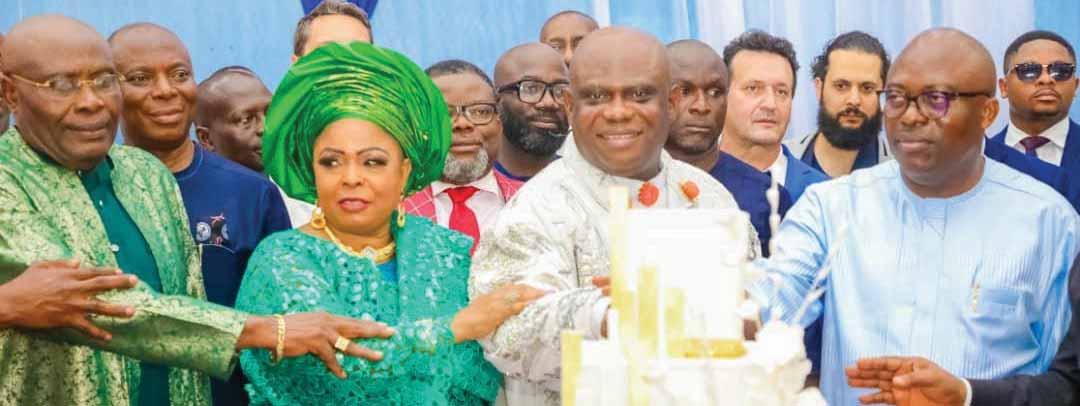
L-R: Former Senate President and Chairman, Board of Trustees (BoTs) of the Peoples Democratic Party (PDP), Senator Adolphus Wabara; former First Lady, Mrs Patience Jonathan; General Overseer, Omega Power Ministries (OPM), Apostle Chibuzor Gift Chinyere; and Governor Siminalayi Fubara cutting the cake during the Thanksgiving Service to celebrate the Apostle's 51st birthday and 18th Anniversary of the founding of the church at its headquarters in Mbodo, Aluu, Rivers State, yesterday
Wale Tinubu says feat achieved in spite of operational issues in N’Delta Declares firm now focused on ramping up production with NAOC's acquisition Oil company to join global energy contemporaries at African Energy Week
Emmanuel Addeh in Abuja
Leading energy solutions company
Oando Plc at the weekend reported a profit after tax of N60.3 billion in its audited financials for the full year ended 2023, a substantial improvement from its 2022 financial performance.
The company's financial performance for the year ended December 31, 2023, was marked by other noteworthy developments as the company recorded a 43 per cent increase in revenue, reaching N2.9 trillion compared to N1.9 trillion in 2022.
In a statement, Oando said it achieved a remarkable turnaround, transitioning from a loss in 2022 to a profit-after-tax of N60.3 billion in 2023, a 961 per cent increase in its operating profits despite the 24 per cent reduction in the realised oil price ($83.15/bbl in 2023 compared to $109.55/bbl in 2022).
“This reduction was consistent in gas prices as the value fell from $14.74/ bbl in 2022 to $12.19/bbl in 2023; and in Natural Gas Liquids (NGL) prices with a similar decline from $6.23/boe in 2022 to $4.87/boe in 2023.
“Additionally, the company reduced its upstream borrowings by 23 per cent, from $635.6 million in 2022 to $488.9 million in 2023,” the oil firm added.
Commenting on the results, Wale Tinubu, Group Chief Executive, Oando Plc, said: "Despite the operational hurdles occasioned by security breaches and persistent pipeline vandalism in the Niger Delta, we achieved a profit after tax of N60 billion, bolstered by the strength of our global trading alliances, a 12 per cent increase in total production, and favourable exchange gains from our foreign currency denominated assets.
"Our recently completed transformational acquisition of
NAOC Ltd is a pivotal moment for the company due to the expansive reserves and vast infrastructure network.
“Following our 2014 acquisition of ConocoPhillips's Nigerian unit, this transaction was the next phase in our long-term strategy to increase our reserves and production capacity by leveraging the exit of the International Oil Companies (IOCs) whilst securing operational control of the assets.
“Our immediate focus now shifts to a seamless integration and execution of initiatives towards achieving a marked increase in production. We are confident about the opportunities this platform provides and are committed to delivering sustainable value to all stakeholders."
Despite persistent operational security challenges in the Niger Delta, Oando said it reached 23,258 bpd in 2023 compared to 20,703 bpd in 2022.
Expanding on the performance of its production portfolio, Oando said it averaged a daily production of 6,211 bbls/day, making a 26 per cent increase to its 4,939 bbls/day in 2022.
Consistent with the improved performance, it averaged 16,808 boe/day of natural gas, 10 per cent better than 15,292 boe/day of natural gas in 2022.
The company cited improved operations and repairs of shut-in wells offset by persistent sabotage activities as a reason for the production increase.
According to Reuters, the decline in global oil prices in 2023 was because of a tumultuous year of trading marked by geopolitical turmoil and concerns about the oil output levels of major global producers.
As stated in the press release published on the company's website, the operating profits increase was "driven by the increase in revenue
Michael Olugbode in Abuja
The United Kingdom’s Foreign Secretary, David Lammy, has arrived in Nigeria in his first trip to the African continent and is expected to announce the start of a five-month consultation process, to ensure African voices ‘inform and sit at the very heart’ of the UK’s new approach to the continent.
This was disclosed in a statement signed yesterday by the Senior Press & Public Affairs Officer/Comms Lead, Prosperity and Economic Development, Ndidiamaka Eze.
and a significant increase in other operating income, largely due to foreign exchange gains on the group's US dollar-denominated monetary assets.
This, it said, was despite an increase in administrative expenses primarily from exchange losses from the impact of the Naira devaluation on our foreign currency-denominated liabilities.
“With this solid financial performance, Oando is well-positioned to capitalise on the opportunities presented by the energy sector, building on the momentum generated by its $783 million acquisition of NAOC in August 2024.
“The acquisition doubled the
company's total reserves to 1.0 billion barrels of boe from 505.6 million boe based on 2022 reserves estimates. With its new status as an operator, Oando is better positioned to control its destiny by deploying its acquired assets to deliver even better returns to its shareholders,” Oando said. Also, with the release of its 2023 audited financial statements, the company stressed that it is bringing its reporting obligations to date, and it is expected that its recent shares trading suspension will be lifted, allowing investors to benefit.
“This, in tandem with its record share performance on the Nigerian
Segun Awofadeji in Gombe
“Accommodating the diverse needs and ambitions of 54 countries, the consultation will guarantee the UK's relationships across Africa are based on mutual respect and partnership,” the statement said.
Lammy said on his visit, that Africa has huge growth potential, with the continent on track to make up 25 per cent of the world’s population by 2050.
“Our new approach will deliver respectful partnerships that listen rather than tell, deliver long-term growth rather than short term solutions and
“Committing to a fresh approach to Africa that works productively from Morocco to Madagascar, the Foreign Secretary will announce the start of a five-month consultation process, to ensure African voices inform and sit at the very heart of the UK’s new approach to the continent.
build a freer, safer, more prosperous continent.
“ I want to hear what our African partners need and foster relationships so that the UK and our friends and partners in Africa can grow together.
“Growth is the core mission of this government and will underpin our relationships in Nigeria and beyond. This will mean more jobs, more prosperity and more opportunities for Brits and Africans alike,” the top UK official added.
The Foreign Secretary is expected to advocate for further collaboration on mutual growth via the UK-Nigeria Enhanced Trade and Investment Partnership, signed earlier this year.
This partnership is the key vehicle
for driving trade and market access between the UK and Nigeria and plays a vital role in the UK’s growth mission.
He will also advocate for further trade and climate collaboration between Nigeria and the UK in high level meetings with President Bola Tinubu, Foreign Affairs Minister, Yusuf Tuggar and Lagos State, Governor, Babajide Sanwo-Olu.
The statement added: “Building on President Tinubu’s macro-economic reforms, the Foreign Secretary will announce a diverse technical assistance package to the Nigerian Ministry of Finance, offering British expertise from the Bank of England and others to help continue to modernise and diversify the Nigerian economy.
Deji Elumoye in Abuja
President Bola Tinubu will today swear in the seven new ministers cleared last week by the senate, marking a significant development in his administration's restructuring efforts.
The Gombe State Government has entered into a Memorandum of Understanding (MoU) with China18th Engineering, an international engineering firm renowned for largescale infrastructure and energy projects, for the provision of a 100-megawatt solar energy plant, as part of measures to enhance energy self-sufficiency in the state.
This agreement was signed weekend following recent engagements between Governor Muhammadu Inuwa Yahaya and top executives of China Railway 18th Bureau Group in China.
Commissioner of Energy and Mineral Resources, Sanusi Ahmad Pindiga, signed on behalf of Gombe State Government, while the Group Managing Director, Wan Lian Yu, signed for his company.
Governor Inuwa Yahaya, speaking at the signing event at the Government House, Gombe, spoke on the importance of local power generation in driving economic growth and addressing frequent power outages.
He added that the agreement will soon advance to a formal contract phase, setting the groundwork for project implementation. “With the execution of this project, we anticipate the creation of jobs, increased investments, and a reliable energy supply that will drive prosperity in Gombe and the northeast,” he stated.
The governor also referenced the recent nationwide blackout that affected Gombe and other parts of northern Nigeria, emphasizing that local power stations and alternative energy sources could mitigate such disruptions.
He stressed that his government is taking advantage of the newly enacted Electricity Act, which grants states the authority to generate, distribute, and market their own electricity, reducing dependence on the national grid.
"This partnership with China Railway 18th Bureau demonstrates our commitment to sustainable energy solutions and economic resilience, with solar energy poised to become a reliable, eco-friendly alternative for our growing energy demands".
According to Onanuga, "President Bola Tinubu will swear in the new seven ministers tomorrow Monday… The Senate cleared the ministers last week."
Special Adviser to the President on Information and Strategy, Bayo Onanuga, made this known on his verified X handle. The new ministers will take their oaths of office at the Council Chambers of the State House, Abuja Nominated a fortnight ago, they are Dr. Nentawe Yilwatda as Minister of Humanitarian Affairs and Poverty Reduction; Muhammadu Maigari Dingyadi as Minister of Labour and Employment, and Bianca Odinaka Odumegwu-Ojukwu as Minister of State for Foreign Affairs. Others are Dr. Jumoke Oduwole as Minister of Industry, Trade and Investment (Trade and Investment); Idi Mukhtar Maiha as Minister of Livestock Development; Yusuf Abdullahi Ata as Minister of State for Housing and Urban Development, and Dr. Suwaiba Said Ahmad as Minister of State for Education.
“I am happy that today, we are hosting the management of the China 18th Bureau here in Gombe as a direct follow-up to our initial discussions in China. The MoU signifies the beginning of a transformative project that will boost electricity supply and bring prosperity to our people,” said Inuwa Yahaya.
The General Manager, International Engineering Company China Railway 18th Bureau Group, Mr. Xue Dewen, expressed confidence in his company’s ability to deliver a high-quality solar energy system, praising the Governor Inuwa's vision for energy independence and economic development in the state.

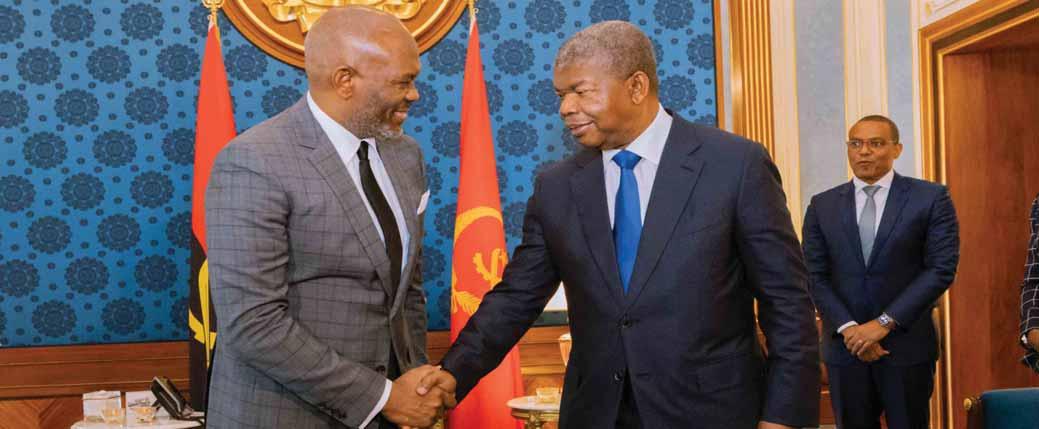
Emmanuel Addeh in Abuja
The management of the Dangote Refinery yesterday maintained that any imported petrol cheaper than the one produced by the 650,000 barrels per day facility, located in Lagos, is substandard.
In a statement signed by the company’s Group Chief Branding and Communications Officer, Anthony Chiejina, the Dangote
refinery stated that it was also possible that the oil marketers who are pushing the narrative that products refined outside Nigeria are cheaper, are conniving with international traders to turn the country into a dumping ground for low quality products. Specifically, the company stated that it had lately refrained from engaging in media fights, but was now constrained to respond to
Michael Olugbode in Abuja
Operatives of the National Drug Law Enforcement Agency (NDLEA) have thwarted at the Murtala Muhammed International Airport, Lagos, the bid by members of an international drug syndicate that operates between Brazil, Ethiopia and Nigeria to smuggle into Lagos a total of 845 wraps of cocaine weighing 18.72 kilogrammes.
The drug consignments, said to be worth about N4.5 billion in street value, were recovered from two lavatories of an Ethiopian Airlines aircraft during the post landing cleaning of the cabin of flight ET900 from Addis Ababa to Lagos last Tuesday.
A statement on Sunday by the spokesman of the anti-narcotics agency, Femi Babafemi, said the illicit drug consignments were wrapped in nine polythene bags and hidden in the waste collectors in the two rear lavatories of the aircraft, from where they were recovered after the MMIA Strategic Command of NDLEA was alerted about the strange objects, revealing that no fewer than 30 suspects have so far been grilled in connection with the seizure.
Babafemi said investigations revealed that the seized drugs were conveyed from Brazil to Ethiopia through ingestion and excreted in Addis Ababa by a set of couriers while some other traffickers picked them up and attempted to smuggle
them into Nigeria through the Lagos airport before their attempt was frustrated with the cooperation of the airline’s authorities and other airport stakeholders.
The spokesman said attempts by some drug trafficking syndicates to export 2.93 kilogrammes cocaine, cannabis and tramadol 225mg concealed in body cream containers, and pieces of art work to Australia, United Arab Emirate and United Kingdom through some courier companies in Lagos were also blocked by NDLEA officers of the Directorate of Operations and General Investigation (DOGI) last Monday.
He said at the Apapa seaport in Lagos, NDLEA operatives last Tuesday intercepted 754,000 pills of tapentadol and acetaminophen 225mg worth N525 million in a targeted and watch-listed container from India during a joint examination with men of Customs Service and other security agencies.
In the Federal Capital Territory, FCT, a suspect Mujahid Hamisu, 24, was arrested with 147,000 pills of tramadol concealed in black nylon bags containing plumbing materials along Kwali-Gwagwalada-Abuja expressway on his way from Onitsha, Anambra State on Saturday while another suspect Seun Abimbola, 47, was nabbed by NDLEA operatives same day with 512 grammes of methamphetamine during a raid operation at Giri junction area of the FCT.
what it described as the recent ‘misinformation’ being circulated by the Independent Petroleum Marketers Association of Nigeria (IPMAN), the Petroleum Products Retail Outlet Owners Association of Nigeria (PETROAN), among others.
Some oil marketers had at the weekend revealed that the price of petrol, produced by the Dangote Petroleum Refinery was between N1,015 and N1,028/litre depending on the quantity being purchased, higher than imported fuel.
The oil dealers therefore vowed to import the commodity and sell it below the Dangote refinery price as well as the price being sold by the Nigerian National Petroleum Company Limited (NNPC).
But the statement said that both organisations claimed that they can import petrol at lower prices than what is being sold by the
Dangote Refinery, explaining that it benchmarked its prices against international prices and believes its prices are competitive relative to the price of imports.
“If anyone claims they can land Premium Motor Spirit (PMS) at a price cheaper than what we are selling, then they are importing substandard products and conniving with international traders to dump low quality products into the country, without concern for the health of Nigerians or the longevity of their vehicles.
“Unfortunately, the regulator, the Nigerian Midstream and Downstream Petroleum Regulatory Authority (NMDPRA) does not even have laboratory facilities which can be used to detect substandard products when imported into the country,” the Dangote refinery asserted.
Post deregulation, the Dangote
refinery said that the NNPC set the pace by selling PMS to domestic marketers at N971 per litre for sale into ships and at N990 for sale into trucks.
This, it stressed, set the benchmark for its pricing from where it has gone even lower to sell at N960 per litre for sale into ships while maintaining N990 per litre for sale into trucks.
In good faith, and in the interest of the country, it stated that it commenced sales at these prices without clarity on the exchange rate that it will use to pay for the crude purchased.
“At the same time, an international trading company has recently hired a depot facility next to the Dangote Refinery, with the objective of using it to blend substandard products that will be dumped into the market to compete with
Dangote Refinery's higher quality production.
“This is detrimental to the growth of domestic refining in Nigeria. We should point out that it is not unusual for countries to protect their domestic industries in order to provide jobs and grow the economy.
“For example, the US and Europe have had to impose high tariffs on Electronic Vehicles (EVs) and microchips in order to protect their domestic industries.
“While we continue with our determination to provide of affordable, good quality, domestically refined petroleum product in Nigeria, we call on the public to disregard the deliberate disinformation being circulated by agents of people who prefer for us to continue to export jobs and import poverty,” the statement added.
Nume Ekeghe
Access Holdings Plc has reported remarkable third-quarter results, with gross revenue soaring by 114.5 year-on-year to N3.4 trillion, and its holdings assets growing to N41.1 trillion for the period ending September 30, 2024.
The group said the growth trajectory underlined its resilience and strong performance across diverse business segments, reinforcing its commitment to sustainable returns for shareholders.
In a statement made available to THISDAY, the holding’s gross revenue increase, from N1.6 trillion in 2023 to N3.4 trillion in 2024, had been largely fuelled by interest income, which constituted 70 per cent of total revenue, reaching N2.4 trillion.
Non-interest income also marked an 87.2 per cent increase, contributing N1.0 trillion, as transaction volumes climbed across digital and alternative banking channels.
Despite inflationary pressures, Access Holdings maintained a stable cost-to-income ratio at 60.8 per cent, while profit before tax surged by 89.6 per cent to N558.2 billion.
Profit after tax increased by 82.8 per cent, reaching N457.7 billion, which translated to an annualised return on equity of 22.2 per cent and earnings per share of N12.40.
Furthermore, Access Holdings reported significant gains in Q3 2024, driven by strong performance across its banking and non-banking subsidiaries, including Access ARM Pensions, Hydrogen Payments, and Access Insurance Brokers.
The group’s total assets surged to N41.1 trillion, up by 54.0 per cent year-to-date, while shareholders’ equity grew by 51.0 per cent to N3.3 trillion.
Customer deposits saw an impressive rise of 45.4 per cent, increasing from N15.3 trillion in December 2023 to N22.3 trillion by Q3 2024, while gross loans and
advances grew 56.2 per cent, reaching N13.9 trillion.
It stated, “Access Bank continued its strong performance, with both interest and non-interest income contributing significantly to gross earnings. Subsidiaries in the UK and across Africa performed particularly well, delivering 54.8 per cent of the Banking Group’s profit before tax, an increase of 185.8 per cent year-on-year.
“The Group remains committed to expanding its footprint by offering tailored banking solutions in each region, enhancing customer experience, and advancing crossborder banking capabilities.”
Access Holdings added, “The non-banking subsidiaries of Access Holdings also delivered consistent growth. Access ARM Pensions, following a merger with ARM Pensions, now oversees N3.1 trillion in assets under management.
“Hydrogen Payments processed N27.5 trillion in transactions, growing its operating profit by 516 per cent
year-on-year to N5.7 billion. Access Insurance Brokers, still in its first year of operations, posted a gross written premium of N8.3 billion and a profit before tax of N641 million. New entrant, Oxygen X Finance, the group’s digital lending subsidiary, reported N2.1 billion in operating income and a profit before tax of N412 million.” It stated further, “Looking ahead, Access Holdings remains focused on enhancing profitability through diversified revenue streams across all markets. The group is deeply committed to advancing sustainability, embedding environmental, social, and governance principles into its operations to foster positive community impact. Through ongoing investments in employee development, Access Holdings

Kayode Tokede
The management of FBN Holdings has budgeted an estimated N103.1 billion for its corporate business and retail business lending segments of the market, following its plan to raise N150 billion from its existing shareholders.
The Holdings recently held the signing ceremony to commence the rights issue offering of 5,982,548,799 ordinary shares of 50 kobo each at N25.00 per share to its existing shareholder on the basis of one
new ordinary share for every six ordinary shares held as of October 18, 2024.
This is an estimated N150 billion FBN Holdings seeks to raise from its existing shareholders by way of rights issue.
Extracts from the offer raising prospectus of the financial institution revealed that lending to the corporate business segment gets N77.34 billion, while lending to retail business segment gets a budget of N25.78 billion.
This covers 68.95 per cent of the
N150 billion proposed rights issue the management seeks to raise from existing shareholders.
Out of the N150 billion, a total of N29.46 billion was budgeted to support international business expansion and N14.73 billion for investment in automation and digital banking.
On investment in automation and digital banking, the financial institution said: “The group is positioned to continuously ensure seamless and convenient banking experience for its customers
through significant investment in automation and digital technologies via its flagship mobile banking app, FirstMobile, and its internet banking platform, FirstOnline.
“Through FirstMobile, and the new Lit App, First Bank has effectively acquired a broad crosssection of the target demography, with a clear proposition of owning bank accounts and utilising various financial services from the comfort of their locations.
“In line with First Bank’s commitment to providing customers
The Ogun State Governor, Dapo Abiodun has announced a threepronged approach to improving the ‘ease of doing business’ in the state, driven by the mission to boost Micro, Small and Medium-scale Enterprises (MSMEs) growth.
The approach include creating access to finance; simplifying land acquisition and registration of business premises as well as improving on necessary infrastructure within the state.
It stressed that this was in line with the Afreximbank's template, during a panel discussion at a two-day SMEs development workshop and stakeholders' engagement programme organised by the bank in partnership with Woodhall Capital in Lagos.
Speaking during the panel discussion, the Special Adviser to
the Governor on Investment, Sola Arobieke highlighted ‘transformative’ impacts of reforms undertaken by the Abiodun-led government to stimulate the economy of the state.
Arobieke, who is also the Deputy Director General of the Ogun State Investment Promotion and Facilitation Agency (OgunInvest), declared that the approach of government on MSMEs had boosted the economy.
According to him, it has also helped the commerce, especially among the operators of MSMEs in the state which aligns with Afreximbank template on MSMEs growth.
She said that streamlined regulations, improved access to finance and enhanced infrastructure had empowered local entrepreneurs and driven economic growth.
The special adviser added that OgunInvest was structured to provide One-Stop Investment Services
(OSIS) and guidance on accessing tax incentives at both the federal and state levels.
Arobieke explained the state government had also introduced initiatives such as revenue harmonisation and tax reforms to further streamline operations of MSMEs, adding that with the policies of government on tax reforms, Pay-As-You-Earn (PAYE) and other taxes can now be conveniently paid online.
Highlighting OgunInvest's role in fostering a conducive business environment, the special adviser said that OgunInvest serves as a centralised hub for businesses entering the state.
She added: "Our aim is to simplify the entrepreneurial process by providing streamlined access to land, permits, and essential Government services.”
Also speaking at the forum, the Executive Vice President of Afreximbank’s Intra-African Trade and Export Development Division, Awani Kanayo, highlighted the bank’s dedication to fostering SMEs growth through more than just financing.
She acknowledged Afreximbank’s role in strengthening SMEs to produce competitive, export-grade products that meet global standards, thereby unlocking new trade opportunities and positioning local businesses for international expansion.
Founder of Woodhall Capital, Mojisola Hunponu-Wusu, highlighted that supporting SMEs in reaching their full potentials was vital for building a prosperous Africa.
The Managing Director of Export Development, Afreximbank, Oluranti Doherty, emphasised the importance of boosting SMEs’ participation in export value chains.
John
The Kaduna State Internal Revenue Service (KADIRS), has attributed its recent ranking by the National Bureau for Statistics (NBS) as the leading state in Internally Generated Revenue (IGR) in the north, to Governor Uba Sani’s financial inclusion as well as the widening of the state’s tax net.
In a statement yesterday in Kaduna, Executive Chairman of KADIRS, Jerry Adams, said the success story was due to the automation of tax administration and the provision of work tools by the governor to drive the process.
Last week, the NBS released the IGR of all the 36 states and the Federal
Capital Territory(FCT), showing that Kaduna State raked in N62.49b in 2023, emerging the highest in IGR earning in the north. Adams said it was not surprising that Kaduna state was ranked as the subnational with the highest revenue generation in 2023 by the NBS.
He said: "The credit goes to Governor Uba Sani for automating tax administration in Kaduna State and providing work tools to drive the process. "KADIRS now has a one-stop-tax portal called ‘Pay Kaduna Portal', which enables citizens to pay their taxes from anywhere, without physically coming to the tax offices.
"The automation has reduced
leakages in the system. By just clicking on the particular tax icon, a tax payer can pay withholding tax, stamp duty tax and so on".
He further pointed out that the Sani administration had widened the tax net without increasing taxes, adding that KADIRS has been expanding the tax net in a horizontal manner since July 2023 as against the vertical approach of the past which led to stagnation.
He said the overall policies of the Kaduna state government, helped significantly in improving its IGR.
‘’The policies of the Uba Sani administration have a human face and this has made businesses and
companies that left Kaduna state in the past, to return. Coupled with that, he has initiated a lot of business-friendly policies which are having positive impact on revenue generation,’’ he said.
According to Adams: "The rural transformation of the Kaduna state government has improved voluntary tax compliance because people can see how their money is being spent.’’
He added: ‘’Our motto is ‘Tax For Service’ and the present administration has demonstrated this by the laudable projects that it is embarking on in the areas of roads construction, building new schools and other projects,".
with the best-in-class electronic banking experience, the bank plans to upgrade the FirstMobile and FirstOnline with additional services and features while driving customer adoption of the platforms.”
The offer, however, is part of the company’s plan to recapitalise its commercial banking subsidiary, First Bank of Nigeria Limited, with a view to increasing the bank’s capacity for business development and growth.
The Chairman, FBN Holdings, Mr. Olufemi Otedola in a statement from the document urged shareholders that: “By supporting the Rights issue through accepting your rights, the company will be well positioned to achieve its strategic objectives and to deliver improved returns to all stakeholders, going forward.”
He added: “I, therefore enjoin you to carefully consider this investment opportunity and take up your rights, in full, as the company continues
to harness imminent opportunities and deliverer on its promises.” He further encouraged shareholders to support the aspirations of the company by taking up rights thereby strengthening the company and in particular the bank for growth and improved performance
According to him, this will deliver significantly enhanced Total Shareholders’ Return (TSR) in the medium term and return the bank to its rightful place in the league of financial institutions. While speaking, at the signing ceremony, the Group Managing Director, FBN Holdings, Mr. Nnamdi Okonkwo said that the rights issue gives the shareholders the opportunity to retain the relative holding in the company while providing the required capital buffers to maximise business opportunities in the economies where we operate.
Obaigbena, Osoba, Amuka to address media challenges
Emmanuel Addeh in Abuja
Vice President Kashim Shettima, Governor Douye Diri and the Minister of Budget & Economic Planning, Abubakar Bagudu will lead conversations on economy and security as the 20th edition of the All Nigeria Editors Conference (ANEC) kicks off on Wednesday in Yenagoa, Bayelsa state.
Also expected at the event are: The Minister of Information and National Orientation, Mohammed Idris; National Security Adviser (NSA), Nuhu Ribadu, and President of Nigerian Association of Chambers of Commerce, Industry, Mines and Agriculture (NACCIMA), Dele Oye.
In a statement yesterday signed by the President, Nigerian Guild of Editors (NGE), Eze Anaba and the General Secretary, Dr Iyobosa Uwugiaren, the professional body of editors/media executives said that the Chairman/ Editor-In-Chief, THISDAY/Arise Media Group, Prince Nduka Obaigbena, will chair the conference.
‘’Former Governor of Ogun State, Aremo Segun Osoba; Founder/Publisher of Vanguard Newspaper, Uncle Sam Amuka; Publisher, BusinessDay, Frank Aigbogun; Senior Vice Chairman/ Editor-In-Chief, Leadership Newspaper Group, Azu Ishiekwene and other media experts will be speaking on strategies for viable/sustainable media
financing, opportunities and challenges in Al-generated storytelling, and other emerging issues in global journalism practice’’, the NGE added.
The Guild further explained that some critical institutions - in private/ public, and Non-Governmental Organisations (NGOs) will also be making presentations at the annual conference scheduled for November 7-9. Giving a background to this year’s ANEC, which will attract over 350 editors and media executives across the country, the NGE explained that since the present government came on board on May 29, 2023, its agents had consistently argued that the federal government had been pursuing audacious reforms to reconstruct macro-economic situations it met on ground, for stability and development.
‘’Their argument is that the petrol fiscal subsidy was moderately jettisoned initially, and foreign exchange reforms had led to the unification of the markets and a market-reflective exchange rate.
‘’They have also argued that in order to assuage the inflationary effects of these reforms on the most vulnerable, the government had been implementing temporary cash transfers to reach over 15 million households, with efforts also being made to tighten monetary policy and refocus the Central Bank of Nigeria (CBN) on its core mandate of maintaining price stability.
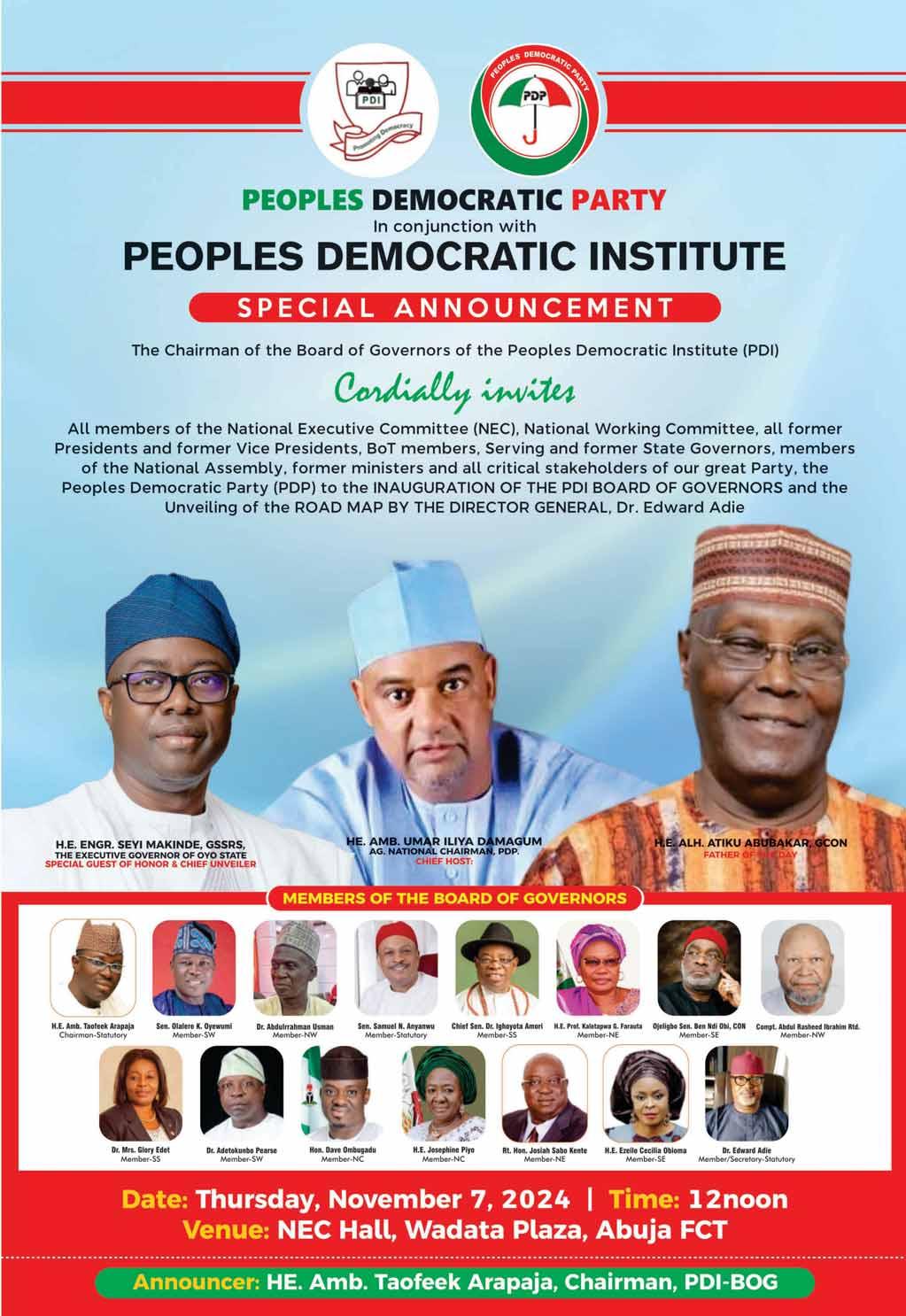
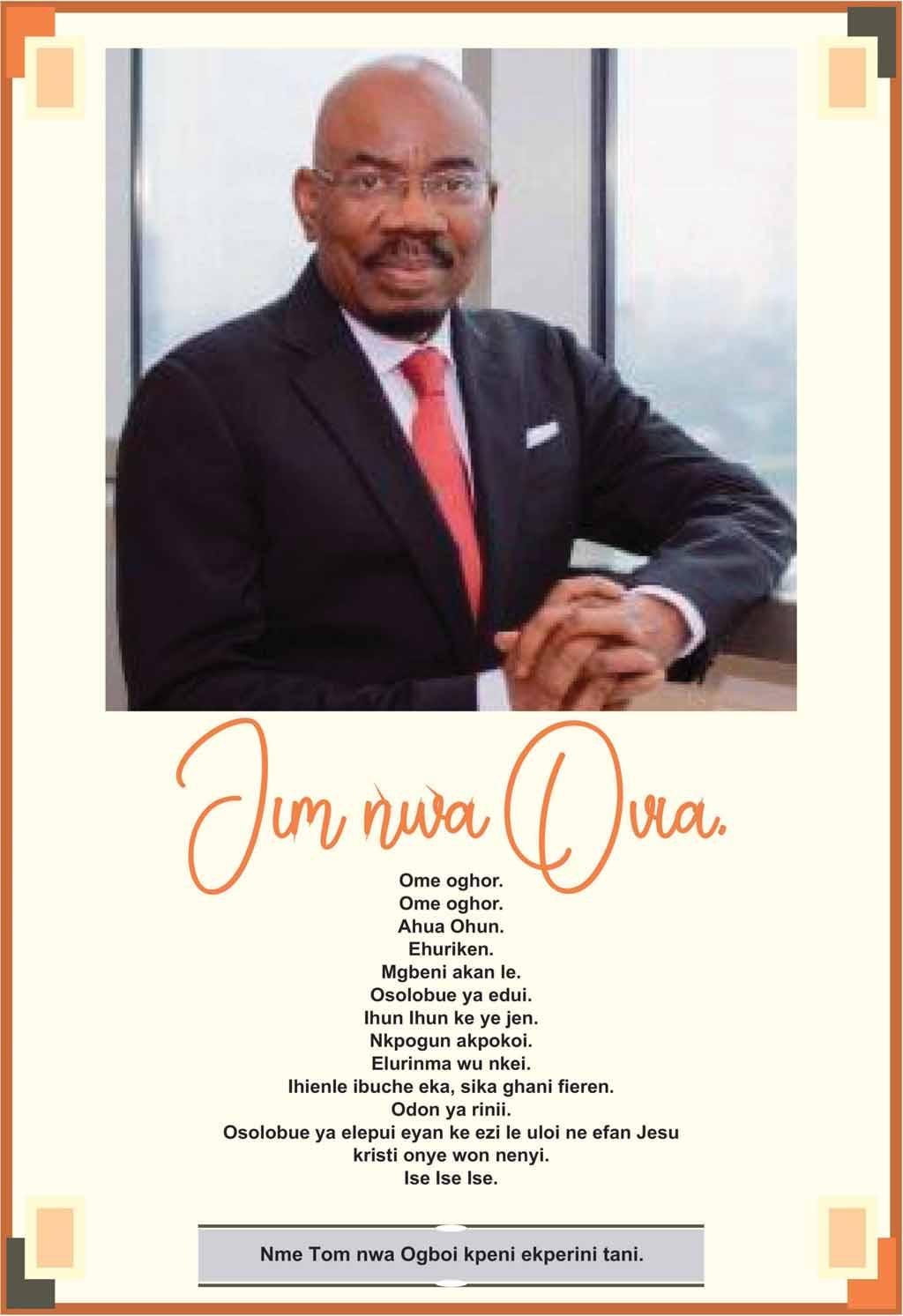
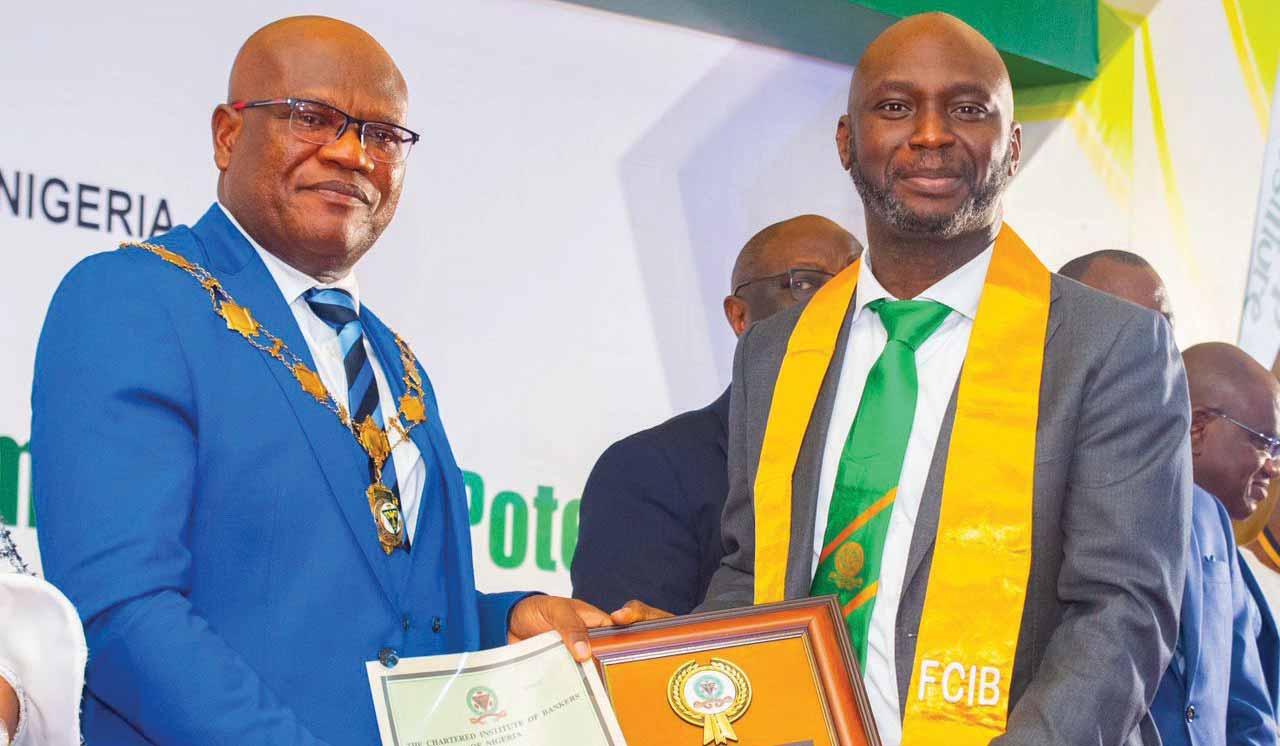
Managing Director, Bank of Industry, BOI, Dr. Olasupo Olusi, (R) receiving from the President/Chairman of Council of CIBN, Prof. Deji Pius Olanrewaju, the prestigious award of ‘Distinguished Honorary Fellow’, conferred on him by the Chartered Institute of Bankers of Nigeria at the 2024 Fellowship Investiture ceremony ...recently
Says we’ve addressed diverse needs of Edo people, impacted on education, health, agric, infrastructure, others
Governor Godwin Obaseki of Edo State on Sunday, led members of the State’s Executive Council (EXCO), religious and political leaders and other stakeholders to a thanksgiving service to mark the end of his 8-year stint as governor of Edo State, acknowledging God and the people of the state for
the government’s successes and achievements over the last eight years.
He was joined by his wife, Betsy; Deputy Governor, Engr. Marvelous Omobayo Godwins; Speaker of the Edo State House of Assembly, Rt. Hon. Blessing Agbebaku; Chief Judge of Edo State, Justice Daniel Iyobosa
The federal government has flagged off the distribution of relief materials to victims of flood that ravaged the Ondo State in 2024.
Recently, property worth millions of naira were destroyed by flood which hit some parts of Ondo town, Akure and Ilaje.
In Ondo town, some of the areas affected include Itanla, Oka, Odo Ijomu, Bethlehem, Akure-Ondo expressway among others.
However, Minister of Regional Development, Abubakar Momoh, while flagging off the distribution of the items in Akure the state capital at the weekend, said the gesture was to assist the victims and bring succour to them.
Specifically, Momoh said the items include which worth millions of naira trucks of rice, motorcycles, sewing machines, grinding machines, cooking stoves, smokeless stoves, spaghettis, beans amongst others and will be for all affected victims in the Niger Delta region.
His words: "President Bola Ahmed Tinubu, asked me to visit Akure today and to convey his message to you people. There was a time there was flood in this part of Nigeria, that is the entire Niger Delta region, and recently too there was another flood.
“He said, Minister, you have to go there and take care of your people. Make sure that you send enough palliative because when there's flood, there's always a problem.
"People are displaced. They don't have means of livelihood. So, he gave approval and we are doing the symbolic presentation here today and this will take place in the entire states of the Niger Delta region. We are handing over to the stakeholders of these very states, which of course include primarily the governor, the traditional rulers, and the members from the ministry.
Speaking on the policies of the present administration which has continued to inflict pains on average Nigerians, the Minister justified that, "the decisions being taken are painful, but that is the only way by which we can address the problems that have been facing this country. If you want Nigeria to thrive, you must take far-reaching decisions that will initially inflict pains on the people of our country.”
He added that, "In a very short time, you will begin to see the effects of the decision or the policy of the federal government that have been taken so far. So, I want us to continue to pray for our president because the president means very well for Nigeria. If Nigeria is not better during this administration, it means we are cursed.
Okungbowa; Chief of Staff to the Governor, Dr. Osaigbovo Iyoha; candidate of the Peoples’ Democratic Party (PDP) in the 2024 governorship election, Dr. Asue Ighodalo and his wife, Ifeyinwa, among others.
The thanksgiving was done alongside the dedication of the newly renovated Interdenominational Government House Chapel, in Benin City, the Edo State capital.
Others present include the Chairman of Christian Association of Nigeria (CAN), Edo State Chapter, Apostle Irekpono Omoike; Catholic Archbishop of Benin, Archbishop Augustine Akubueze; Chairman of the Pentecostal Fellowship of Nigeria (PFN), Edo State chapter, Pastor Mrs. Margaret Agbonifo; General Overseer of the Habitation Church of God and former Chairman of NLC, Edo State chapter, Rev. Olu Aderibigbe and the General Overseer of Covenant
Church of God, Felix Omibude, amongst others.
Obaseki who thanked the people of the state for the love and support to his administration over the last eight years, said his government has addressed the diverse needs of Edo people of the state and worked tirelessly to leave an enduring impact across multiple sectors including education, healthcare, economy, infrastructure, and agriculture, among others.
He said: “As we gather here to dedicate the Government House Chapel to God and celebrate the thanksgiving service to mark the close of my term, I am deeply reminded of the many ways in which God has held us together.
“The ways which He has upheld our vision and helped us to accomplish the monumental task which he set before us. Over the past 8 years, my administration has been able to address
diverse needs and improve lives and service delivery to Edo people.
“We have worked tirelessly to leave an enduring impact across multiple sectors, including education, healthcare, infrastructure, agriculture, and economic empowerment and many others.”
Obaseki continued: “Today is a day of thanksgiving as God has been our source of strength and has guided us through every challenge and given us victory in all our adversity. The renovation of this Chapel draws from my deep inspiration and inspiration of many other.
“I stand before you today not only as governor but conscious of the divine responsibility we all share to honour God in every area of our lives and our governance.
“This chapel stands as a physical symbol of that commitment; a commitment to build a State on a
foundation of faith, unity and reverence for God Almighty. It's my hope and prayers that this Chapel will serve as a place where future leaders will seek the face of God and solace just as we have done.”
Acknowledging the church and religious leaders in the state for their support over the last eight years, the governor stated, “I want to acknowledge our clergy for their steadfastness, moral support, and spiritual encouragement which helped us during our darkness hours. As we dedicate this chapel to God today, may it serve as a reminder of his faithfulness and love and unending support for Edo State.
“Let this chapel be a place where leaders are grounded, where prayers for our people are lifted and where the vision for a brighter and prosperous future for every Edo citizen is birthed and nurtured.”
Chinedu Eze
United Nigeria Airlines and Cronos Aviation have signed a Memorandum of Understanding (MOU) to construct aircraft Maintenance Repair Overhaul (MRO) facility in Nigeria; just as the domestic operator has added more aircraft to its fleet to boost capacity.
The partnership which included code-share clauses will enhance the training of Nigerians in aircraft maintenance, transfer of technology and extension of Nigerian carrier’s operations to the Central and West African destinations.
Cronos Aviation has aircraft maintenance and airline commercial services arms and the company has been operating in the West Coast of Africa, Central Africa with
maintenance facilities at Oliver Tambo International Airport, Johannesburg, South Africa and extended aviation services in Europe and Canada.
He said the maintenance facility will fill the gap that exists in West and Central Africa, where there is no major MRO that serves the aircraft market in the sub-regions and the facility will service most of the aircraft that operate across the countries in these areas, specializing in Boeing 737 Classics, B737NGs, B777, Airbus, Embraer and other aircraft types.
Speaking during the signing of the MOU in Lagos at the weekend, the chairman of United Nigeria Airline, Professor Obiora Okonkwo, said the choice of Cronos Aviation is driven by its track record and capacity.
"Cronos International has an already
existing MRO in South Africa at the O.R Tambo International Airport. They have been operating for more than 13 years with the certification to maintain Embraer aircraft and Boeing 737.
So, we are signing an MRO in partnership with Cronos to set up such services here in Nigeria. As you may know, we do not have MRO capability to do base services in Nigeria," Okonkwo said.
He explained that besides aviation fuel, another component that erodes revenue of airlines is aircraft maintenance, adding that the United Airlines' new partnership with Cronos will help to reduce operating costs, help the nation save its scarce foreign exchange and open up a new door for other aspects of strong participation in aviation.
Professor Okonkwo disclosed that there is a high number of aircraft on ground (AOG) resulting from high foreign exchange and the inability of the airlines to source foreign exchange to ferry the aircraft already grounded in Nigeria to maintenance facilities overseas and also to bring back their aircraft ferried overseas for maintenance due to high exchange rate, remarking that the demand on forex will reduce when these aircraft are maintained locally.
"So, this has a multi-dimensional benefits. Not only to the United Nigeria Airline, but also to the entire industry, the nation in the area of saving foreign exchange, manpower development, technology and knowhow transfer. So, this is on the area of the MRO.
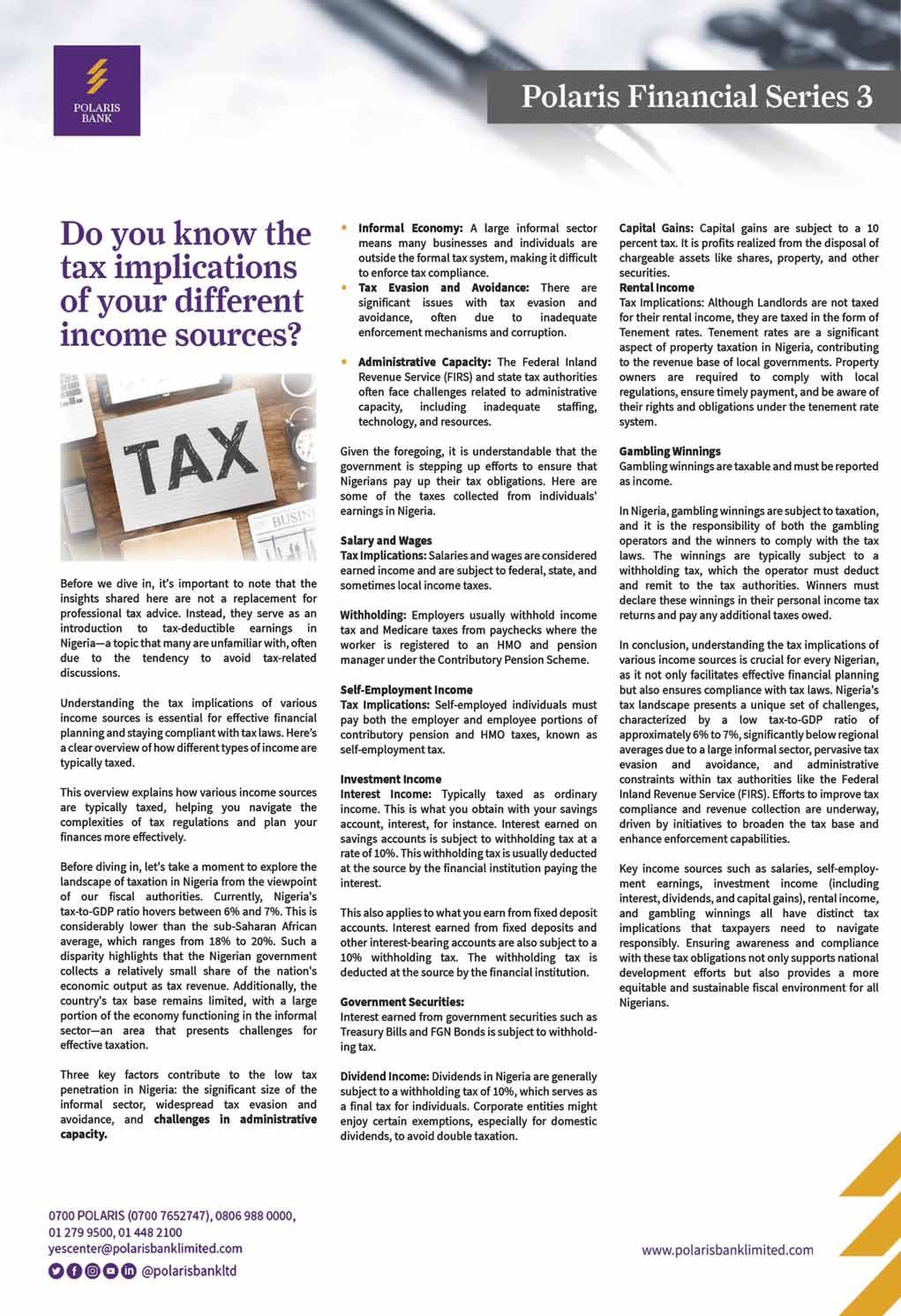
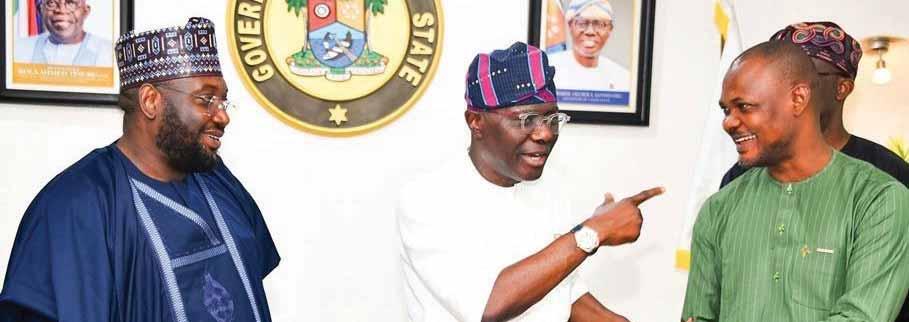
The Executive Secretary of the Nigeria Extractive Industries Transparency Initiative (NEITI), Dr Ogbonnaya Orji, at the weekend argued that the growth of Nigeria’s extractive industries depend on active civil society participation and engagement.
Orji made the statement while delivering a keynote speech at the opening of the three-day Civil Society Roundtable on the EITI Framework in Abuja.
He spoke on the theme: “NEITI’s Mission and the Pivotal Role of Civil Society Organisations
(CSOs) in Promoting Transparency, Accountability, and Good Governance within Nigeria’s Extractive Sectors.”
For the NEITI process to succeed, Orji stated that civil society must be fully equipped to play its institutional and industry-specific roles, adding that the roundtable was organised to achieve this purpose.
“CSOs are the watchdogs of democracy and governance. In the context of NEITI, they serve as intermediaries between the public and the government, ensuring that transparency and accountability lead to tangible policy changes and public welfare improvements,” he stated.
Orji noted that CSOs help analyse NEITI reports by identifying gaps in governance, revenue management, and environmental protection.
He added: “CSOs’ issue-based advocacy helps push for legislative reforms that address these challenges while ensuring that the data in NEITI’s reports are used constructively to promote public debate and policy reform.”
Orji also said that CSOs provide an avenue where government, the private sector, and community groups can raise concerns about environmental and social issues impacting affected communities, ensuring these concerns
are considered in national resource management policies.
He reminded participants at the roundtable that NEITI’s work is guided by both the global Extractive Industries Transparency Initiative (EITI) Standards and the NEITI Act of 2007.
These frameworks, he emphasised, underline the crucial role of civil society in ensuring that Nigeria’s wealth from natural resources is managed for the benefit of all citizens.
Referring to the 2022/2023 Oil and Gas Industry Report, Orji urged CSOs to focus their advocacy and enlightenment activities on the
Chinedu Eze
The Minister of Aviation and Aerospace Development, Festus Keyamo, has assured that there would be improved capacity in domestic air travel, as more airlines join schedule flight service and expand their fleet.
The minister made this known at the weekend in Lagos when Xejet, which hitherto operated high class charter service, started schedule commercial operations, which it flagged off on Saturday.
The minister said Xejet’s entry into nation’s airspace would bring a new level of service, comfort, and safety for Nigerians.
“It also underscores the
remarkable resilience of our local airline industry and the dedication to meeting the needs of passengers across the nation. Today’s flight demonstrates our continued commitment to supporting new investments and partnerships that drive the growth and sustainability of civil aviation in Nigeria,” he said.
Keyamo commended the airline for its dedication to providing quality service and for the trust it has placed in the Nigerian aviation market, noting that it indicates a vote of confidence “in our economy and in the vision we share to establish Nigeria as a regional aviation hub.”
“The Ministry of Aviation is committed to creating an enabling
environment that will support innovative and reliable airlines like XeJet, ensuring safe and efficient operations. I am confident that XeJet will be a valuable player in this journey, contributing to the quality, accessibility, and growth of air travel across our country.
“Let us continue to work together toward a brighter, more connected future for Nigerian aviation. Thank you, and congratulations once again to XeJet on this remarkable achievement,” Keyamo said.
Fielding questions from journalists at the inaugural flight, the Chief Executive Officer, XeJet, Mr Emmanuel Iza, said that it has always been in the company’s
plans to operate scheduled flights, targeting first four major cities of Lagos, Abuja, Kano and Port Harcourt, but added that beyond these four cities, the airline would gravitate to where the market is and would add more cities as it continues operations.
He said the airline had taken delivery of an Embraer E190 which was undergoing inspections, and hoped to commence operations with it on November 7, 2024
Iza said that safety, comfort and customer satisfaction are the priority of the airline, noting that as a prime airline, the size of the seat, the leg room and overall comfort matter so much for him.
Seriki Adinoyi in Jos
The Nigerian Immigration Service (NIS) has pledged its commitment to leveraging technology, international cooperation and capacity building to address the challenges of border security facing the country.
This was disclosed by the Controller General of Immigration, Kemi Nandap at the Service’s 2024 Annual Conference that ended in Jos at the weekend. Nandap said that the conference with the theme, ‘Enhancing Border Security and Migration Management in a Globalized World; Challenges and Opportunities for Nigerian’, created platform for participants to exchange
ideas, proffer solutions, and brainstorm on ways to improve border security and develop sustainable strategies to reposition the Immigration Service towards enhanced national security and economic development.
She noted that the conference assessed the current state and preparedness of the NIS in meeting its statutory mandate; identifying emerging challenges and opportunities in border governance and migration management.
The Controller General said, “The Nigerian Immigration Service is committed to leveraging technology, international Cooperation and capacity building to address the challenges
in the service. Our goal is to ensure the safety and security of Nigerians while facilitating regular migration management, promoting socio-economic inclusiveness, addressing cross-cutting issues and strengthening regional cooperation.”
In his remarks, National Security Adviser (NSA), Mallam Nuhu Rabadu, noted that Nigeria is facing numerous challenges related to border security and migration management including national security threats such as terrorism, banditry and criminal activities, and that such activities weaken government structures.
Ribadu, who was represented by Mr. Okon Julius, encouraged collaboration
efforts amongst security agencies and stakeholders which he said was essential for fostering a secured and prosperous future in the country.
On her part, the Deputy Governor of Plateau State, Mrs. Josphine Piyo, observed that Nigeria borders extend beyond land, sea, and air, warning that the service must prepare for the new frontier of the cyberspace. “We must therefore build models for tactical management of the digital border.
She acknowledged that by working together, sharing knowledge and best practices, and fostering collaboration across borders, security will be enhanced and capacity to manage migrations will be effective.
significant findings in the document.
On crude oil theft, Orji reiterated that the report revealed that in 2023, about 7.68 million barrels of crude oil were either stolen or lost, a 79 per cent drop compared to the figure recorded in 2022. He encouraged CSOs to monitor the government’s strategies to combat oil theft and advocate for stronger environmental protections.
Regarding revenue losses and underreporting, Orji said the report disclosed that outstanding collectible revenues due to the federal government amounted to over $6.071 billion and N66.4 billion.
He added that CSOs must advocate for improved revenue collection mechanisms to ensure that the full value of Nigeria’s oil resources benefits the nation.
On the fuel subsidy removal and deregulation policy in the downstream
petroleum sector, Orji urged CSOs to ensure that the government’s transition plan is transparent and that subsidy savings are channelled into development projects.
Addressing environmental impact and sustainability concerns, Orji called on CSOs to use the environmental data in the report to advocate for stronger protections and corporate accountability, particularly in the Niger Delta region.
In terms of energy transition and climate change, Orji said CSOs have a vital role in pushing for a just transition that does not disproportionately impact vulnerable communities.
Acknowledging the potential risks CSOs face in fulfilling their roles in the NEITI process, Orji proposed mitigation measures to prevent their advocacy work from being hindered.
Oluchi Chibuzor
The Yaba College of Technology (Yabatech) has urged the federal government to enforce maintenance policy and National Building Codes of 2006 which stipulates provision of building survey reports every five years for public infrastructures.
This is as they explained that periodical survey of infrastructural assets would help to determine if they are still functioning as designed and commissioned as against emergency maintenance.
This is as the school also advised that the federal government should ensure that every new infrastructural development in the country should come with a maintenance manual as a national policy, in order to avoid a culture of waste arising from delayed maintenance across public infrastructures thereby saving scarce funds.
Speaking at the 16th Inaugural lecture of the college held in Lagos recently, the Rector, Yabatech, Dr. Ibraheem Abdul, explained that the lecture highlighted the significance of infrastructure maintenance to national economy.
According to him, “It is evident, that the nation is more prone to breakdown and emergency maintenance rather than prioritising, preventive maintenance. Government
at all tiers should encourage the use of preventive maintenance more than breakdown and emergency maintenance as currently used in the country.
“Yaba College of Technology, like most tertiary institutions surveyed has no maintenance policy despite its 70-year history. Furthermore, there are no maintenance manuals for the college’s multibillion naira buildings.
“These buildings running to billions of Naira if not trillion do not have maintenance and repairs manuals, whereas a handset of N20,000.00 comes with a maintenance and repair manual.”
He added that the growing challenges of facilities maintenance management are of national dimension.
He noted that Nigerian situation is of a peculiarly different dimension, due to the developing nature and quantum of funds allocated to development annually without corresponding adequate allocation to facilities maintenance.
He said: “It is clear from the lecture that the result of this neglect culminates in the total collapse of our infrastructures, equipment and building components thereby denying the citizenry the benefits of their functionality. No doubt there are numerous public infrastructures which are underperforming.
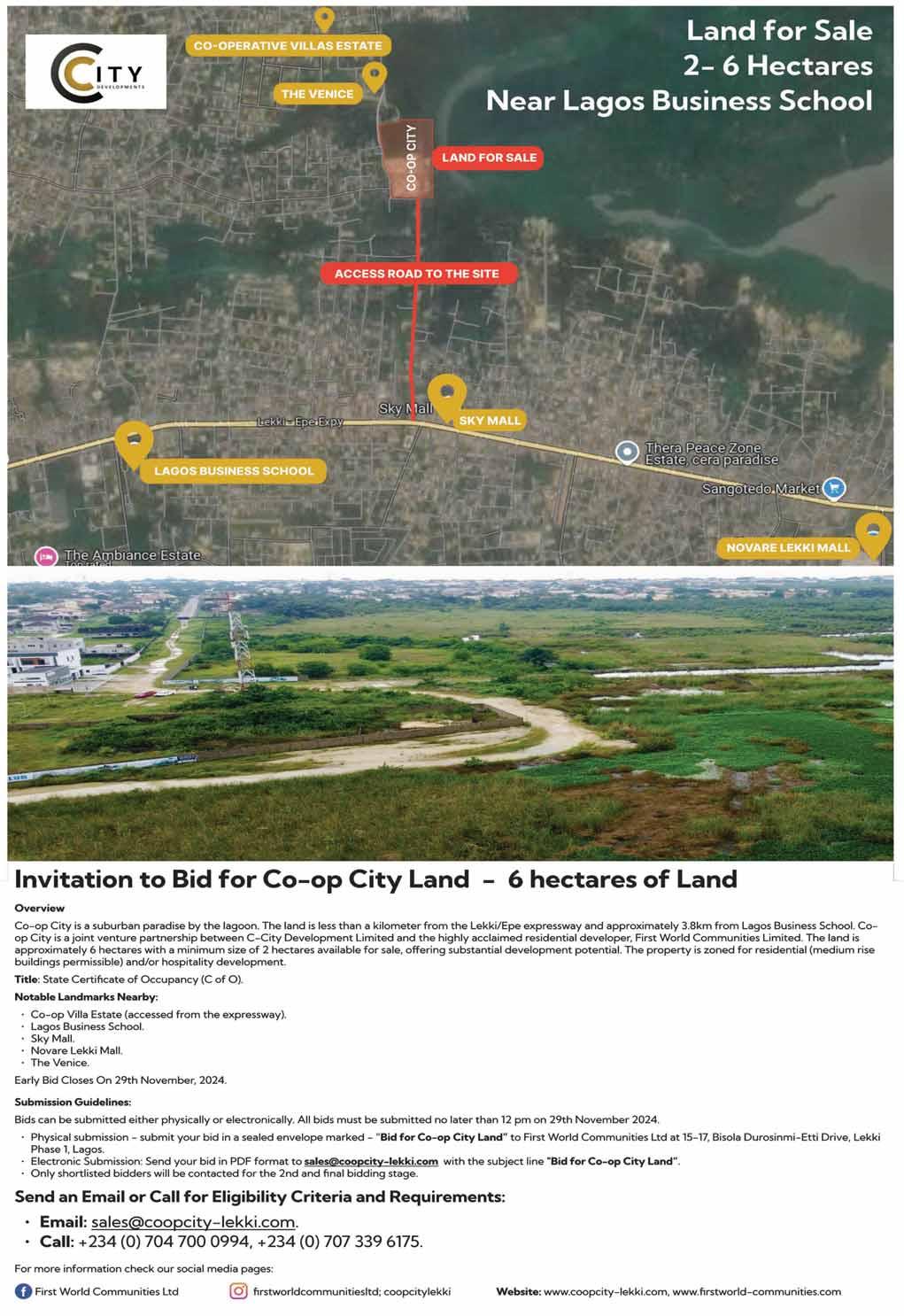
Akinloye Oyeniyi
As Nigeria grapples with economic challenges, institutions like Bank of Industry (BOI) play a critical role in providing funding for the private sector and fostering development. Development finance institutions (DFIs) are tasked with bridging these gaps through direct loans, on-lending, equity investments, and other mechanisms that encourage investment. Over the past year, Dr. Olasupo Olusi, Managing Director and Chief Executive Officer of BOI, has taken up this charge, leveraging his global expertise and network to create impact across the Nigerian economy and support a range of transformative initiatives.
Dr. Olusi’s appointment has ushered in a renewed commitment to support Nigerian businesses. With a background that spans the World Bank Group, International Finance Corporation (IFC), and Nigeria’s Ministry of Finance, Olusi brings over two decades of global experience as a seasoned economist, development finance expert and policymaker. Under his leadership, in line with President Bola Ahmed Tinubu’s renewed hope agenda, BOI has focused on six key themes: micro, small and medium enterprises (MSMEs), digital transformation, youth and skills development, gender development, infrastructure and climate and sustainability. This comprehensive approach is reshaping and deepening BOI’s impact on Nigeria’s industrial landscape.
In his first year, Dr. Olusi strategically restructured BOI to enhance impact and align with Nigeria’s development agenda. Under his leadership, in line with international best practice, the bank has streamlined the core directorates—such as Large Enterprise, MSMEs, and Public Sector & Intervention Funds—to focus on key industry segments such as the extractive sector, manufacturing sector, services sector, infrastructure, women, youth, and climate initiatives. He also introduced a Corporate Finance and Risk Management directorate to drive global fund raising and risk efficiency efforts. In addition, specialized units for Non-Interest Banking and Development Effectiveness and Research Teams were created to position the Bank for impact.
As the Group Chairman of all of BOI subsidiaries, there has been significant revitalization across the board. Dr. Olusi led a N50 billion capital injection into BOI’s subsidiary, LECON Financial Services. This funding boosts LECON’s capacity to support high-impact sectors like agroprocessing, healthcare, renewable energy, and telecommunications, enabling it to offer equipment leasing as an affordable alternative to direct purchases. Under his leadership, the BOI Investment and Trust Company Limited (BOI-ITC) successfully regained its Trusteeship Operating License from Securities and Exchange Commission (SEC) after six years suspension in 2018. This reinstatement allows BOI-ITC to re-enter the trusteeship market and strengthen its position in trusts, consultancy, and governance advisory services. BOI-ITC has facilitated loan applications for over 100 companies, securing more than N200 billion in approvals from BOI for MSMEs and large corporations. Finally, Olusi oversaw a N1 billion equity injection into BOI Microfinance Bank, enabling its transition from a unit microfinance bank to a state microfinance bank. This strategic move enhances the bank’s capacity to better serve underserved communities and expand its financial services.
At a time when accessing capital is increasingly difficult due to global financial

constraints and rising inflation, BOI has emerged as a vital player. With interest rates as high as 35 percent in commercial banks, funding is nearly out of reach for manufacturers and other key sectors. In response, Dr. Olusi spearheaded a landmark funder raiser of nearly €2 billion (N3.4 Trillion) in 2024 from global institutions – an unprecedented achievement in the Bank’s history. This contributed significantly to an increase in the bank’s total assets from N3.9Trillion in December 2023 to N6.38 trillion by end of September 2024, giving Nigerian businesses access to affordable (9-14%), longterm capital and job creation facilitation. BOI is also breaking ground with initiatives to reduce trade barriers, expand market access, and create better conditions for foreign and domestic investment.
His leadership at BOI has prioritized support for Micro, Small, and Medium Enterprises (MSMEs), forging strategic partnerships to enhance financing and growth opportunities across the sector. Notably, BOI’s collaboration with the Small and Medium Enterprises Development Agency (SMEDAN) led to a N1 billion fund offering single-digit interest loans to nano and micro enterprises, with both organizations contributing N500 million each to expand grassroots access to finance. BOI has further strengthened its partnership with the relevant trade associations. This is further evidenced by the signing of MoUs with key private sector organizations—including the National Association of Small and Medium Enterprises (NASME), Nigerian Association of Small-Scale Industrialists (NASSI), and Manufacturers Association of Nigeria (MAN), to deepen real sector financing. Additionally, under Olusi’s leadership, the Bank spearheaded as the implementation agency, the Federal Government’s N200 billion program supporting 1 million nano enterprises, 75,000 MSMEs, and 140 manufacturing companies, helping to drive job creation nationwide. In a significant push for rural development, he launched the Rural Area Program on Investment for Development
(RAPID), committing over N100 billion to stimulate rural enterprises and aiming to create 300 new enterprises in each of the 36 states of the federation as well as the FCT. Olusi has also brought BOI closer to communities by opening and commissioning new state offices in Akwa Ibom, Jigawa, and others, and signing MoUs with states like Rivers, Katsina, and Akwa Ibom to provide billions of Naira through managed or matching funds.
Driven by a commitment to even greater development impact, transparency and efficiency, BOI is transforming into a knowledge bank to better support Nigeria’s private sector. Under his leadership, BOI launched PriceSenseNG, an innovative mobile app providing real-time food price data across Nigeria, helping to boost market transparency, guide policy, and combat food insecurity. Complementing this, the bank introduced two publications, the BOI Journal of Development Finance (Technical) and the BOI Journal of Development Review (Non-Technical)—to share insights on MSME development and industrial growth.
BOI has also secured an international partnership to stimulate international bilateral economic activity. During the 2024 IMF and World Bank Group Spring meetings, BOI signed an MoU with the Export-Import Bank of the United States (EXIM) to jointly identify projects that foster economic prosperity in both Nigeria and the U.S. This partnership, which focuses on sectors such as climate, infrastructure, creative arts, technology, and support for women-owned businesses, underscores a shared commitment to fostering sustainable development. EXIM President and Chair Reta Jo Lewis emphasized that the collaboration symbolizes EXIM’s dedication to strengthening U.S-Nigeria relations, while Olusi described it as an exciting step toward driving U.S. investments in Nigeria. Recognizing the growth potential of Nigeria’s digital and creative sectors, BOI is actively investing in these fields through the Investment in Digital and Creative Enterprises
(iDICE) program. This Federal Governmentbacked initiative, co-funded by international organizations such as the African Development Bank, Agence Française de Développement, and the Islamic Development Bank, will provide training and capacity-building opportunities for Nigerian youth aged 15 to 35. By equipping 175,000 young Nigerians with ICT skills and supporting enterprise development, iDICE aims to create 800,000 jobs and foster entrepreneurship within Nigeria’s burgeoning digital economy.
In alignment with Nigeria’s sustainability agenda, BOI has also launched a climatefocused initiative under Dr. Olusi’s leadership. The bank has been nominated as a Direct Access Entity by the Nigeria Climate Change Commission (NCCC) to access financing for climate projects through the Green Climate Fund (GCF). This designation empowers BOI to spearhead climate initiatives and support sustainable development efforts in Nigeria. In addition, through a partnership with RESWAYE, BOI has committed to planting 1,000 trees across Lagos State, an effort aimed at addressing climate change and promoting environmental conservation. This initiative complements BOI’s call for local and international climate funding to support green investments in Nigeria. At the launch of BOI’s “Green Grows Initiative,” Olusi emphasized the severe impact of climate change on the Nigerian economy and the need for collective action to mitigate these risks.
BOI’s commitment to operational excellence and corporate governance continues to be recognized with the institution maintaining its A+ rating from the Association of African Development Finance Institutions (AADFI) in 2023. It also holds top-tier ratings: Aaa from Agusto& Co (domestic), Caa1 positive outlook from Moody’s Ratings(foreign), and AAA (nga) ratings from Fitch (foreign), highlighting BOI’s commitment to high standards and transparency. Amid rising capital costs and shifting economic conditions, the bank under Dr. Olusi has shown the role that DFIs can play in navigating development challenges, maximizing their capital for economic impact, and striving toward Nigeria’s $1 trillion economy target.
In the past year, BOI has garnered multiple awards reflecting Dr. Olusi’s impactful leadership. These honors include the EMEA Award for “Best Social Development Program in Africa” for the Investment in Digital and Creative Economy (iDICE), the SERAS Award for “Best Company in Financial Inclusion” and “Most Effective MDA/Parastatal in Sustainable Development,” and the Philips Consulting Ltd. Award for “Best Website and Overall Best Digital Presence for a Federal Parastatal.”
Olusi’s transformative work at BoI and within Nigeria’s banking sector has earned him multiple honors in 2024, including honorary fellowships from the Chartered Institute of Bankers of Nigeria (CIBN), the Nigerian Economic Society, the Chartered Institute of Risk Management (CRMI), and the Chartered Institute of Directors (IoD).
As BOI steps into its next phase, the institution continues to innovate in funding, products and policy to foster growth across Nigeria’s industrial sector as well as serve high-impact and underserved sectors. Under Olusi’s astute leadership, the bank is not only bridging the funding gap but is also catalyzing sustainable and inclusive industrial and entrepreneurial development, affirming its position as a pillar of Nigeria’s economic future.
•Akinloye Oyeniyi, an industry analyst, writes from Lagos

Email: chiemelie.ezeobi@thisdaylive.com, 07010510430
The pre-trial conditions of the 32 minors who were arrested over the#EndBadGovernance protest since August this year, and arraigned just last Friday in an Abuja Federal High Court, has sparked considerable criticism of the IGP Kayode Egbetokun-led Nigerian Police Force, especially in the face of the obstinacy by the police that the minors put up a show in court to attract sympathy. Also eliciting anger was the bail conditions, throwing light on the inadequacies of the judicial system. Chiemelie Ezeobi writes that the failure to adhere to the Child Rights Act was a blight on the country, spurring demands for justice reform and adherence to human rights
From August 1-10, 2024, the EndBad- Governance Protest held across the country as a movement to highlight the frustration many Nigerians feel about the widespread economic hardship, governance inadequacies, and living conditions.
The protest brought together a coalition of youth and civil society activists, demanding immediate reforms especially a reduction in government spending, a reimplementation of the petrol subsidy, policies to ensure food security, and tighter fiscal discipline.
Though largely peaceful, the protest escalated into pockets of violence in certain areas, leading to looting, vandalism, and clashes with authorities. This unrest prompted a swift government crackdown, resulting in numerous arrests, including minors.
Arrest, Prolonged Detention and Rearraignment
While the protest had come and gone, the fallout of it still echoes, especially for the 32 minors who were arrested across Kano, Plateau, Gombe, Kaduna and Abuja, on charges of public destruction of property and treason for hoisting Russian flags.
Since their arrest, these minors have faced prolonged detention in conditions that have sparked both domestic and international concern.
After nearly three months in custody, they were last Friday re-arraigned at the Federal High Court in Abuja—a scene that quickly descended into chaos and cast a renewed spotlight on Nigeria’s justice and detention systems. Six of the minors collapsed and those who could still stand on their feet, were looking so worn, malnourished and weak.
Expectedly, the courtroom quickly descended into disarray as distraught families, legal representatives, and activists rushed to aid the collapsed minors. This prompted the judge to grant bail at an enormous N10 million for each detainee, a figure widely regarded as unaffordable and illogical for the families involved.
Reactions Trail Incident
Across board , Nigerians took to different social media platforms to condemn the police and the criminal justice system. The widespread condemnation came from the Nigerian Bar Association (NBA), human rights organisations, Nigerians, and prominent leaders, all unanimously agreeing that the nation failed the minors.
The incident also spurred calls for greater transparency and accountability within Nigeria’s judicial and correctional systems. Mazi Afam Osigwe, SAN, a senior advocate of Nigeria, called the conditions of detention deplorable and criticised the justice system.
“It does not make us look good at all. It makes the credibility of our correctional facilities and our pre-trial detention condition questionable and deplorable. Every effort must be made either to release them immediately or, if the government insists on trying them, to ensure they are close to their families,” Osigwe urged.
Political figures have also weighed in on the issue, urging the government to prioritise justice and compassion in handling the cases of these young detainees.
Atiku Abubakar, a former vice-president and a prominent opposition leader, expressed his dismay over the conditions in which these minors are held, noting that Nigeria’s youth are the country’s “most valuable resource” and deserve better treatment.
“We cannot speak of progress if we trample on the rights of our own children. These young ones deserve fair treatment, compassion, and an opportunity to grow in a country that cares for its future,” Atiku stated.
Peter Obi, another opposition leader and former governor of Anambra State, also expressed concern, stating that the govern- ment’s treatment of the minors could set a dangerous precedent.
Obi, an advocate for youth rights and empowerment, urged a more humane approach, arguing that detention without due process could only exacerbate Nigeria’s social divisions.
“The youth are the backbone of our society, and their voices must be heard, not silenced.
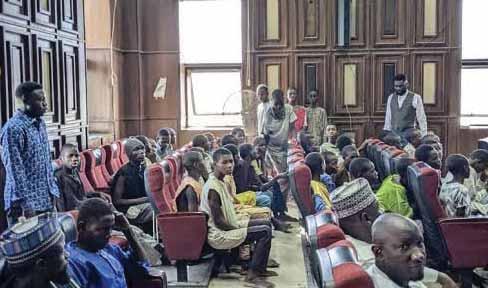

We must strive for a Nigeria where every young person feels they have a future worth fighting for—one that includes their freedom, health, and dignity,” he remarked.
Government Response and Assurances
In response to the mounting criticism, Youth Development Minister Ayodele Olawande assured the public that efforts were underway to address the minors’ conditions and improve the welfare of young people in detention nationwide. Olawande, in a statement, announced that his ministry was “engaging with the Ministry of Interior towards ascertaining the facts of the situation and improving the welfare of the young people being held.”
He assured Nigerians that the government remains committed to safeguarding the interests of the youth.
Afterwards, following the outcry over the detention of minors, the Attorney General of the Federation (AGF), Lateef Fagbemi, addressed the issue, recognising the public’s concerns and underscoring the government’s commitment to upholding the law and protecting the rights of all detainees, including minors.
In his statement, Fagbemi expressed
concern about the conditions reported in the case and reiterated that the Ministry of Justice is reviewing the situation to ensure that the treatment of these minors aligns with Nigeria’s legal standards.
Despite these assurances, the treatment of minors has raised significant questions about Nigeria’s adherence to human rights standards and its treatment of vulnerable populations within the legal system as it reflects a broader systemic issue, where young detainees are often held in substandard conditions for extended periods without adequate oversight.
Contrary Position of the Police
In contrast, the police attempted to defend the arrests as a necessary measure to maintain order and enforce the law. Force Public Relations Officer, ACP Olumuyiwa Adejobi, first clarified that “Only those below the ages of seven are not liable under the law. None of the children in court are less than seven, the youngest is 13.”
Under Nigerian law, he said individuals who have reached the age of criminal responsibility are answerable for their actions, regardless of their age. He further cautioned Nigerians against making conclusions before the completion of dueOnprocess. the state of the minors, he claimed that medical care was immediately provided to those who collapsed and insisted that the police were maintaining a “compassionate” approach. “
This position was in contrast to the statement signed for the Inspector General of Police, Kayode Egbetokun, who said the minors had pulled the stunt to elicit public sympathy.
"An unexpected incident in court saw six of the suspects suddenly rush out and faint, drawing media attention in a deliberate and scripted manner to draw negative attention," he said.
about Detention of Minors
What Does the Child Rights
Under Nigerian law, the detention and treatment of minors are governed by the Child Rights Act (CRA) 2003. This legislation, modelled after the United Nations Convention on the Rights of the Child, outlines specific protections and rights for minors to ensure their humane and appropriate treatment within the justice system.
The youth are the backbone of our society, and their voices must be heard, not silenced. We must strive for a Nigeria where every young person feels they have a future worth fighting for—one that includes their freedom, health, and dignity...Justice must be served, but it must also be compassionate....
While the CRA has been adopted federally, some states have yet to fully implement it, which sometimes leads to discrepancies in the treatment of minors across Nigeria.
Contrary to claims by Adejobi, amongst other things, the Child Rights Act includes several key provisions that relate directly to the detention of minors and they include the "Right to Fair Treatment", which stipulates that every child in Nigeria has the right to fair treatment within the justice system. This includes the right to a fair hearing and the assurance that they will be treated with dignity and respect, an assurance they did not get given the state of the minors in court.
Another provision was the "Detention as a Last Resort", which stipulates that the detention of children should only be used as a last resort and, if unavoidable, should be for the shortest period possible. The Act encourages alternatives to detention, such as counseling, probation, or other community-based measures. Another stipulation is the "Separate Facili- ties" when detention is unavoidable. The CRA requires that children be held in facilities separate from adult detainees to protect them from potential abuse and harmful influences. This separation aims to ensure a safer, age-appropriate environment focused on rehabilitation rather than punishment.
In the "Right to Health and Basic Needs", detained children are entitled to adequate food, medical care, and educational opportunities while in custody as the CRA mandates that these minors’ basic needs be met in line with their rights, ensuring their physical and psychological well-being.
Most importantly, "Rehabilitation and Reformation Focus" emphasises that any deten- tion should focus on the child’s rehabilitation and reintegration into society. Correctional or juvenile facilities must provide counseling, education, and support to address the root causes of any offenses and aid the child’s development and reformation.
In the light of all these principles, the recent case of the detention of minors over the #EndBadGovernance protests, have highlighted potential lapses in the adherence to these guidelines, sparking public debate and criticism.
While acknowledging that the CRA mandates a humane and rehabilitative approach to handling minors in conflict with the law, the attorney general however assured that his office is working to investigate any potential violations.
“The law is clear about the rights and welfare of minors, and any reported lapses are being taken seriously,” Fagbemi stated, adding that he had directed relevant agencies to conduct a full review of the circumstances surrounding the detention.
Fagbemi also confirmed that the Ministry of Justice would be collaborating with the Ministry of Youth Development and the Ministry of Interior to assess and improve the conditions of juvenile detainees across Nigeria.
He underscored the government’s commitment to transparency and accountability in the justice process, particularly regarding minors. “Justice must be served, but it must also be compassionate,” Fagbemi remarked, promising to ensure that all parties’ rights are respected.
The case of these minors detained over the #EndBadGovernance protest has become emblematic of the broader challenges facing Nigeria’s justice and detention systems. As public figures and rights organisations continue to press for reform, there is hope that the government will take meaningful action to address these grievances and create a more humane and accountable judicial process.
The coming weeks will be pivotal as the government seeks to balance justice with compassion, striving to respect the rights of its youngest citizens while addressing the broader issues raised by the protests.
For now, the families of those detained wait anxiously, hoping for a swift and fair resolution that ensures both accountability and compassion for the minors caught in the protest’s aftermath.
At the 79th United Nations General Assembly in New York, the Civil Society Legislative Advocacy Centre (CISLAC) and Transparency International (TI) Nigeria presented their latest Shadow Report on Nigeria’s progress toward the Sustainable Development Goals (SDG) 16. Chiemelie Ezeobi writes that the report offered an in-depth critique of Nigeria’s governance and security landscape, identifying severe structural weaknesses that undermine the country’s ability to promote peace, justice, and accountable institutions, while offering bold reforms needed to overcome them
The Sustainable Development Goals (SDG) 16 Nigeria Shadow Report by the Civil Society Legislative Advocacy Centre (CISLAC) and Transparency International (TI) Nigeria, titled “Achieving Sustainable Peace and Justice in Nigeria: A Call for Transparency, Accountability, and Reforms,” offered an in-depth critique of the persistent corruption, insecurity, and a weakened rule of law derailing Nigeria’s prospects for development.
Surge in Insecurity: The Rise of Organised Crime and Public Distrust
In recent years, Nigeria has seen an alarming rise in organised crime and mass kidnappings.
According to CISLAC’s report, over 4,400 people were kidnapped in 227 incidents in 2023 alone, with violence and abductions spreading from northern states to previously unaffected regions.
Despite increased government spending on defense and security—an allocation that now represents a significant portion of the national budget—the report highlights systemic corruption within security agencies as a major barrier to effective crime prevention.
“Corruption within our security agencies is crippling the fight against organised crime,” said CISLAC/TI Executive Director, Auwal Musa Rafsanjani during the presentation of the report, the seventh of the Shadow Report, at the sidelines of the recently held 79th United Nations General Assembly (UNGA) in New York.
In many instances, funds allocated for national security are misappropriated, while issues like ghost workers and lack of accountability continue to plague the system.
The report argues that mismanagement within security agencies has weakened the public’s trust in their ability to protect citizens, with many people questioning the efficacy of the government’s current security strategies.
Economic Hardship: A Crisis Exacerbated by
According to Rafsanjani, the Nigerian economy has reached a critical juncture, according to the report, with the removal of fuel subsidies in 2024 triggering a cost-of-living crisis that has disproportionately impacted ordinary Nigerians.
Inflation reached a historic high of 28 per cent in June 2024, leading to increased poverty, as millions struggle with the sharp rise in food and fuel prices.
He noted that while the government insists these austerity measures are necessary for economic stabilisation, the timing and execution of these reforms have had severe repercussions on the most vulnerable populations.
The shadow report critiques government spending that seems at odds with the call for austerity. For instance, the government’s recent expenditure on a new presidential jet worth 150 billion Naira and a 21 billion Naira residence for the Vice President has sparked public outrage.
Many Nigerians, already facing economic hardship, view these expenses as emblematic of a government disconnected from their plight.
Rafsanjani criticised the apparent “double standards,” stating, “The government cannot expect citizens to endure austerity measures while public funds are spent lavishly on nonessential projects.
One of the most contentious issues highlighted in the report is the government’s response to civil dissent, particularly during the #EndBadGovernance protests in August 2024.
The report documents severe human rights violations, including the killing of 21 protesters, the arrest of over 1,000 individuals, and the detention or harassment of journalists covering the protests.
The report also condemned these actions, arguing that they violate SDG 16’s core principles,
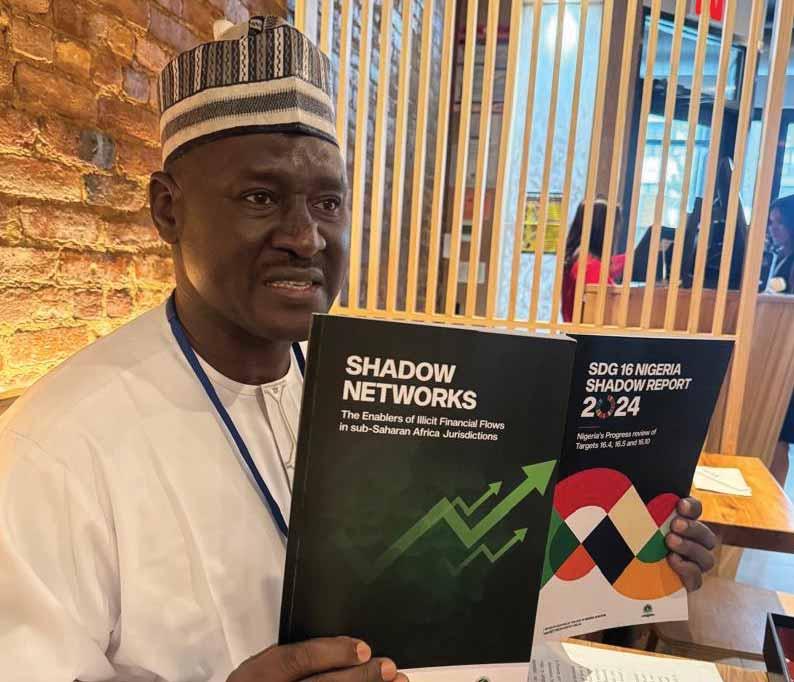
which emphasise the protection of civil liberties and public access to information.
The report asserts that the suppression of dissent not only silences critical voices but also undermines public trust in governance. Rafsanjani voiced concerns over these actions, stating, “We cannot build a just and fair society while simultaneously oppressing those calling for accountability.”
The report calls for comprehensive human rights reforms, including establishing legal protections for journalists, activists, and whistleblowers who seek to expose corruption or injustice within Nigeria.
At the core of Nigeria’s struggle, CISLAC identifies corruption as the primary obstacle to achieving SDG 16.
The report highlights how corruption permeates various sectors—from law enforcement and security agencies to fiscal management and public administration.
In a particularly scathing section, the report described how entrenched corrup-
tion within Nigeria’s institutions hinders efficient public service delivery, fosters inequality, and fuels organised crime by creating a culture of impunity. The report recommends establishing independent anti-corruption bodies to oversee government expenditures and enhance accountability within security agencies.
It went on to call for a transparent budget reporting process, regular audits, and the creation of a centralised crime database to prevent financial misappropriation within the defence sector. This is just as Rafsanjani warned, “Without addressing systemic corruption, achieving the SDGs will remain an illusion”.
Essentially, the report laid out several key recommendations to address Nigeria’s deeprooted challenges, starting with community-based policing.
By involving local communities in crime prevention efforts, it argued that Nigeria can tackle organised crime at the grassroots level as Community-based policing strategies would not only address local concerns but also alleviate some of the security burden on federal agen-
Our nation’s challenges are immense but surmountable. With transparency, accountability, and reform, Nigeria can still achieve the SDGs and build a society where justice and equity prevail
cies, fostering a more collaborative approach to public safety.
Additionally, the report emphasises the need for transparent governance practices, recommending that the government publish timely financial reports, such as in-year and mid-year budget reviews.
It suggested establishing an independent oversight body to monitor these budgetary processes, preventing fiscal mismanagement and enhancing public trust in government. The report asserts that Nigeria’s journey toward achieving SDG 16 depends heavily on these reforms.
The 2024 shadow report by CISLAC and Transparency International delivers a powerful message: Nigeria’s path to peace, justice, and strong institutions is both possible and essential for the nation’s future.
However, this journey will require far-reaching reforms, stronger anti-corruption mechanisms, and a renewed commitment to human rights. Rafsanjani’s closing remarks reflect this vision, stating, “Our nation’s challenges are immense but surmountable. With transparency, accountability, and reform, Nigeria can still achieve the SDGs and build a society where justice and equity prevail.”
As Nigeria grapples with these pressing issues, the SDG 16 Shadow Report serves as a reminder that sustainable development and peace are inextricably linked with transparency and accountability.
08097710984 (WhatsApp
NIGERIA SECURES N2.8BN FROM GOOGLE TO ACCELERATE AI DEVELOPMENT
Nigeria has secured a groundbreaking N2.8 billion grant from Google aimed at advancing artificial intelligence (AI) talent and innovation. This funding will bolster initiatives that train the youth, support startups, and enhance job opportunities across the nation.
The Minister of Communications, Innovation, and Digital Economy, Mr. Bosun Tijani, during a press conference recently, said, “This support from Google underscores our commitment to positioning Nigeria as a leader in AI innovation. By leveraging Google’s expertise, we’re equipping Nigerians with essential skills to thrive in the global digital economy.”
This grant is part of Google’s broader commitment of $5.8 million to promote digital skills across sub-Saharan Africa. This announcement follows Nigeria’s recent launch of a N100 million AI fund, also in partnership with Google, aimed at nurturing local AI initiatives.
The initiative will concentrate on sectors such as healthcare, agriculture, education, and governance. Tijani emphasised the importance of local AI startups in addressing unique challenges and driving sustainable growth.
“Our role is to set the agenda, but initiatives like Google’s are what will truly build the economy we envision,” he stated.
According to Matt Brittin, President of Google EMEA, this funding will contribute to the ongoing ‘3 Million Technical Talents’ (3MTT) programme, which aims to enhance AI skills for 20,000 Nigerians. Launched on October 13, the four-year programme seeks to strengthen Nigeria’s technical talent pipeline and position it as a net exporter of digital expertise.
“We’re providing N2.8 billion to the Data Scientists Network Foundation in support of the Minister’s vision for AI growth in Nigeria. This funding will advance AI skills and opportunities across the country,” Brittin explained.
With this significant investment, Nigeria is poised to foster a new generation of tech-savvy individuals, creating a ripple effect that could enhance the country’s economic resilience. The government’s collaboration with Google marks a pivotal moment in the nation’s journey towards becoming a powerhouse in AI innovation.
12 ENTREPRENEURS JOIN ENDEAVOR PROGRAM TO BOOST INNOVATION, JOBS IN NIGERIA
Endeavor Nigeria has announced the selection of 12 high-impact entrepreneurs from nine startups for its 2024 Scale Up by Endeavor program.
This initiative aims to accelerate growth for Nigeria’s most promising early-stage companies by providing mentorship, community engagement, and critical resources. The selected entrepreneurs represent diverse sectors, including technology and entertainment, positioning them to drive innovation and economic growth.
The selected entrepreneurs include John Oamen and Modele Ajayi-Bembe from Cutstruct, Hugo Obi from Maliyo Games, Folayemi Agusto from Tix Africa, Frederick Akpoghene from JéGO, Samuel Eze from OurPass, Babatunde Akin-Moses from Sycamore, Seun Alley from Fez, Chimezie Emewulu and Frank Atube from Seamfix, and Emmanuel Olukanmi and Ayobami Akinnuga from Tramango.
The participants in the programme will receive tailored support, matching them with expert mentors from Endeavor’s global network. This includes guidance on growth strategies, fundraising, and company culture.
Ireayomide Oladunjoye, Managing Director of Endeavor Nigeria, stated, “We are thrilled to welcome these remarkable entrepreneurs. They are tackling complex challenges in sectors critical to Nigeria’s economic growth, and we are confident they will continue to scale their ventures and inspire future generations.”
Furthermore, the program is supported by Amazon Web Services (AWS), providing entrepreneurs access to essential cloud computing tools and technical support. This partnership ensures that the founders are equipped with innovative technology to optimise their operations and prepare for rapid expansion. With these resources, the Scale Up by Endeavor program is poised to empower Nigeria’s entrepreneurs to create jobs and foster innovation,


making a significant impact on the local and global economy.
NCC: NIGERIA’S INTERNET SUBSCRIBERS
SURGE TO 132.4M IN SEPTEMBER
Nigeria’s internet subscriber base reached 132.40 million in September 2024, marking a significant increase of 1.45 million from 130.94 million in August, according to the Nigerian Communications Commission (NCC).
This growth highlights the expanding digital landscape in Nigeria, bringing connectivity and access to vital online services for millions.
The rise in subscriptions reflects the ongoing efforts to enhance digital infrastructure and promote internet accessibility across the nation.
The NCC’s recent report shows that major telecom operators like MTN, Airtel, and Glo led in increasing their internet subscribers. MTN reported a gain of 866,406 subscribers, bringing its total to 68.39 million. Airtel followed closely, adding 593,458 subscribers to reach 44.79 million. Globacom also saw a modest increase, gaining 206,391 subscribers to reach 16.92 million. However, 9mobile experienced a setback, with its subscriber count declining by 206,364, down to 2.29 million.
Despite the growth in internet subscriptions, the overall telephony subscriber base fell from 159.2 million in August to 154.6 million in September, a decline of 4.6 million. Notably, MTN’s telephony subscribers decreased by 2 million, while Airtel gained 701,676 new subscribers. The report also revealed a decline in broadband penetration from 43.16 per cent in August to 41.56 per cent in September, indicating challenges in expanding fixed and mobile broadband services. Furthermore, data usage saw a slight drop to 850,249.09 terabytes, down 0.43 per cent from August’s 853,954.05 terabytes. As Nigeria continues to navigate its digital journey, the increase in internet subscribers offers a glimmer of hope for improved connectivity and economic opportunities.
NIGERIA’S CENTRAL BANK ENHANCES OVERSIGHT ON BANKING FOR CUSTOMER SAFETY Central Bank of Nigeria (CBN) has mandated that commercial banks obtain regulatory approval before making changes to their core banking software, a move aimed at safeguarding customer access to vital banking services.
This directive comes as a response to widespread disruptions caused by recent
This week’s tech personality is Modele Ajayi-Bembe.
She is the co-founder and Chief Operating Officer of CutStruct Technology Ltd, a Nigerian proptech company focused on streamlining construction through digital solutions. CutStruct, which launched in 2019, is dedicated to addressing inefficiencies in Nigeria’s construction industry by providing an online marketplace where buyers and vetted sellers of construction materials connect, enabling transparency and cost saving.
Under Ajayi-Bembe’s leadership, CutStruct leverages technology to improve affordability and reduce resource waste, which are significant challenges in Nigerian construction. Her career background includes roles in finance and project management, with prior experience at companies like Imperial Homes Mortgage Bank and Sponge Ltd. She brings over a decade of experience in strategic partnerships, finance, and operations, which has proven instrumental in CutStruct’s success and growth.
software upgrades implemented by some of the country’s largest banks.
The CBN was reportedly unhappy about customers’ complaints about banks “in the past couple of months.” The need for improved regulation has become increasingly pressing as technology upgrades have left millions of customers unable to access their accounts.
Since the second half of 2024, at least four banks have undergone significant changes to their core banking applications. These upgrades, intended to reduce costs and allow for better customisation, have inadvertently resulted in customer service outages. Many frustrated customers took to social media to voice their complaints, highlighting the inconvenience and challenges they face in managing their finances. While banks assure their customers that they are working diligently to resolve these issues, the CBN’s latest directive places added pressure on them to prioritise customer service.
Experts in the banking sector have criticized the CBN for its delayed response to these ongoing disruptions. Some have called for fines against banks that fail to adhere to consumer protection standards, drawing parallels to cases in other countries where significant penalties were imposed for similar failures.
The new directive aims to establish a clearer regulatory framework for future core banking changes, ensuring that customer interests remain paramount in the digital banking landscape.
Strategic carbon credit financing is emerging as a vital tool in transforming Nigeria’s climate technology landscape, creating accessible pathways for businesses and communities to embrace cleaner energy.
Advocates say this approach not only funds climate-friendly solutions but also strengthens carbon markets, ensuring greater accountability and effectiveness in reducing emissions.
“Strategic carbon credit financing is key to revolutionising climate tech
in Nigeria,” said Michael Olaitan, Co-founder of Power Now, during a panel session at the Moonshot Conference by TechCabal.
Olaitan highlighted the potential of this financial model to empower Nigerian startups and small businesses, particularly in accessing sustainable energy solutions like solar power with installment payment options.
Carbon credits, he explained, allow companies and governments to offset their emissions by investing in projects that actively reduce carbon in the atmosphere. With the global voluntary carbon market projected to reach over $50 billion by 2030, Olaitan stressed the need for robust systems to validate carbon credits, ensuring they genuinely contribute to emissions reduction.
“For climate tech to succeed in Nigeria, we need frameworks that ensure carbon credits support real change,” he added.
Power Now, a startup co-founded by Olaitan, aims to make clean energy more accessible to Nigerian small businesses through solar energy financing. He underscored the importance of public-private collaboration in expanding access to clean power and meeting national emissions targets.
“Small businesses are the drivers of our economy, and supporting their shift to clean energy will boost their growth,” he said.
Olaitan, who previously managed business partnerships at Moniepoint Inc. for five years, believes that by backing SMEs with strategic carbon financing, Nigeria can significantly contribute to global climate goals while strengthening its economy.
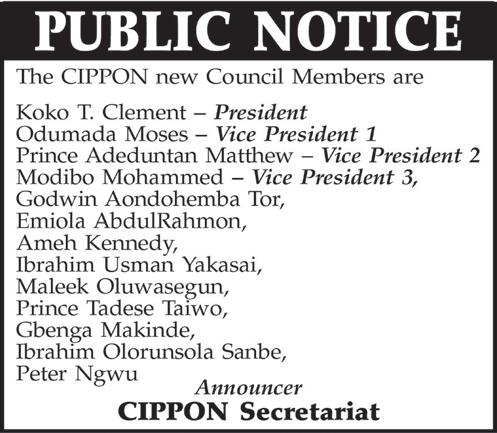

Kayode Tokede
Financial data released by the Central Bank of Nigeria (CBN), has revealed that deposit money banks and merchant banks in the country borrowed a whooping N18.04 trillion from the CBN in the month of October 2024.
The N18.09 trillion represents 31,565 per cent increase over N57.14 billion borrowed in the same period in October 2023.
As a result of liquidity challenges in the financial sector, an investigation by THISDAY revealed that banks and merchant banks in 10 months of 2024 have borrowed a staggering N104.61 trillion from CBN, up by 532.1 per cent from N16.55 trillion
borrowed in 10 months of 2023.
The reported N18.09 trillion banks and merchant banks is the second highest amount accessed from the CBN this year when compared to N21.74 trillion borrowed in March 2024.
The Nigerian financial sector is faced with several liquidity challenges that impact banks businesses, and the broader economy. The liquidity issues often stem from structural economic challenges, policy decisions, regulatory constraints, and global market influences.
Analysts have highlighted high borrowing costs and interest rates, foreign exchange shortages, credit constraints and Non-Performing Loans (NPLs), regulatory
restrictions and Cash Reserve Requirements (CRR), currency volatility and inflation rate, among others are key challenges contributing to liquidity crunch in the financial sector in Nigeria.
Banks and merchant banks borrow from the apex bank using Standing Lending Facility (SLF), a line of short-term credit available to draw on when they need to meet immediate short-term withdrawals from their customers.
When Monetary Policy Rate (MPR) was at 26.75 per cent, banks and merchant banks were borrowing from the CBN at 31.75 per cent as the asymmetric corridor around the MPR at +500/-100 basis points.
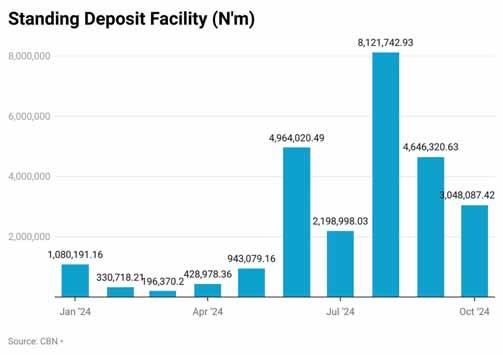
However, the Monetary Policy Committee (MPC) of the CBN towards the end of September 2024, voted to hike MPR to 27.25 per cent, making it an all-time high. So far in 2024, the MPC members have voted to increase interest rate from 18.75 per cent to 27.25 per cent amid its mandate to tackle inflation rate and unstable Naira at the foreign exchange market.
Since the MPR was increased to 27.25 per cent, banks and merchant banks now borrow at 32.25 per cent as the asymmetric corridor around the MPR at +500/-100 basis points.
The latest circular signed by the Director of the Financial Markets Department, CBN, Dr. Omolara
Duke allowed banks to borrow at a rate of 31.75 per cent when the MPR was at 26.75per cent.
Banks can access the SLF through the Scripless Securities Settlement System (S4) within the specified operating hours of 5:00 pm to 6:30 pm. Additionally, authorised dealers are permitted to access the Intraday Lending Facility (ILF) at no cost, provided it is repaid on the same day.
The CBN said: “The MPC adjusted the upper corridor of the standing facilities to 5.00 per cent from 1.00 percent around the MPR, at its 296th meeting.
“Consequently, the suspension of the Standing Lending Facility (SLF) is hereby lifted and
Authorised Dealers should send their request for SLF through the Scripless Securities Settlement System (S4) within the operating hours of 5.00pm to 6.30pm.
“To this end, Authorised Dealers are permitted to access the SLF at 31.75 per cent; Permitted to access Intraday Lending Facility (ILF) to avoid system gridlock at no cost if repaid the same day; “The five per cent penalty (as stated in the S4 business rules) is retained, for participants that do not settle their ILF, which the system will convert to SLF at 36.75 per cent;
The story continues online on www.thisdaylive.com
The Money and Credit statistics released by the Central Bank of Nigeria (CBN) has revealed that currency in circulation reached N4.31 trillion in September 2024, with a striking N4.02 trillion or 93.2 per cent held outside the banking system.
The data revealed that currency in circulation has steadily increased since January 2024, starting at N3.65 trillion and growing to N4.14 trillion by August, then peaking at N4.31 trillion in September.
Currency outside banks
followed a similar pattern, beginning at N3.28 trillion in January and reaching N4.02 trillion by September.
A detailed monthly analysis shows that the currency in circulation has been on a consistent upward trajectory since January 2024, beginning the year at N3.65 trillion. This moderate level reflected post-holiday spending trends, with slight increases observed as the months progressed. By February 2024, currency in circulation rose to N3.69 trillion, an increase of N43 billion or 1.18 per cent from January.
In March 2024, the currency in circulation reached N3.87 trillion, a month-on-month increase of N175 billion or 4.76 per cent. The trend continued upward in April, with currency in circulation hitting N3.92 trillion, representing a N53 billion or 1.39 per cent increase. The Easter period’s economic activity likely contributed to this rise.
May 2024 saw further growth as currency in circulation expanded to N3.97 trillion, up by N42 billion or 1.07 per cent from April. The most significant jump occurred in June 2024 when the currency in circulation peaked at N4.04 trillion,
marking an increase of N84 billion or 2.11 per cent from the previous month. By July 2024, currency in circulation held steady at N4.05 trillion before reaching N4.14 trillion in August and finally surging to N4.31 trillion in September.
Also, the data revealed a steady rise in currency held outside banks over 2024. Starting in January at N3.28 trillion, currency outside banks rose to N3.41 trillion in February, marking a month-on-month increase of N131.54 billion, or about 4.0 per cent. The upward trend continued in March, reaching N3.63 trillion, an additional growth of N215.79
billion or roughly 6.3 per cent. However, April saw a slight decline to N3.61 trillion, representing a drop of N22.46 billion, or around 0.6 per cent. By May, currency outside banks had increased again to N3.71 trillion, reflecting a monthly gain of N105.89 billion, or 2.9 per cent. June maintained this upward momentum, reaching N3.79 trillion, with an additional increase of N80.63 billion or approximately 2.2 per cent.
In July, currency outside banks fell to N3.67 trillion, decreasing by N125.68 billion, or 3.3 per cent. This was followed by a notable rise in August, reaching N3.87 trillion,
up N201.72 billion or 5.5 per cent from the previous month. September closed with currency outside banks hitting N4.02 trillion, reflecting a growth of N148.90 billion, or around 3.8 per centcompared to August. Over the nine-month period, currency outside banks increased from N3.28 trillion in January to N4.02 trillion in September, a total rise of N740.31 billion,

L-R: Chairman, Advisory Board, Woodhall Capital, Mr. Rasheed Olaoluwa; founder, Woodhall Capital, Mrs. Mojisola Hunponu-Wusu; Managing Director, Export Development, Afreximbank, Ms. Oluranti Doherty and the Executive Vice President, Intra-African Trade & Export Development (IAED), Afreximbank, Mrs. Kanayo Awani at the signing of $25 million loan facility between Woodhall Capital and Afreximbank to provide a support vehicle for Nigerian SMEs entering export markets in Lagos… recently
New Chairman of Nigerian Insurers Association (NIA), Mr Kunle Ahmed, has said that the association during his tenure would end the era of claims fraud and controversy over claims payment between the industry and insuring public by exploring the possibility of digital collation and tracking of claims payment to delight customers and reduce insurance fraud.
Ahmed stated this during his inaugural speech as the 26th chairman of NIA.
He said the theme of his regime as chairman of all insurance underwriting firms centered on “Digital Disruption & Social Insurance, Re-shaping of our Traditional Models,” adding that the industry during his tenure would migrate from any form of traditional ways of doing business to modern way.
He noted that insurance companies only issue a promissory note after consummating a transaction, explaining that the
test of the promise happens only when a claim was reported.
He said in insurance industry today, the issue was no longer whether insurance companies pay claims or not, insisting that as at 2023, the industry paid N536.5 billion claims, a 54 per cent growth over the claims paid in 2022.
He said in spite the feat made on claims payment, there is still some work to be done because companies would be unable to maximise the budget on publicity and media campaigns without paying attention to the ease of making a claim and the improvement of the claim process.
“We will work with market stakeholders to self-regulate and enforce market best practices amongst members from the point of onboarding a client to claims payment. We must continually look for a reason to pay a claim, rather than look for a reason not to pay a claim,” he said.
According to him, his team would collaborate with all stakeholders, especially, the
Blessing Ibunge in Port Harcourt
Aivers State government said that it has begin the digitalisation of its tax collections in order to improve revenue generation and reduce the rate of diversion of revenue.
Speaking with Journalists on the development, in Port Harcourt, the Acting Chairman of Rivers
State Internal Revenue Service (RIRS), Chibeoso Aholu, said the digitalisation process will end challenges of touting, harassment of business owners and operators in the State.
Aholu explained that the Rivers State Internal Revenue Service decided to use the USSD code to drive the informal sector tax collection, stressing that the formal sector is already organised.
According to him, “the idea is to reduce touting, diversion of revenue and all the uncivilised approach on revenue collection of taxes”.
Group Business Editor
Eromosele Abiodun
Deputy Business Editor
Chinedu Eze
Comms/e-Business Editor
Emma Okonji
Asst. Editor, Energy
Emmanuel Addeh
Asst. Editor, Money Market
Nume Ekeghe
Correspondents
KayodeTokede(CapitalMarkets)
James Emejo (Finance)
Ebere Nwoji (Insurance)
Reporter
Peter Uzoho (Energy)
Aholu explained further that the process will enable taxe payers to be in their comfort homes, business places and pay their taxes using the platform.
He noted that the world is moving digital and it is important we should not be left out.
“The last joint tax force meeting, the Commonwealth tax administration conference, the issue that was emphasised was digitalisation of taxe collections and taxe administration. We thought it is wise in Rivers State to commence getting our taxes processes of digitalisation”, he said.
On her part, State Business Manager LSSBI Adversary, technical partners to RIRS on digitalisation of tax payment, Dr Ngozi Koroye, assured that the process is safe, and urged Rivers residents to embrace the invention.
Nigerian Council of Registered Insurance Brokers (NCRIB) to ensure the provision of full underwriting information.
He noted that inadequate
information and lack of clarity at the point of onboarding the client was a precursor for a conflict at the point of claim.
He said his tenure would ensure
standardisation of pricing to the extent that each client would be charged the price that is commensurate with his risk.
He explained that detailed
information about a risk including the survey and the implementation of the survey recommendations could potentially attract a pricing that is fair to all.
Emma Okonji
The Federal Ministry of Communications, Innovation and Digital Economy (FMCIDE), has announced fresh support from Google to accelerate AI talent development across Nigeria.
The support, which is provided through a N2.8 billion grant from Google.org to Data Science Nigeria, will bolster the ministry’s ongoing AI-driven initiatives to upskill youth, as well as under and unemployed Nigerians, with a focus on Artificial Intelligence (AI) skill development and education.
The grant is part of Google.org’s broader $5.8 million commitment to support digital skills programs across Sub-Saharan Africa.
Speaking about the support, the Minister of Communications, Innovation and Digital Economy,
Dr. Bosun Tijani, emphasised the importance of the support in driving Nigeria’s digital transformation According to him, “The support from Google is a testament to our commitment to positioning Nigeria as a leader in AI innovation. By leveraging Google’s expertise and resources, we are creating opportunities to equip Nigerians with the skills they need to thrive in the global digital economy. This is a major step forward in our journey towards a more inclusive and innovative future for all Nigerians.”
The N2.8 billion Google.org grant will support Data Science Nigeria’s work with the Federal Ministry’s AI talent development programmes, including: DeepTech Ready Upskilling Programme: To provide 20,000 young Nigerians with advanced technical skills in data science and
AI, preparing them for careers in this rapidly growing field.
The training is expected to cover areas like Experience AI Programme, and Government AI Campus Programme.
While the Experience AI Programme will equip 25,000 educators with the tools and resources to teach 125,000 young people about AI, inspiring the next generation of AI innovators, the Government AI Campus Programme will upskill policymakers and public servants in AI policymaking, ensuring that Nigeria’s AI policies are developed and implemented responsibly.
Earlier this year, the ministry set the stage for AI integration in Nigeria by hosting the National Artificial Intelligence Strategy (NAIS) Workshop, followed by the release of the National AI Intelligence Strategy. The strategy aims to leverage AI to drive economic growth, improve governance, and
enhance the well-being of all Nigerians. The new support from Google.org will build on this strong foundation, further cementing Nigeria’s position as a leader in AI innovation on the continent.
In a significant step toward advancing the AI ecosystem, the ministry and Google also announced the selected beneficiaries of the AI Fund, established by the National Centre for Artificial Intelligence and Robotics (NCAIR) in collaboration with Google. The Fund will see each selected startup receive N100 million in funding, along with up to $3.5 million in Google Cloud Credits to help scale their solutions. Additionally, the startups will gain access to Google’s world-class AI tools, mentorship from Google’s AI experts, and opportunities to connect with a global network of innovators and partners.
Lekki Port continues to play a crucial role in Nigeria’s economic advancement by championing the integration of the Lagos Free Zone with the nation’s burgeoning blue economy. This was the key focus at the 17th Nigeria International Maritime Ports and Terminals Conference and Expo (NIMPORT 2024) themed, “Charting the Course for the Optimisation of Nigeria’s Blue Economy 2,” held Lagos.
Deputy Chief Operating Officer,
The U.S. government, through the U.S. Commercial Service Liaison Office to the African Development Bank (AfDB) and U.S. Commercial Service in Nigeria, in partnership with the American Business Council and the AfDB’s Nigeria Country Department, hosted the Discover AfDB workshop, focusing on the Bank’s recent investments in the digital space.
This event, held in Lagos office, convened over 70 U.S. companies operating in Nigeria. This marks the second time the Discover AfDB series is held in Lagos, as part of a broader initiative to expand private
Lekki Port, Daniel Odibe, who was one of the speakers at the conference, highlighted the pivotal role of Lekki Port in enhancing Nigeria’s blue economy. He discussed how Lekki Port’s strategic location within the Lagos Free Zone and its proximity to other economic hubs facilitates efficient operations through advanced automation and streamlined customs processes, positioning it as a premier gateway for trade in West Africa.
Odibe remarked, “Lekki Port is at the forefront of fostering economic growth by aligning the benefits of Free Zones with sustainable practices. We leverage our state-of-the-art technology and strong partnerships with agencies like the Nigerian Customs Service to ensure seamless cargo movement and swift customs clearance. This positions Lekki Port as a vital component of Nigeria’s maritime infrastructure, directly supporting the objectives
sector outreach on behalf of the U.S. Commercial Liaison Office to the AfDB. The Discover AfDB event, moderated by Elvire Kodio, U.S. Department of Commerce’s Associate Liaison to the AfDB, aims to demystify the Bank and highlight upcoming business opportunities for U.S. companies.
Aligned with the African Union’s Digital Transformation Strategy, the U.S. government, through the Digital Transformation with Africa (DTA) initiative, is dedicated to expanding digital access and creating supportive environments across Africa.
Welcoming participants to the event, U.S. Consul General in Lagos, Will Stevens, noted, “The African Development Bank plays a crucial role in facilitating digital transformation across the continent and particularly here in Nigeria.
For U.S. companies, this presents a unique opportunity to collaborate with the AfDB, bringing expertise, technology, and innovation to Nigeria’s burgeoning digital landscape.”
In his keynote address, the Bank’s Director General for the Nigeria Office, Dr. Abdul Kamara, underscored that, “In Nigeria, and
outlined at NIMPORT 2024.” Underscoring Lekki Port’s role within Nigeria’s Free Zones, he added, “Our proximity to multiple Free Trade Zones provides our users with cost-effective logistics and expedited export of goods. This synergy between Lekki Port and Nigeria’s Free Zones enables businesses to reduce transportation costs and improve inventory management, all while facilitating access to both Nigerian and international markets.”
many other African countries, the huge digital infrastructure deficit poses a major constraint to development. The African Development Bank sees digital connectivity as an enabler of growth and therefore understands the urgent need to enhance the digital infrastructure access and connectivity on the continent. This reiterated the level importance that the Bank attaches to events such as this one, which seek to close the digital infrastructure gap on the continent and welcomed the Bank’s heightened partnership with U.S. investors in this space.”
As the world rapidly evolves into a digital and interconnected marketplace, financial literacy among young people has become critical. Early exposure to financial concepts like saving, budgeting, and responsible spending is increasingly recognized as essential for personal and professional success. Studies by the Programme for International Student Assessment (PISA) reveal that one in four students across OECD countries lacks basic financial knowledge, a gap that significantly impacts lifelong financial health. Without early education, many young people struggle with debt and poor financial habits into adulthood, underscoring the need for financial independence as a cornerstone of confidence and long-term success.
In Nigeria, where the population exceeds 230 million and includes one of the world’s largest youth demographics, financial literacy is a pressing priority. Over 61 per cent of Nigerians are under the age of 24, with a median age of 18.1 years, creating a youthdriven economy ready to engage in financial and technological advancement. Teaching financial responsibility from an early age is not a luxury but a national imperative.
In this context, Wema Bank has introduced a groundbreaking solution tailored specifically to teenagers: the ALAT Xplore App, Nigeria’s first licensed banking App exclusively for ages 13 to 17. ALAT Xplore is not simply another App; it is a foundational tool designed to empower young Nigerians with the skills they need to navigate the complexities of personal finance. Beyond transactions, the App provides teens with a guided experience that includes goal-setting, expense tracking, and financial planning. The ALAT Xplore App bridges a crucial gap, creating a safe and structured environment where teens can learn practical financial skills while exercising some independence.
Wema Bank has a longstanding legacy of innovation, consistently delivering digital solutions that redefine the banking experience.
From ALAT, Africa’s first fully digital bank, to the recent launch of CoopHub, a comprehensive digital solution for cooperative societies, Wema has proven its dedication to meeting the evolving needs of Nigeria’s economy and people. The launch of the ALAT Xplore App exemplifies Wema’s commitment to customer-focused solutions, reflecting a proactive Approach to engaging each customer segment with targeted, relevant tools. For Wema Bank, innovation is more than a strategic move; it’s the embodiment of its mission to empower lives through technology.
The ALAT Xplore App was conceived after extensive research into the unique financial needs of Nigerian teens and their families.
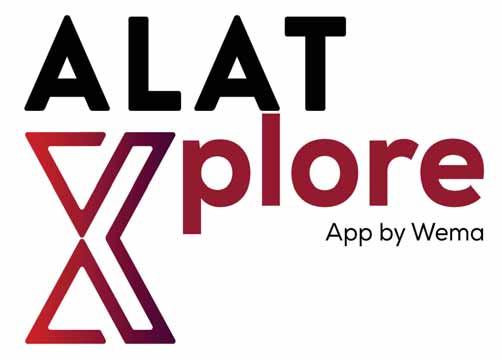
Studies and surveys indicated a strong demand for a financial platform that allows teenagers a degree of independence in managing their money while also keeping parents involved in the process. The App serves as a digital ecosystem for financial literacy, promoting responsibility and autonomy with the right balance of parental guidance. Parents retain oversight through secure controls that allow them to set transaction limits, track spending, and Approve allowances, while teenagers can enjoy financial independence within structured boundaries.
The App’s interface is tailored to Appeal to its young audience, offering tools that make learning about money enjoyable and accessible. Teenagers are introduced to budgeting tools, savings goal trackers, and real-time expense categorization, helping them make informed financial decisions from an early age. Through the ALAT Xplore App, teens can see the impact of their choices, providing a natural and intuitive Approach to cultivating good financial habits.
A central feature of the ALAT Xplore App is its parental control functionality, which offers peace of mind and oversight for parents. Recognizing the importance of balanced autonomy, Wema Bank designed the App to ensure that parents can monitor their teens’ financial journey in real time. Parents can set spending limits, control allowance transfers, and receive alerts on their child’s financial activities, creating a collaborative environment between parents and teens. This dual functionality makes the ALAT Xplore App a comprehensive tool for learning, responsibility, and trust-building.
To further engage young users, the ALAT Xplore App incorporates a reward system that incentivizes financial literacy and responsible habits. The App uses reward points, milestone achievements, and gamified learning experiences to make financial education engaging and interactive. Each positive interaction with the App—whether hitting a savings target, staying within budget, or completing a financial knowledge quiz—earns the user points that can be redeemed for rewards. This design transforms learning into an enjoyable experience, motivating teens to actively participate and stay invested in their financial growth.
The launch of the ALAT Xplore App aligns perfectly with Wema Bank’s mission to empower lives through innovation. This initiative marks a strategic move to nurture a financially literate generation, equipping teenagers with essential tools and a practical Approach to managing money. The App addresses a national need, bridging a gap in Nigeria’s financial education landscape by providing a secure, guided experience that prepares young Nigerians for a financially responsible future. It reflects Wema Bank’s understanding that financial literacy is not just about managing money but also about instilling confidence, discipline, and independence in Nigeria’s youth.
“This pioneering product serves as a reminder that banking is more than transactions; it is a powerful tool for empowerment, learning, and social change. By giving teenagers access to banking services specifically tailored to their needs, Wema Bank is making a lasting impact on Nigeria’s future.”
Bank is contributing to Nigeria’s economic resilience. Financially literate individuals make better economic decisions, benefiting the economy as a whole. Through ALAT Xplore, Wema Bank is not only cultivating responsible, financially savvy individuals but also contributing to a more stable and prosperous Nigeria.
As we look to the future, Wema Bank’s commitment to innovation promises to continue shaping the financial landscape in Nigeria. The ALAT Xplore App is a landmark achievement, a digital rite of passage offering teenagers a safe space to learn, manage, and enjoy the benefits of financial independence. This pioneering product serves as a reminder that banking is more than transactions; it is a powerful tool for empowerment, learning, and social change. By giving teenagers access to banking services specifically tailored to their needs, Wema Bank is making a lasting impact on Nigeria’s future.
“By investing in Nigeria’s youth and focusing on innovation, Wema Bank continues to lead by example, demonstrating that banking can be a catalyst for personal growth and national development.”
Security is also a priority in the ALAT Xplore App experience. Wema Bank has integrated advanced security protocols, including three-factor authentication, to ensure that users’ information and transactions remain safe. In a digital world where data security is paramount, especially for younger users, Wema’s dedication to building a secure platform underscores its reputation for reliability and trust. The ALAT Xplore App offers both teens and parents confidence in knowing their financial interactions are protected, allowing them to focus on learning and growth without concern over security issues.
Wema Bank’s legacy in the Nigerian banking sector is defined by a commitment to forward-thinking solutions. From the revolutionary ALAT App, which transformed banking by creating an accessible, fully digital platform, to CoopHub, which introduced cooperative societies to digital financial management, Wema Bank has shown time and again that it is dedicated to meeting the diverse needs of its customers. With each new product, Wema Bank has proven that innovation can be both impactful and inclusive. The ALAT Xplore App is a continuation of this legacy, representing a bold step forward in youth banking and reinforcing Wema’s dedication to addressing the financial needs of every Nigerian demographic.
In a broader sense, the ALAT Xplore App is more than a banking tool; it’s an initiative with far-reaching social and economic implications. By focusing on financial literacy for teenagers, Wema
Wema Bank’s journey has been defined by a clear vision: to empower lives through technology and innovation. The ALAT Xplore App is a manifestation of this vision, providing teenagers across Nigeria with the opportunity to become financially aware, capable, and responsible. As Nigeria’s first licensed banking App for teenagers, ALAT Xplore isn’t just breaking ground; it’s setting a new standard for youth banking in Nigeria. Through ALAT Xplore, Wema Bank is not only teaching Nigerian teenagers how to handle money; it is also laying the foundation for a generation of financially literate individuals who will shape the nation’s future. In a country where young people represent a significant portion of the population, the impact of ALAT Xplore will resonate far beyond individual users, contributing to a more educated, empowered, and economically stable Nigeria.
By investing in Nigeria’s youth and focusing on innovation, Wema Bank continues to lead by example, demonstrating that banking can be a catalyst for personal growth and national development. With the launch of the ALAT Xplore App, Wema Bank has solidified its role as a pioneer in Nigerian banking, dedicated to empowering all segments of society, especially its youngest members, and shaping a financially literate future.
Email: deji.elumoye@thisdaylive.com 08033025611
Hammed Shittu writes about a new political group taking shape in the State of Harmony, Kwara Redemption Movement, that is set to challenge the current dynamics ahead of the 2027 general elections in the state.
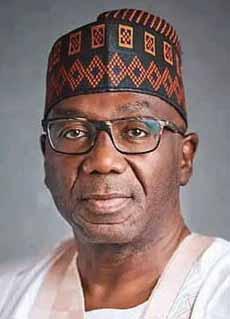
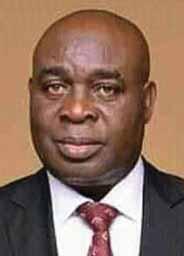
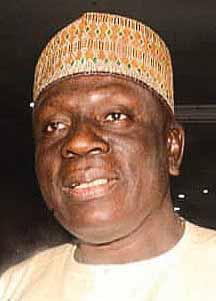
There is no gain saying the fact that the battle for the soul of Kwara state ahead of 2027 poll has begun in earnest. This is as coalition of politicians in the state have come together to see to the new paradigm shift in the day to day governance of the state with a view to returning power to the people at the grassroots.
This, they believe, would accelerate the socioeconomic development and good governance that the people deserve across the 16 local government councils of the state.
Flowing from this, the affected politicians under the auspices of Kwara Redemption Movement (KRM) recently launched their group in Ilorin, the state capital to educate and enlighten the people and the likeminds on the need to come together to discover new set of quality leaders that would emerge in order to wrestle power from those they claimed are hawks in the governance of the state.
They claimed that the past years of political leadership had withessed unprecedented bad governance based on the alleged insincerity and selfishness on the policies’ implementation on the part of those that had been in the helm of affairs.
The ugly development, according to the movement, has retarded the expected development and growth that can transform the state into well being of the rural populace.
Also, the movement perceived that the present leadership has failed to rise to the yearnings and aspirations of the populace due to the lack of manifestos that can address the multi-faceted challenges that had dotted various communities and other social needs of the people in recent past.
They also claimed that despite huge financial allocations both from the federal and internally generated revenues that had been accruing to the state, the state could not witness the much desired development saying this has perpetually manifested in the high rate of poverty, insecurity, cultism, armed robbery, among other problems.
Though, the formation of the change movement by the astute politicians in the state was not the first time in the political history of the state as a movement of such nature was formed in 2019 under the aegis of ‘O To Ge’ (enough is enough) movement which swept away the
age-long Saraki political dynasty in the political governance of the state.
The movement led to the emergence of the incumbent governor of the state, Alhaji AbdulRahman AbdulRazaq during the 2019 general elections under the ruling All Progressives Congress(APC).
As this was not enough, the movement also recorded success with the total victory of all the elected representatives of the APC for both state and national assembly seats during the election.
It should, however be noted that the present administration in the state has continued to rise to the needs of the people since assumption of office and has changed the socio well being of the populace for better.
Despite the giant strides of the administration, a coalition of politicians has formed another movement to challenge the current atmosphere come 2027 in order to address the perceived neglect in the governance of the state.
This new movement, Kwara Redemption Movement which is being led by a former chairman of Peoples Democratic Party(PDP) and now a chieftain of APC in the state, Hon.
Iyiola Oyedepo has set out a new agenda that would lead to the recruitment of new quality leaders ahead of the 2027 elections in the state.
It should be noted that Oyedepo was also in the fore front and one of the masterminds of the ‘O To Ge’ movement in 2019 that worked tirelessly to see to the end of the Saraki dynasty after 40 years of political control of the State of Harmony
Other members of the new movement include the immediate past Ambassador to Pakistan, Muhammed Abioye; former speaker of the state House of Assembly, Rt. Hon. Benjamin Ezekiel; immediate past deputy speaker of the state House of Assembly, Rt. Hon. Raphael Adetiba; immediate past Secretary of the APC, Alhaji Tajudeen Folaranmi Aro; Alhaji Lukman Mustapha, Alhaji Abdullahi Lade and Hon. Ayo Obisesan.
Also in the new movement are Saaba Lafiaji, Prof. Wale Suleiman, Alhaji Sarafa Ibrahim, Mr. Tunde Muhammed, Rev. Bunmi Olusona, Mr. Tunde Babalola and representatives from all the 16 local government councils in the state.
Speaking in Ilorin during the unveiling of the movement, leader of the group, Hon. Oyedepo said: “Another history is being made today for the coming together of coalition of politicians to work as a team to salvage our dear state, Kwara.
The ‘Enough is Enough’ movement was done in a hurry and the beneficiaries of the struggle had taken the state for granted. And this time around, we decided to start in earnest so as to know the kind of people to work with in order to assist the state to achieve the goals of her founding fathers. Kwara state is not moving forward when compared with other states created along with it in 1967 and this is the reason we have come together to fashion the way out in order to return the state to her lost glory come 2027.
“The present situation in the state called for urgent attention in order to prepare for next generation and this is another time to work together again to do it”.
Oyedepo explained that the movement is not formed to attack, insult or abuse anyone but to jawjaw on how to provide and recruit quality leadership that would move the state to greater heights.
According to him, “if you could remember vividly, this is how the O To Ge movement was conceived and started ahead of 2019 general elections in Kwara state and we thank God for its attained goal in the state.
“Though, those that didn’t know how it started are now benefiting from the struggle and they failed to acknowledge the works and desires of those that worked for the success of the ‘Enough is Enough’ in the state”.
Oyedepo stated further that, “the KRM is a socio/political/economic association with concern and coverage in Kwara State in particular and Nigeria in general.
“It is not a platform that can be used to contest an election to the local government, state or federal levels of government in Nigeria. It is formed by Kwara Patriots with concern, commitment and total fidelity to happenings in Kwara state.
“The major tool in the hands of KRM is to sensitise, mobilise and organise the people of Kwara State for acceptable political behaviours and standard that will ensure the holistic developments of Kwara State as a political unit.
“Being not a political party, even people in different political parties have free access to join us and those that are not willing to continue to be members shall have free exit too and it is brain child of those that see a dead end in the present but desires a prosperous future for Kwara”.
Oyedepo added that: “Many of you would have heard about KRM on our weekly ‘Irapada’ (Redemption) radio programmes are aired on three radio stations four days in a week. We want to inform you that since we started the radio programmes, the temperature of the politics of the state have risen positively.
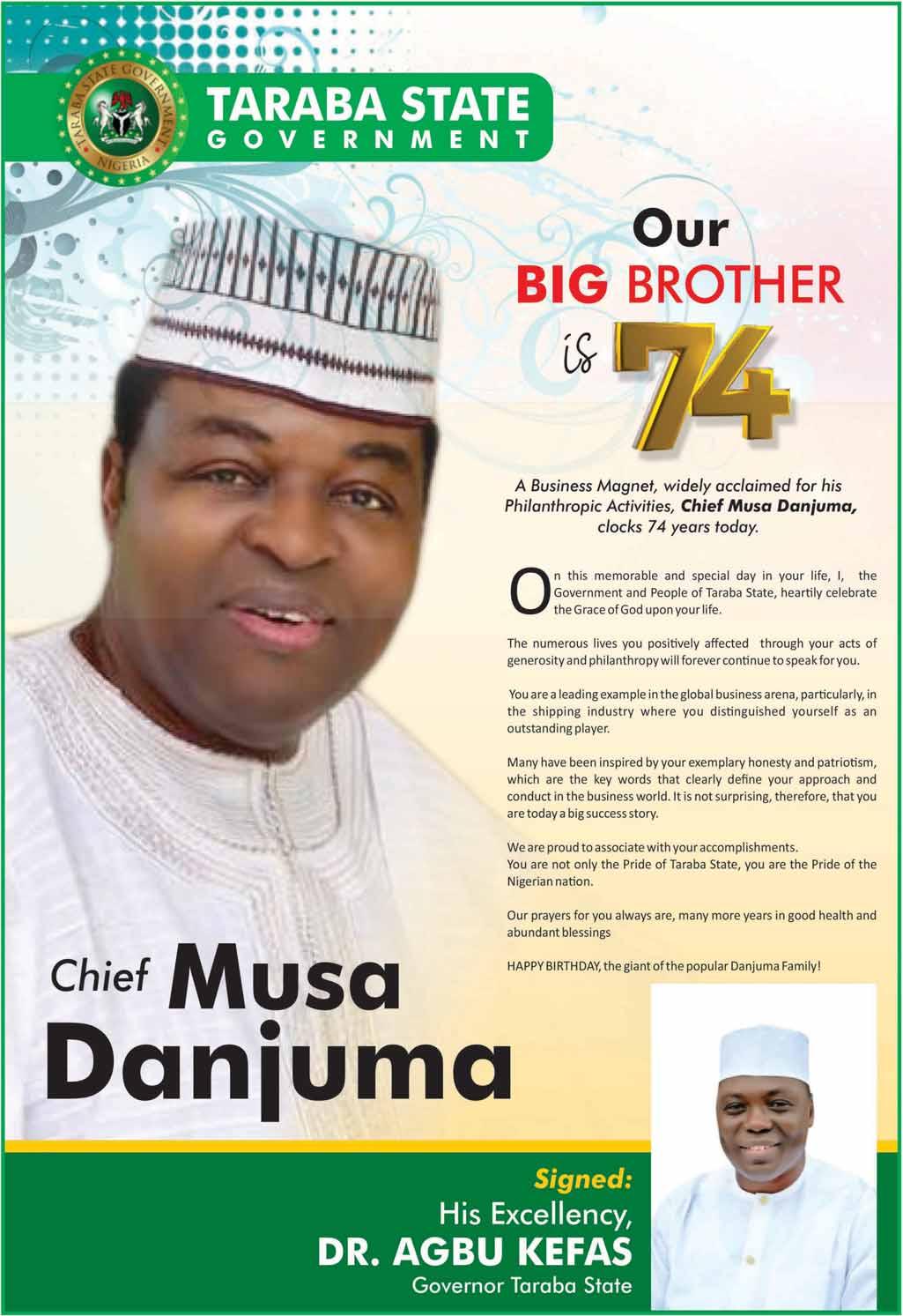
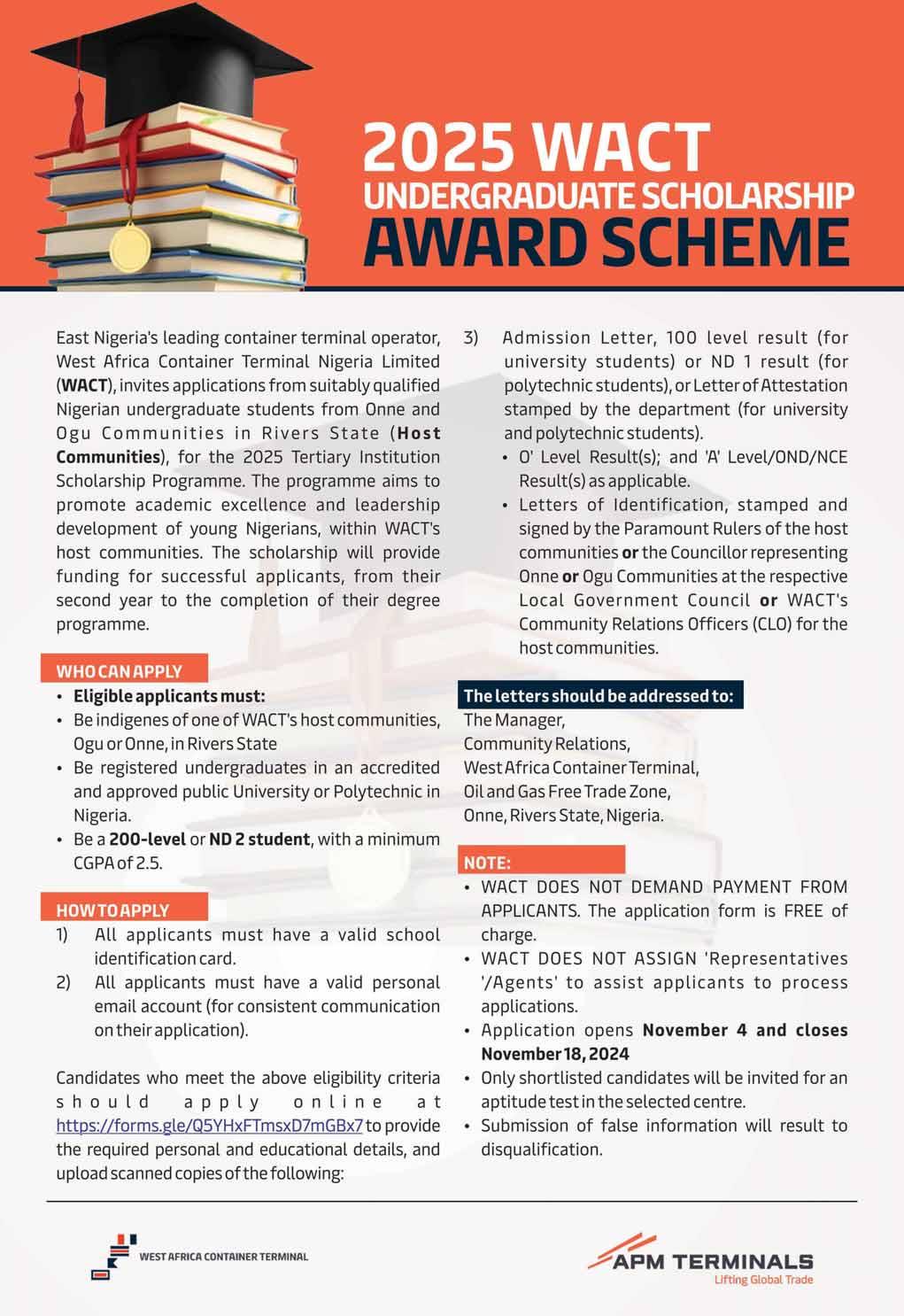


Muyi Aina reckons the President is committed to delivering basic health services, writes BASHIR
IBRAHIM HASSAN
In his quest to deliver on the promise of igniting renewed hope among Nigerians, President Bola Ahmed Tinubu is investing faith in a new generation of Nigerians with impeccable academic credentials and hands-on professional skills.
Dr. Muyi Aina, the Executive Director and Primary Health Care Development Agency boxes. A public health professional and management consultant with over 20 years of experience in healthcare and management consulting, he was a faculty member of the University of Maryland School of Medicine and was actively involved in the design and implementation of the multi-country HIV/ AIDS care and treatment programs that provided access to HIV services for 700,000 persons in Nigeria and seven other countries in Africa, as well as Guyana and Haiti.
And, then, he has been involved in health management consulting, having, in 2010, founded Solina Group, a management and engagement manager at McKinsey and Company.
However, despite his vast experience in the conduct of operations research into models of delivery of HIV treatment at scale and credit for some 27 publications with about 7,000 reads and 350 citations in the course of obtaining medical studies at the University of Ilorin and Harvard University, and a doctorate degree from Johns Hopkins University, he has been jolted by challenges in Nigeria’s public health delivery system.
“One of the things I have learnt is that supfrom when you’re inside,” he admits. “A lot work, as well as the resources, and also the
When the 50-year old health management expert from Egbe in Yagba West LGA, Kogi State surveyed the country’s health horizon, the picture he saw was of grim system unable to meet the basic requirements of people. “For example, we have over 30,000 primary healthcare centers across the country, but how many can walk in there when they fall sick?”
He has decided to confront the challenges head-on. He’s enthused by the commitment of Mr. President to improve the system, noting: “The President is truly committed to this. If I didn’t believe that, I would not be part of the government. I had a job that I was doing before this that paid me well. The President had set an agenda for the health sector. He wants to remove the label on Nigeria as the capital of maternal mortality during his time as President of Nigeria. He wants to crash maternal mortality, and reduce unnecessary stop women from dying, we have to identify the issues and what are killing them the most, and tackle them head on. The question was how and why colleagues and equally competent people who have worn the same shoes may have fallen short of the objectives they set for themselves, and what we need to do to increase the chances of succeeding in this role.“
ment, Dr. Aina says the Coordinating Minister for Health and Social Welfare, Prof. Muhammad Ali Pate, led the articulation of a blueprint for the health sector “that focuses
-
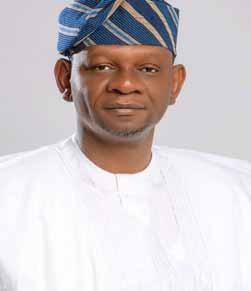
on saving lives and reducing pain for Nigerians.”
The blueprint, he says, addresses reducing maternal mortality and child mortality, decreasing stunting and malnutrition, improving the quality of our primary health care centers, increasing health insurance, strengthening local production of commodities for health care, and improving immunization coverage.
The blueprint provides a framework for working with the states and other stakeholders, including civil society, international donors and bilateral organizations, in the process removing the frictions and mutual distrust that have bedeviled provision of basic health services.
He’s pleased with the outcomes of his team’s primary health centers and started the process of resource mobilization, a number of states went ahead of us, using their own resources,” he notes. “As of today, about 239 PHCs have scratch by states themselves. The federal government has commenced the process of revitalizing another 350 PHCs. We have mobilized substantial resources, and will revitalize another 2,500 to 3,000 across the states. It was World the states.
“We gave states a framework, because, unfortunately, needs are not evenly distributed. If we say one per ward, one per tribe, one per state, but in reality, people’s needs are quite different. And if I assume the same need for you that I assume for me, chances are one of us is not well served. So, we are moving away to a more equitable distribution of things.”
On how the public can support his agency, he pleads: “We ask that Nigerians give us a little bit of time, to ask us questions, challenge us, but to understand that it takes time to repair a system that has been damaged over many years. You don't just turn it around overnight.”
The academic that he is, he has also engi-
a functional primary health center is. We have mobilized the resources. We have actually started the revitalization. Like I said, as at the last count, about 239 PHCs have been completed, and we are now working on about double that number. Contractors are there now, but I won’t count them until we are done so they are not abandoned at any stage. So, I will count when it’s done. There are about 200 additional PHCs that we’re using global fund resources to revitalize. So that journey has started.”
O. JASON OSAI urges Nigerians to be conscious of the power of the ballot, and protect it
NIGERIA’S
Numerous video clips that recently made the rounds in the Nigerian social media show politicians, technocrats and bureaucrats doling out handouts to crowds of people in a disgusting display of barefaced hypocrisy. In one of the clips, a high ranking officer in the Presidency was seen gleefully handing out exercise books to school children from a balcony. In another clip, soldiers in battle fatigue and civilian operatives of government wearing tee shirts that blazoned “Happy 64 Independence Anniversary” were handing out one loaf of bread each to a mammoth crowd of men and women who were falling over each other just to receive; that was in a Yoruba speaking city. In yet another clip, a state governor shamelessly promised to send four thousand youths of his state into what is essentially modern day slavery and the gullible crowd of young adults thundered a deafening applause.
At University of Lagos (UNILAG), professors joined in applying for N35,000 soft loan aimed at cushioning the effects of a volatile marketplace and diminishing valence; the loan was originally targeted at lower cadre officers. As it is in UNILAG, so it is across Nigeria. The capacity of the professorial salary to displace goods and services on the shelves of the marketplace has been reduced to the point professors are not able to maintain their families based on their legitimate income. In other words, professors have been driven below the poverty line; this means that the Nigerian middle class has been obliterated. Dele Farotimi, a passionate advocate for the birth of a new and better Nigeria, holds that come clergies have become complicit by distributing few cups of garri in polytene bags to their congregants and discouraging them from joining in any civil action.
The above anecdotes and the fact that the dramatis personae are agents of the institution that enacted policies that have reduced Nigerians to beggars is reminiscent of the classical strategy for governing “stupid people” as enunciated by Joseph Stalin (1878-1953). In a graphic demonstration of the fickleness of the human mind, the Soviet politician and revolutionary who led the Soviet Union from 1924 until his death in 1953, plucked off the feathers of a chicken and dropped bits of wheat towards it as he walked around his compound. The profusely hemorrhaging chicken followed Stalin everywhere, pecking on the wheat. Likening this coldhearted scenario to political engagement, Stalin said thus: “this is how easy it is to govern stupid people; they will follow you no matter how much pain you cause them as long as you throw them a little worthless treat once in a while”. This illustration speaks volubly to political leadership in Nigeria.
Today, Nigerians are profusely bleeding and perceptibly pained as a result of the effects of bad public policies. Borrowing from Stalin, Nigerians have, arguably, become “stupid people” who have consistently followed their political leaders irrespective of how much pain is inflicted on them through public policies that serve only the purpose of the elites in power. The “stupidity” of Nigerians derives from their allowing themselves to be deceived into believing that ethnicity and religion are the dividing lines in the Nigerian socioeconomic space. Another strategy for defeathering Nigerians is the indigenisation/ privatisation of government stake-holding in the economy, which was crookedly crafted carefully to benefit elites in the final analysis. In an OP-ED titled “Nigerians as Defeathered Chickens” (The Tide, November 30, 2022) the author holds that Nigerians sadly continue to follow their Stalinhearted leaders as they shamelessly shilly-shally
across political party lines completely devoid of any philosophy or ideology other than the “I, me, mine” ethos that characterise political participation in Nigeria. In the same vein late Patrice Lumumba (1925-1961) of the Democratic Republic of Congo (DRC), once lamented that the problem with Africans is that they complain about bad leadership but when the opportunity comes for election, they still elect the same group of people. The full weight of this statement is still with us in Nigeria.
Appealing to the Nigerian elite to add conscience to power, Dr Sam Adeyemi offers that the minority elite class has seized political power and cornered economic power to themselves, families and cronies to the exclusion of the teeming majority. Referring

to the book Why Nations Fail, Adeyemi holds that the other way out of the current economic stranglehold is for the masses to wrestle power from the minority elite. In this regard, another video presents a rather instructive scenario. Utilizing the “man-chicken-grain” analogy to contrast the Stalin instance, the clip shows a little boy holding a sack that contains grains being chased around an enclosed compound by more than fifty chickens. Crying and holding fast to the sack, the boy tried very hard to outrun the chickens but the chickens persisted until he dropped the sack and they settled down to a feast.
It is my fervent prayer that Nigerians should become conscious of the power of the ballot and endeavor to protect it with every fiber of their being. Again, coming to grips with the fact that the dividing lines in every society is economic, Nigerians should never allow ethnic and religious sentiments to becloud their sensibilities and decision during elections. Therefore, the millions of defeathered but enfranchised Nigerians should regrow their feathers and be resolute enough to teach the Stalins of Nigeria politics a lesson that will positively change the narrative of the Nigerian situation. In this regard, the clip of chickens resolutely chasing a boy with a sack of grains is illustrative and instructive. Nigerians should break the yoke of docility and liberate themselves from the bleeders who masquerade as leaders in the Nigerian political and social space.
It is said that the limits of oppressors are determined by the endurance of the oppressed. He that hath ears to hear let him hear.
Professor Osai writes from Port Harcourt

Editor, Editorial Page PETER ISHAKA
peter.ishaka@thisdaylive.com
The sight of emaciated boys, including children, among the 76 individuals brought before the Abuja Division of the Federal High Court for allegedly participating in the August nationwide ‘EndHunger’ protests was disturbing. Many of the defendants were arrested from
more than three months in detention. During the court proceedings, many of them appeared ill and malnourished as they were called to take their pleas. In the process, four collapsed and had to be urgently escorted from the courtroom, prompting the judge to temporarily suspend proceedings. Trending online videos paint a pathetic picture of our criminal justice administration and how the weak and vulnerable are treated in Nigeria. In granting the defendants (who are facing charges of treason, bail of N10 million each, Justice Obiora Egwuatu stipulated that each must secure two sureties in the same amount. One of the sureties must be a civil servant at grade level 15 or jurisdiction, while the other must be a parent of the defendant. These are boys who have been left to fend for themselves and have basically grown up to be a social menace. So, the conditions set for theirnite detention under dehumanising conditions, de-

to discontinue these charges and release all thosehabilitative compensation paid to them,” Daudu stated. Meanwhile, it is not lost on Nigerians that a federal lawmaker who recently assaulted a Bolt driver and threatened to make him 'disappear' was handed only a N500,000 bail.
While the education and welfare of these and other distressed children are the responsibility of their parents and respective state governments, it is the obligation of the federal government to protect the rights of all children
T H I S D AY
EDITOR SHAKA MOMODU
DEPUTY EDITOR WALE OLALEYE
MANAGING DIRECTOR ENIOLA BELLO
DEPUTY MANAGING DIRECTOR ISRAEL IWEGBU
CHAIRMAN EDITORIAL BOARD OLUSEGUN ADENIYI
EDITOR NATION’S CAPITAL IYOBOSA UWUGIAREN
THE OMBUDSMAN KAYODE KOMOLAFE

EDITOR-IN-CHIEF/CHAIRMAN NDUKA OBAIGBENA
GROUP EXECUTIVE DIRECTORS ENIOLA BELLO, KAYODE KOMOLAFE, ISRAEL IWEGBU
At their meeting last week, northern political leaders and prominent traditional rulers reviewed the leaders also reviewed the ‘End Hunger’ protest and the destruction wrought by young people. But there was no word on the issue of those arrested and brought to Abuja for detention and trial. In a previous editorial, we expressed a strong condemnation on the protest which spun out of control. In the north, many of the children who were already out in the streets took advantage of the disorder to loot. But thenor, Abdullahi Sule, was apt when he declared that many of the protesters were Almajiris. It is therefore no surprise that most of the people being tried were collected from the streets of northern cities, even when they may not have participated in the protest. That perhaps explains why many could not even understand what was being said in court.
dent, JB Daudu, SAN, has denounced the detention and arraignment of the defendants as borne out of a the Federation, according to Daudu, has no locus toin their respective states. “We rightly ought to feel
DIVISIONAL DIRECTORS SHAKA MOMODU, PETER IWEGBU, ANTHONY OGEDENGBE
DEPUTY DIVISIONAL DIRECTOR OJOGUN VICTOR DANBOYI
SNR. ASSOCIATE DIRECTOR ERIC OJEH
ASSOCIATE DIRECTOR PATRICK EIMIUHI
CONTROLLERS ABIMBOLA TAIWO, UCHENNA DIBIAGWU, NDUKA MOSERI
DIRECTOR, PRINTING PRODUCTION CHUKS ONWUDINJO TO SEND EMAIL: first name.surname@thisdaylive.com
We do not condone criminality. But what a compassionate state, which we aspire to be, owe these children are education, food and decent treatment. help them to reunite them with their parents or communities. While the education and welfare of these and other distressed children are the responsibility of their parents and respective state governments, it is the overriding obligation of the federal government to protect the rights of all Nigerian children. To allow the instruments of federal law enforcement to be used in a manner that abuses rights of children is a constitutional breach and a blatant misuse of state power.
Letters in response to specific publications in THISDAY should be brief (150-300 words) and straight to the point. Interested readers may send such letters along with their contact details to opinion@thisdaylive.com. We also welcome comments and opinions on topical local, national and international issues provided they are well-written and should also not be longer than (750- 1000 words). They should be sent to opinion@thisdaylive. com along with photograph, email address and phone numbers of the writer.
Friday, September 27, 2024, stood splendid as a memorable day for pupils in -
low-income families and give children a strong start to the new academic year. -
“By investing in education, CEF is helping to lay the groundwork for lastingcy,” said CEF's Executive Director, Mrs. Helen Egbe. “We believe education is transformative, and through this programme, we aim to empower families and strengthen communities.” The distribution was carried out by CEF's dedicated educators, and local community members. Expressing their gratitude, recipients and educators acknowledged CEF’s contribution, encouraging similar collaborations with schools to uplift underserved pupils. -
DON'T BELIEVE?
A fortnight ago my brother returned from holidaying in Spain including Valencia where he was one of many tourists happily wandering around the city. It looked like a very lovely place.
through primary six. The distributed supplies included exercise books of varying pouches stocked with pens, pencils, rulers, erasers, and sharpeners. Expanding its reach, CEF extended support to an additional 500 pupils froming October 9, 2024. The initiative not only provides these children with essen-
ing lives, one child at a time, in keeping with its guiding principle of transforming society, changing lives. to transforming society and improving lives through various community-based programmes. The foundation focuses on supporting education, healthcare, and sustainable development in underserved communities across Nigeria.
Maxim Uzoatu, Lagos
Last week the image of Valencia I see on the news is one of destruction and death. Is there anyone that seriously doubts that climate change isn't real?
Dennis Fitzgerald, Melbourne, Australia
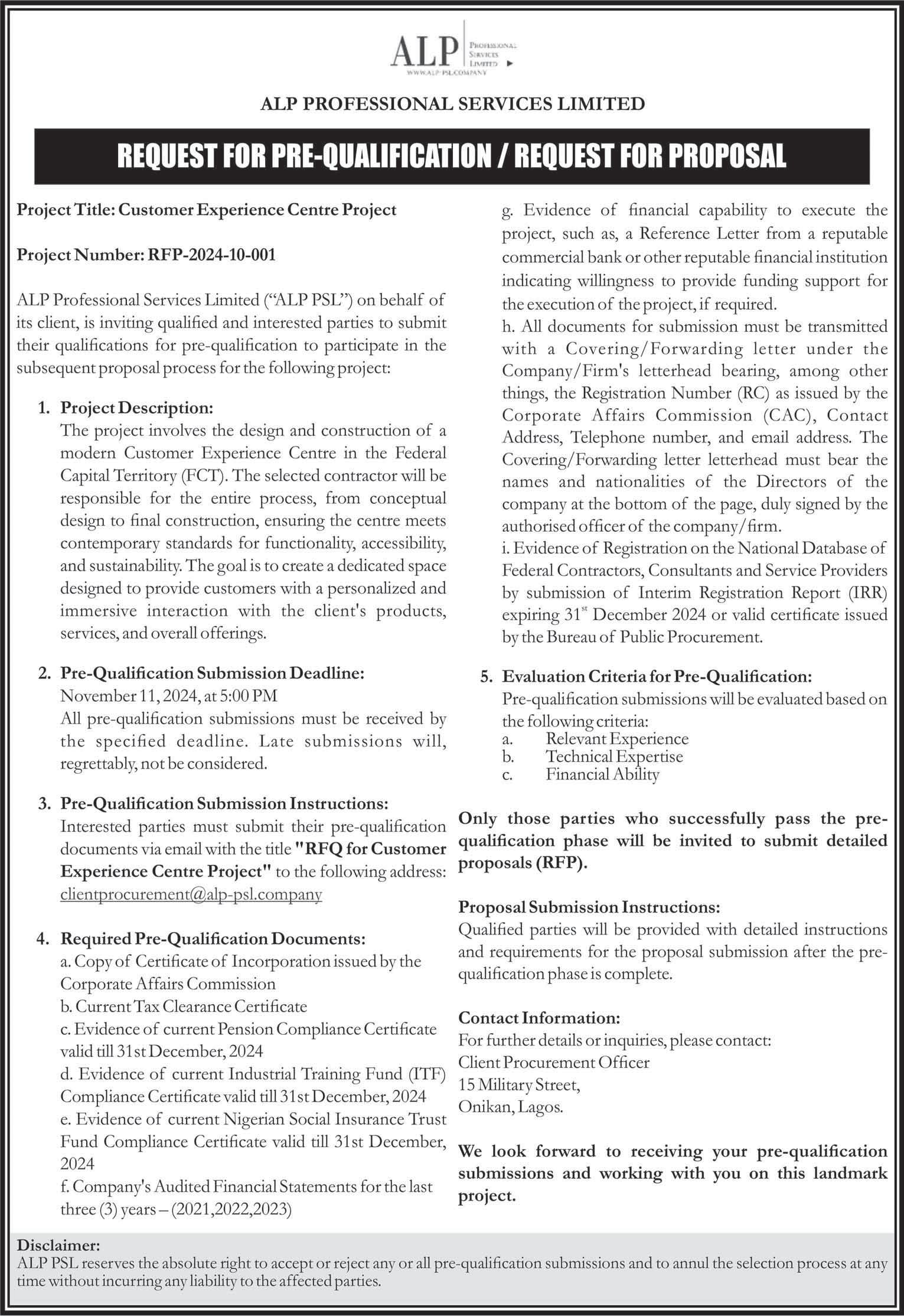
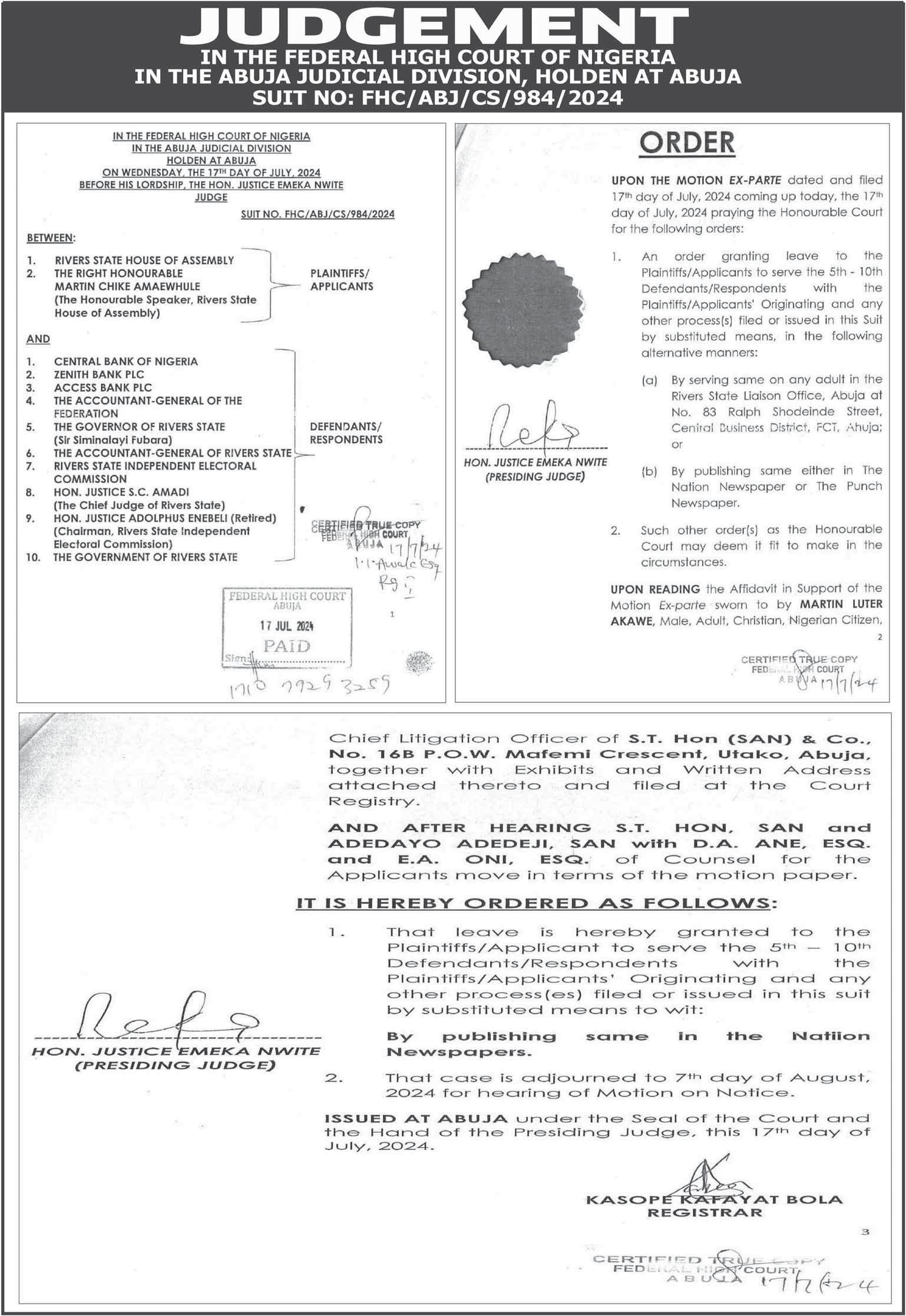

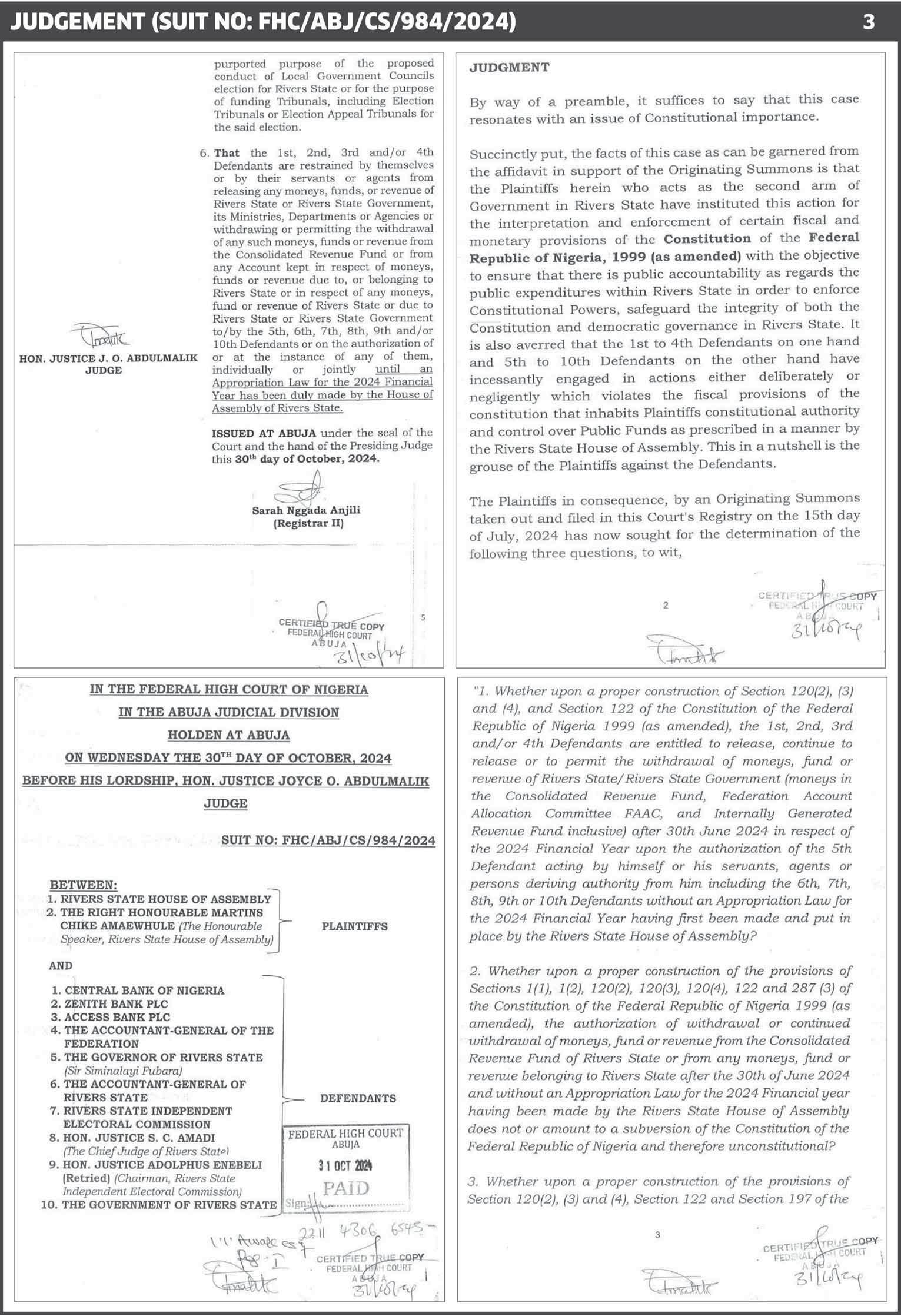


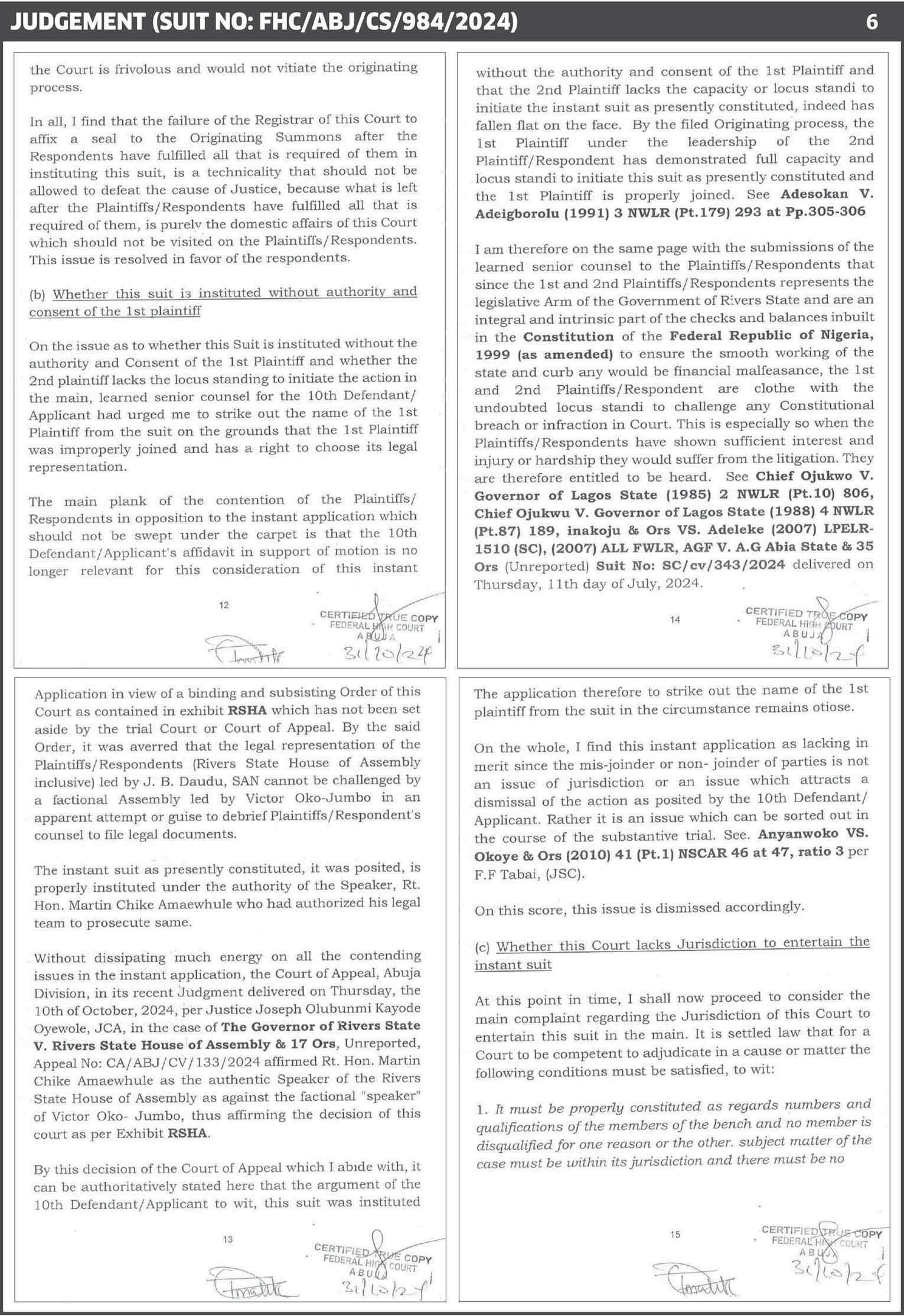
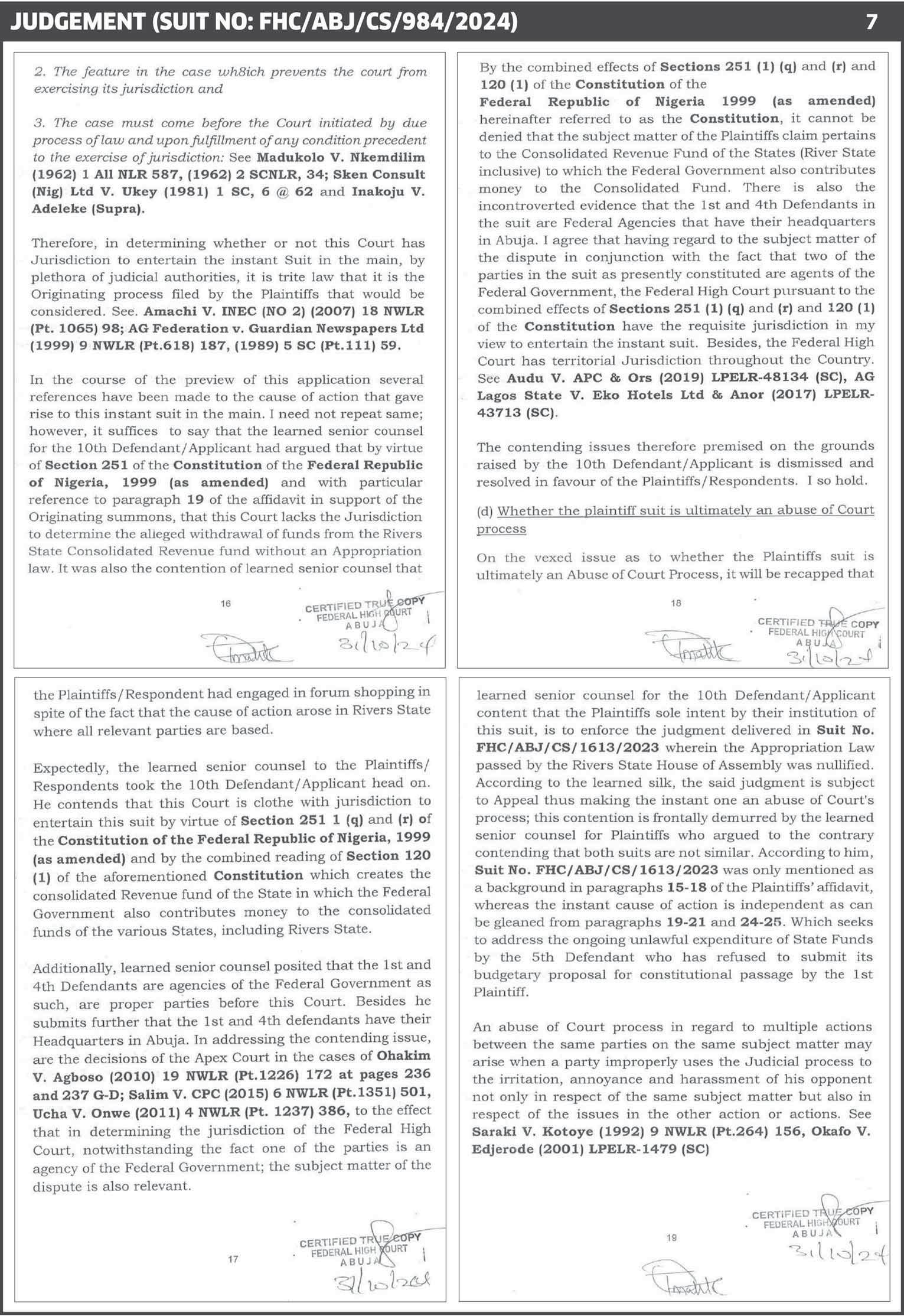
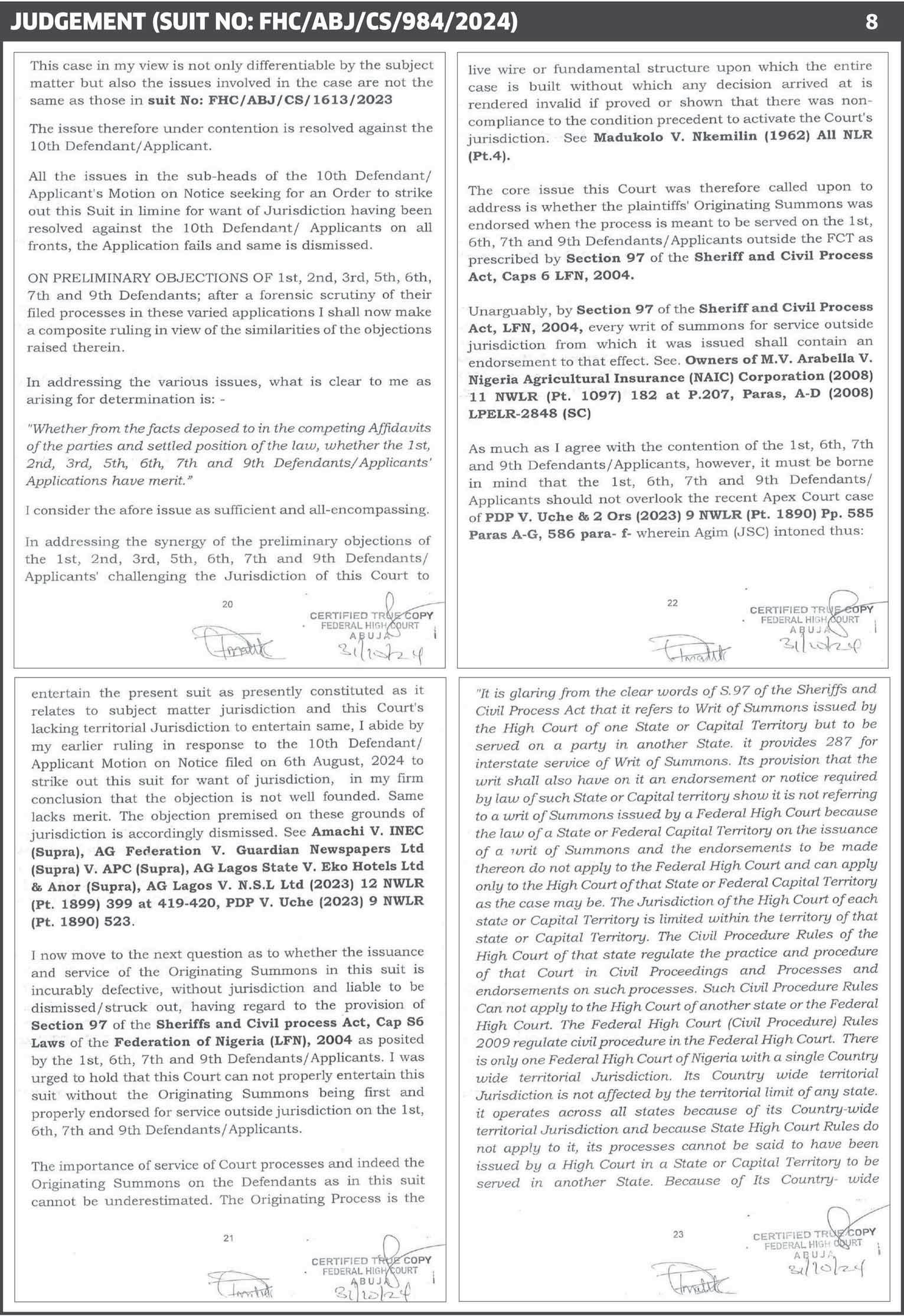
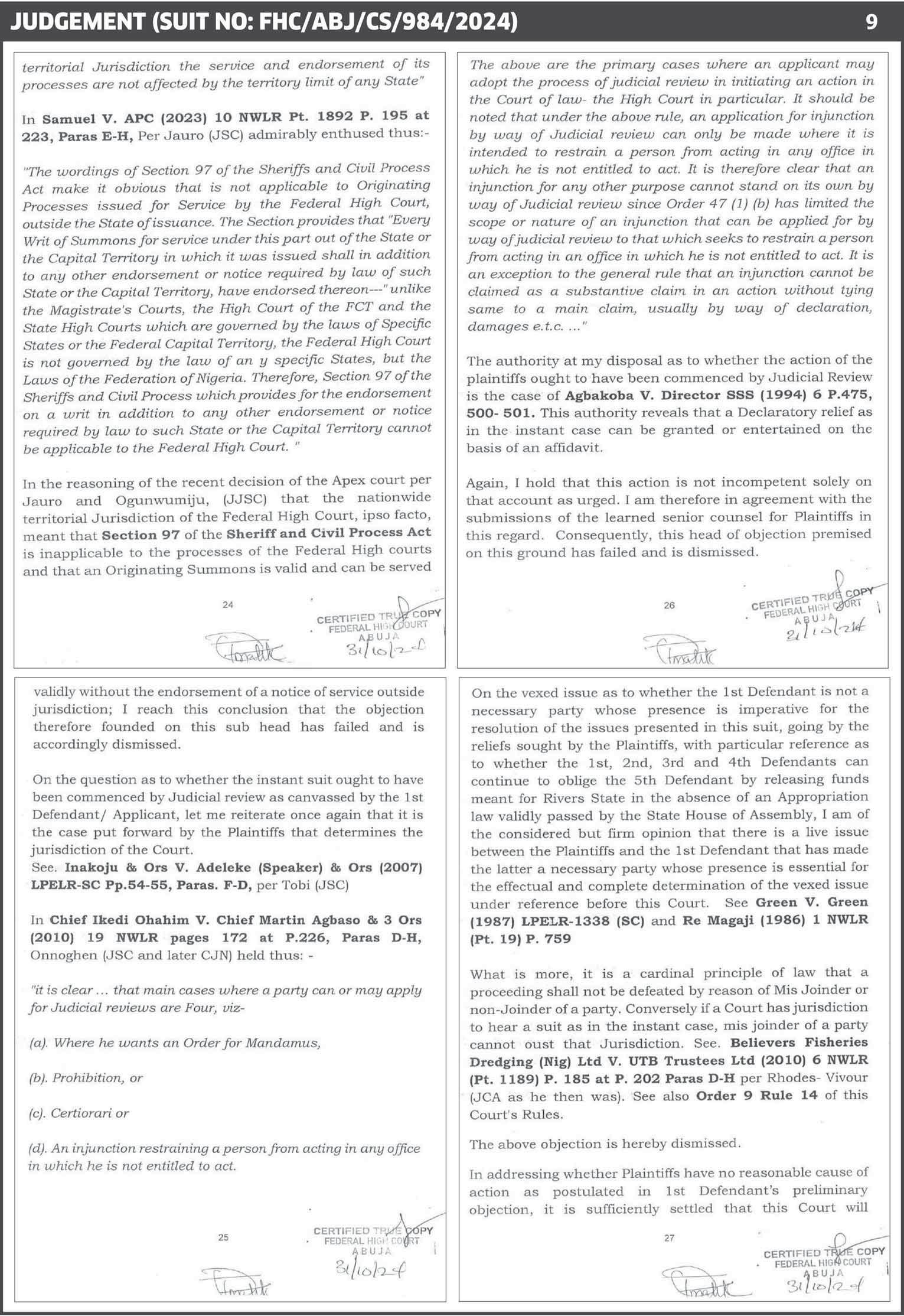

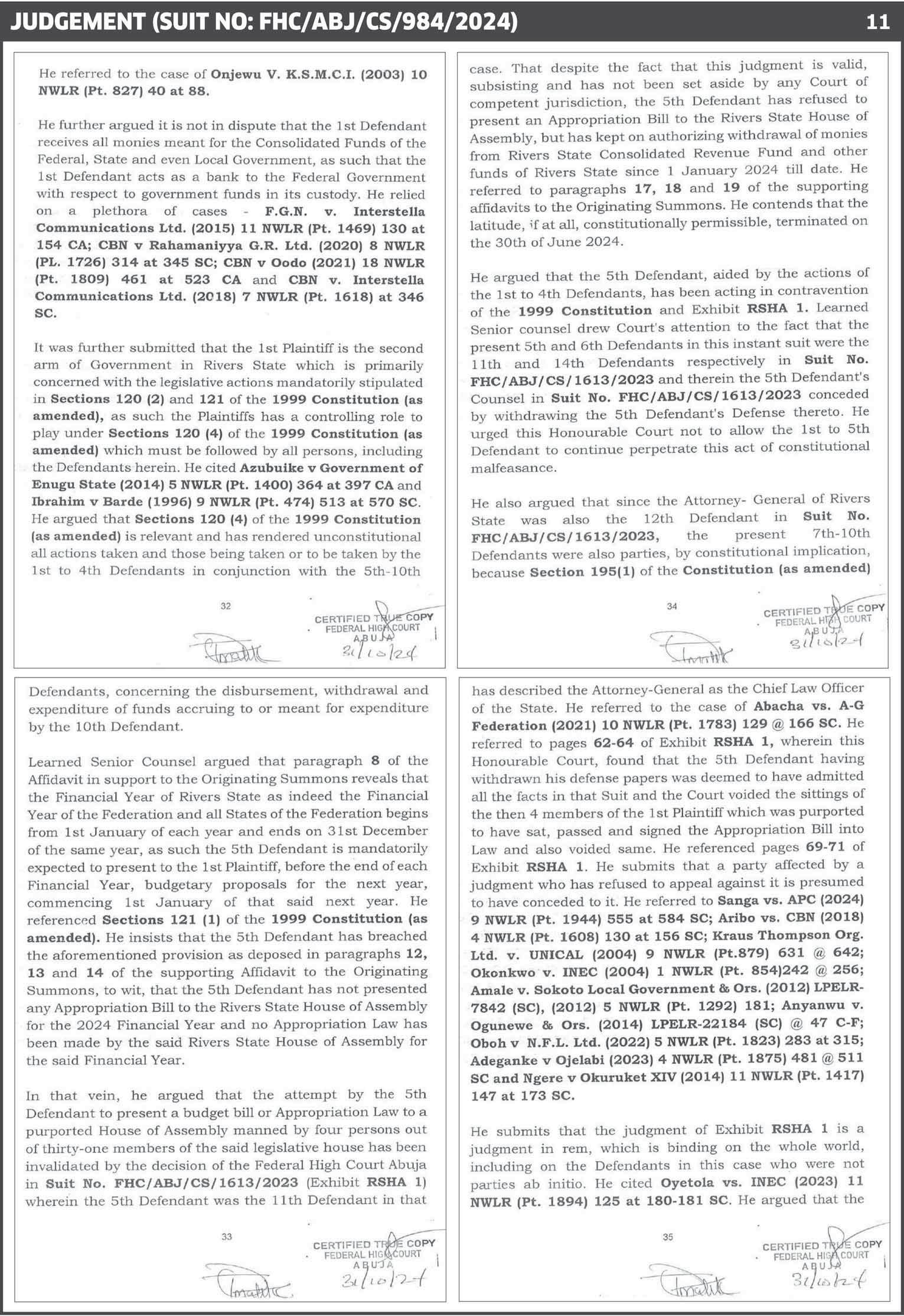
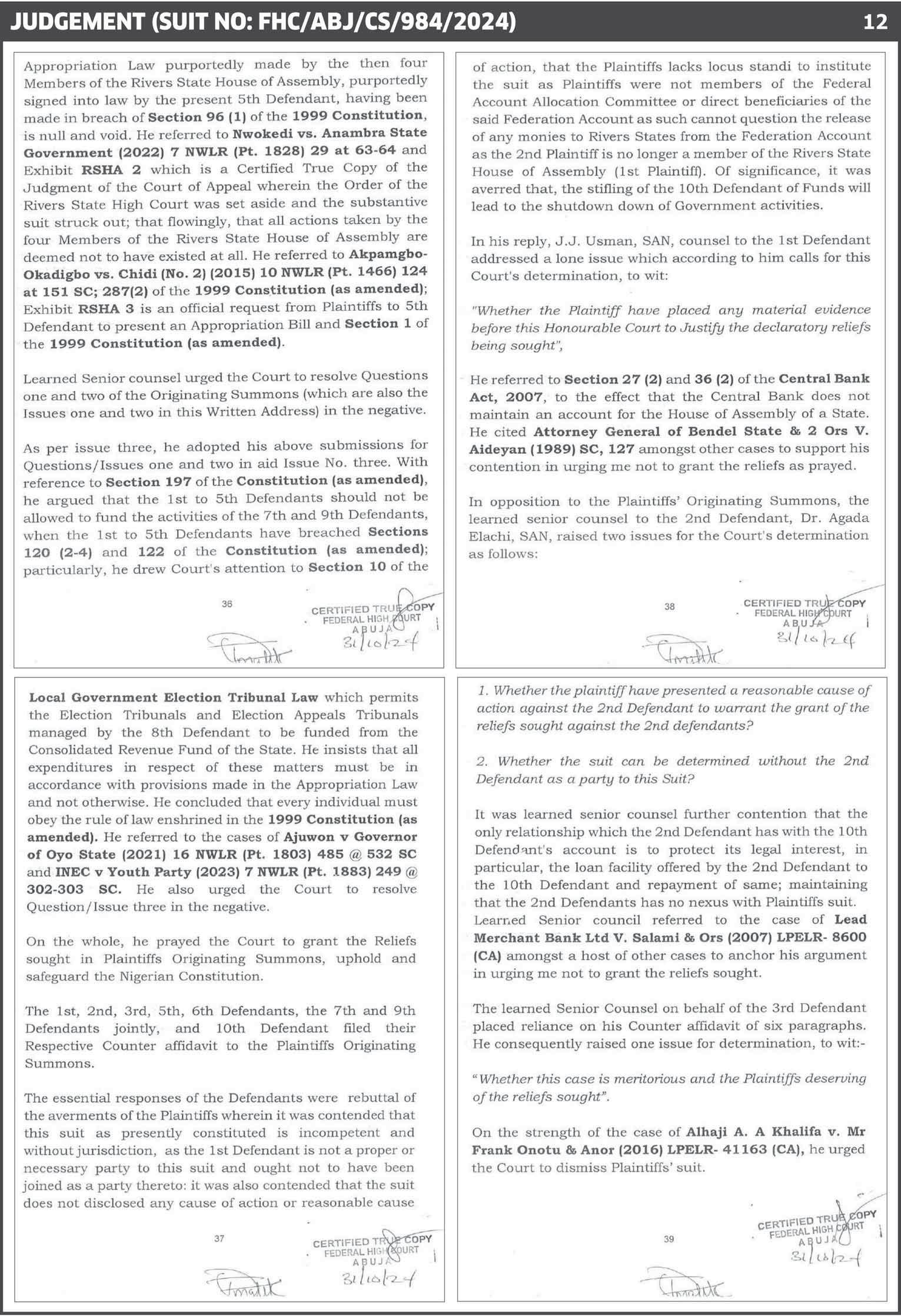
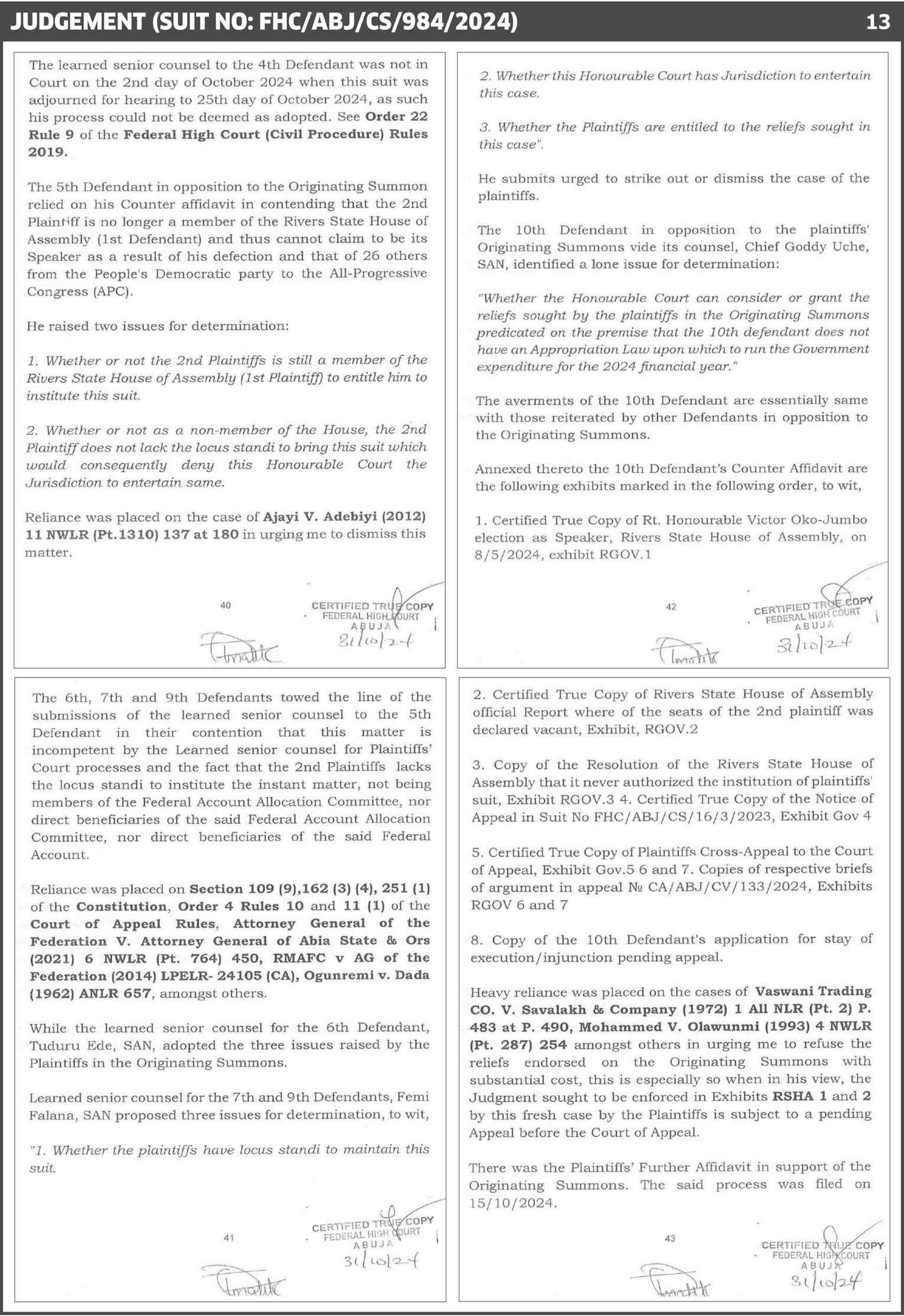
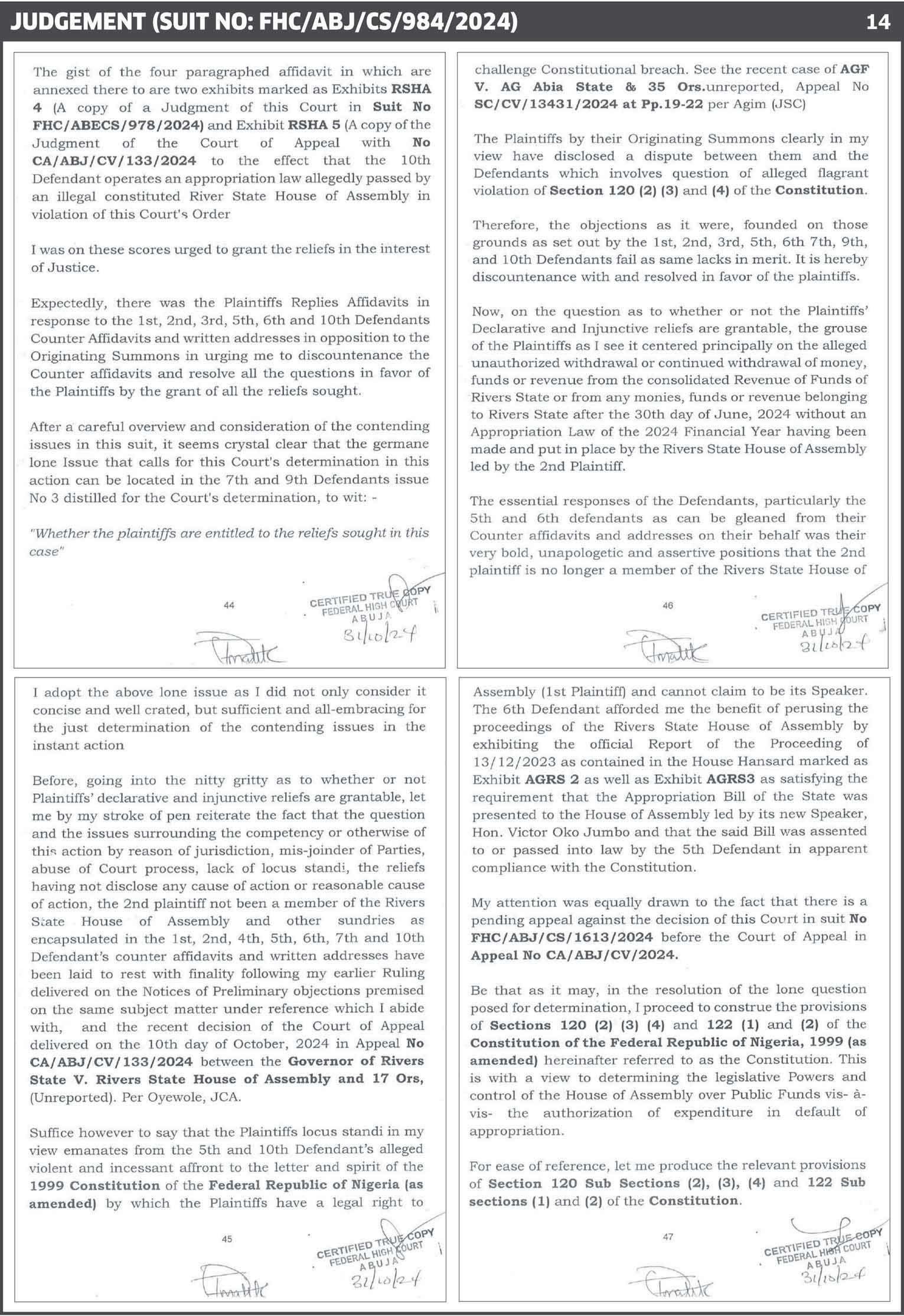

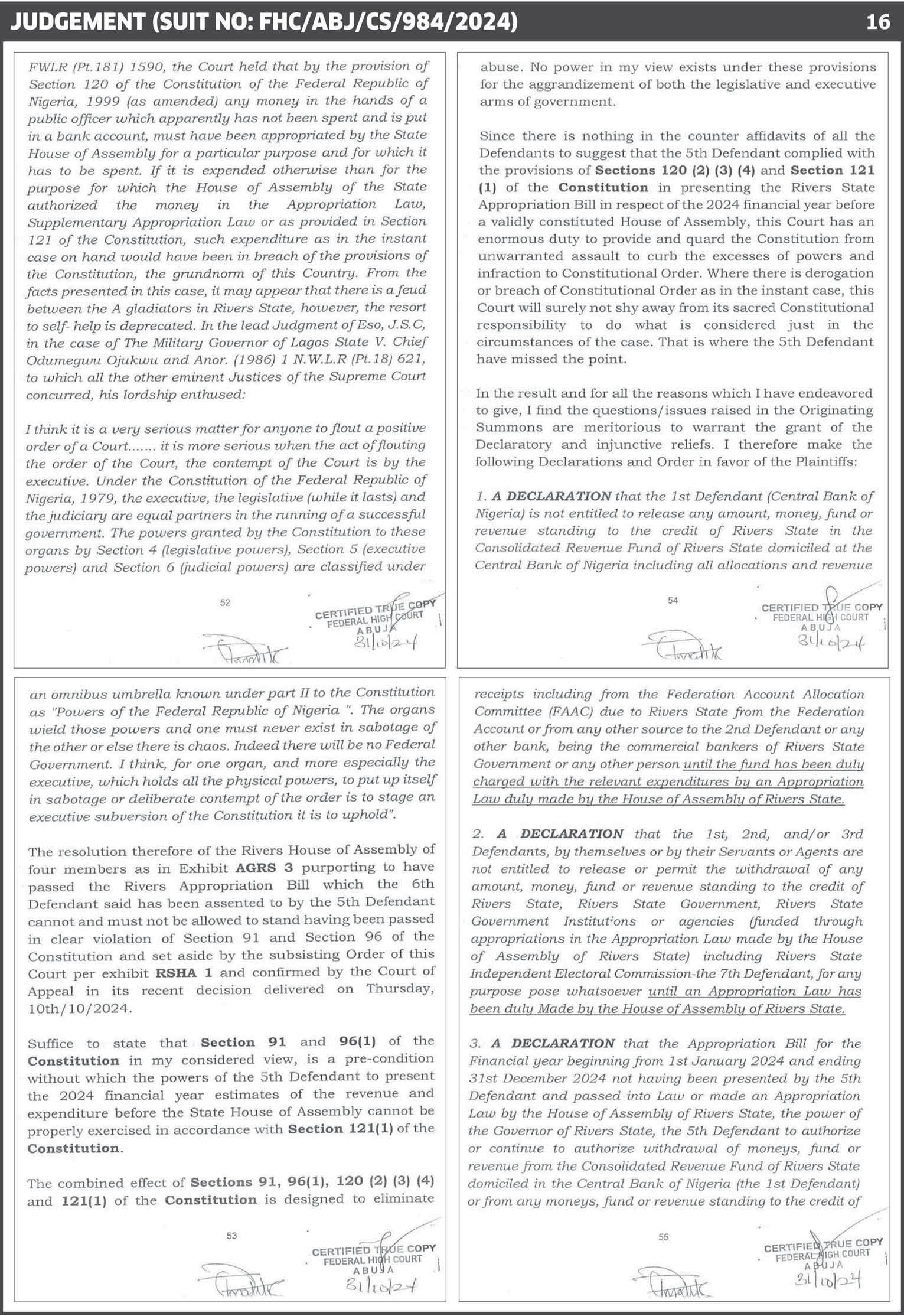
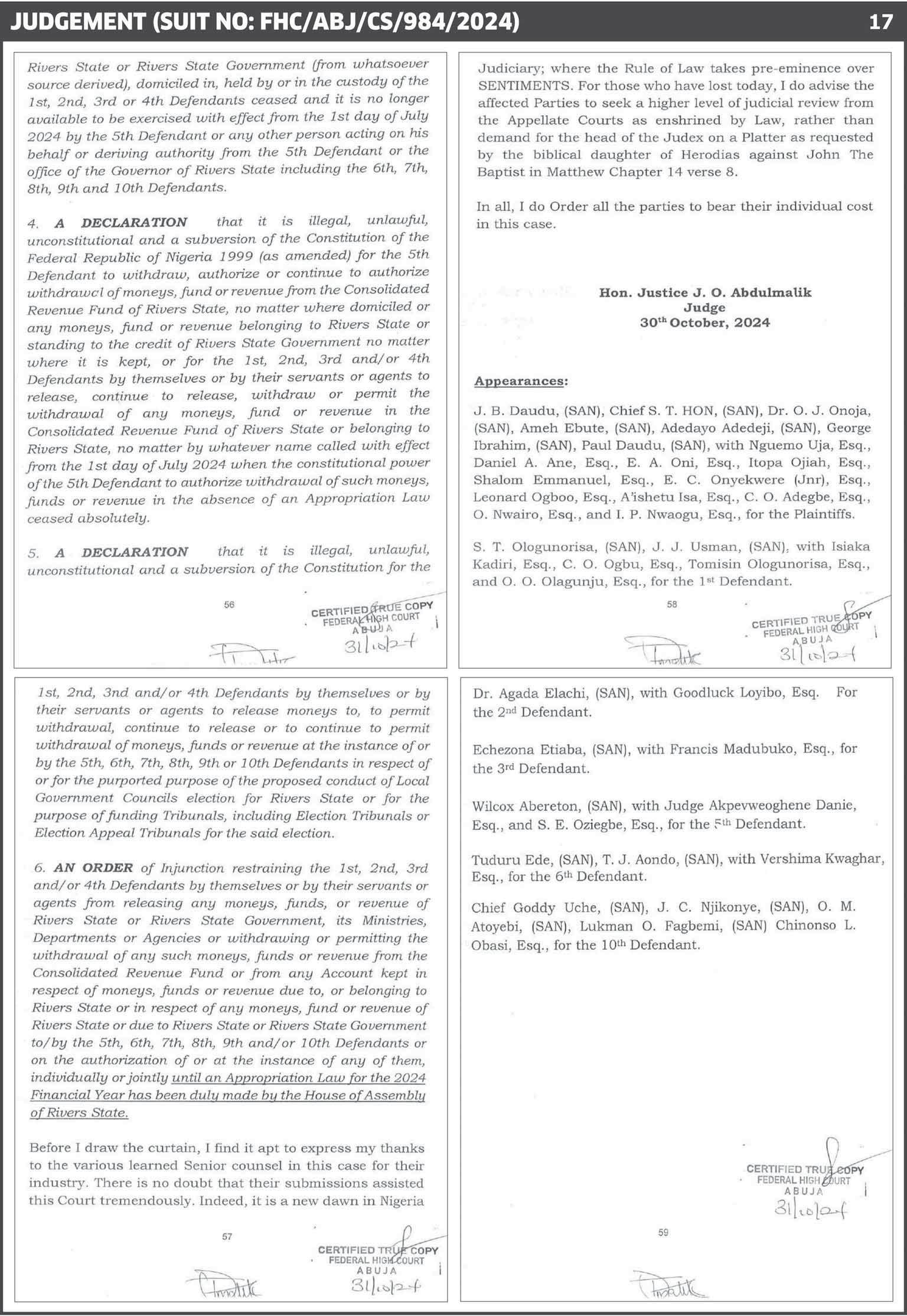
Nume Ekeghe
Woodhall Capital, a financial Services firm, has signed a $25 million loan facility with the African Export–Import Bank (Afreximbank) to provide a support vehicle for Nigerian SMEs entering export markets.
The signing ceremony took place during the inaugural Afreximbank SME Development Workshop and Stakeholder Engagement Programme, themed “Nurturing African SMEs: Bridging the Barriers to Export”, currently ongoing at the prestigious Zinnia Hall, Eko Hotels & Suites in Lagos.
While declaring the workshop—attended by over 400 stakeholders—open, the Executive Vice President of Intra-African Trade & Export Development (IAED) at Afreximbank, Kanayo Awani, noted that the event is a call for Nigerian SMEs to be champions of trade that accelerate development in Africa.
“This event, held in collaboration with Woodhall Capital, aims to develop the capacity of SMEs, the backbone of Africa’s economy.
It’s not just about nurturing SMEs; we’re also looking to identify financial institutions that can better serve SMEs,” she said.
Stressing the importance of the collaboration with the financial advisory firm, Awani disclosed that around 60% of SMEs struggle with access to finance.
He said, “SMEs in Africa still face significant obstacles to growth and prosperity, as only a small fraction venture into the export market, and even fewer have sustained long-term success. Bridging these barriers can empower SMEs to thrive on a continental and global scale. Access to affordable, appropriate finance is consistently cited as a major obstacle for SMEs.”
According to Nigeria’s Minister of State for Finance, Dr. Doris Uzoka-Anite, represented by the Executive Director of MSMEs at the Bank of Industry, Alhaji Shekarau Umar, out of the 58 African countries, 39 do not have populations exceeding 39 million.
“So if, in Nigeria, we have SMEs alone totalling 39 million, it means that selecting Nigeria to
launch the inaugural workshop is both deliberate and significant. We believe that Afreximbank’s interventions will enable African SMEs to overcome barriers to cross-border trade.
“I urge you all to go beyond the traditional issues SMEs face, like access to funds, and start discussing access to markets and capacity. We must understand that the funds provided to SMEs, if not accompanied by capacitybuilding, will be wasted,” she said.
The US Consul General, Will Stevens, represented by the Managing Director of Trade at Prosper Africa, Daniele Jean-Pierre, and the founder of Oriki Group, Fola Olowu, also participated, discussing the African Growth and Opportunity Act (AGOA).
Discussing the role of Woodhall Capital in enabling financial institutions, governments, and SMEs to access funding, the founder of the financial advisory firm, Mojisola Hunponu-Wusu, shared how the firm grew from a small-scale operation to a global institution with Afreximbank’s support.
Futureview Group, an investment banking institution, has unveiled plans to imbibe technology in its future operations to enhance the customer experience as it celebrated its 28-year anniversary.
The firm unveiled this at its anniversary celebration and customers appreciation cocktail reception in Lagos recently.
Speaking at the event, Futureview’s Group Managing Director, Elizabeth Ebi, while appreciating its clients, partners, and stakeholders, reflected on the company’s humble beginnings, from a
small children’s study room in Ikoyi Lagos to becoming one of Nigeria’s most diversified investment banking institutions.
According to her, despite economic challenges, the capital market has remained resilient, and Futureview has successfully navigated these challenges.
She said: “We consider it a privilege to have you here this evening, which demonstrates your unwavering support for Futureview Group and reflects your genuine desire for our continued growth and success.
“As we celebrate tonight, we also look toward the
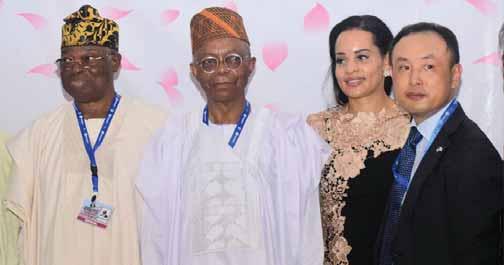
future with great excitement. Technology is at the heart of this transformation. It is revolutionising our business and driving us to innovate in ways that make banking and investing more accessible and efficient for you. We are committed to leveraging cutting-edge technology to deliver a seamless experience, making your interactions with Futureview smoother and more rewarding than ever.”
She noted that at Futureview, they are actively engaged in several groundbreaking projects that leverage technology across our corporate finance, asset management, and stockbroking divisions.
Saleko, Nigeria’s newest indigenous ecommerce platform that transforms the traditional Lagos market experience into a convenient online adventure launched its platform with a lively activation event across major areas of Lagos on the 1st of November, 2024. Designed to engageboth buyers and sellers, the launch sparked curiosity and brought the Saleko experience directly to the people, allowing them to interact with the brand and learn about its unique offerings.
Saleko offers a unique platform that stands apart from typical e-commerce sites. By providing capabilities like price comparison, bargaining, and bulk purchasing, Saleko mirrors the experience of inperson shopping in Nigeria’s vibrant markets. Buyers can navigate through a wide array of locally produced and globally sourced goods, with the convenience of never leaving home.
A spokesperson for Saleko stated, “Saleko is deeply committed to empowering Nigerian entrepreneurs, providing a robust platform for local merchants to showcase their products and grow their
customer base. That’s why we have built strategic partnerships with Lagos State Employment Trust Fund (LSETF) to onboard Lagos based sellers and drive impactful capacity-building training for merchants; as well as with Addosser Microfinance Bank to provide sellers access to working capital loans. These partnerships reflects Saleko’s commitment to the community, as we are not only bringing merchants online but also empowering them with the skills and resources they need to thrive in the digital economy.”
President Bola Ahmed Tinubu congratulates Dr Adesola Adeduntan, the retired Group Chief Executive Officer of First Bank Nigeria Limited, for his exceptional service at Nigeria’s oldest bank.
In celebration of Adeduntan’s remarkable tenure, the 130-year-old First Bank will held a special send-off ceremony over the weekend, expressing gratitude for his contributions over the past nine years.
President Tinubu commended
him for steering the bank through transformative growth, which includes expanding customer accounts from 10 million to over 42 million and elevating Profit Before Tax from N10 billion in 2015 to an impressive N300 billion in 2023.
These milestones, the President said, reflected Adeduntan’s visionary leadership and commitment to excellence.
Tinubu expressed his appreciation for Adeduntan’s
willingness to serve the nation in various pivotal roles, including his contributions to the Nigerian Economic Summit Group and other prominent institutions. His extensive expertise in the financial sector has significantly bolstered Nigeria’s economic landscape.
Tinubu also lauded the bank’s solid internal management ethos, which is responsible for the seamless transition from Adeduntan to the current CEO, Olusegun Alebiosu.
Kayode Tokede
Lafarge Africa Plc has announced a profit after tax of N60.08 billion for the nine months ended September 30, 2024, about 53 per cent increase over N39.31billion reported in nine months of 2023.
The results, the company said, reflected strategic focus on sustainability and operational efficiency as profit before tax closed at N94.33billion, representing an increase of 54 per cent from
N61.16 billion reported in nine months of 2023.
The cement maker declared N479.5billion net sales in nine months of 2024, up by 66 per cent from N289.08billion in nine months of 2023, a major contributing factor that impacted on profit generation.
The CEO of Lafarge Africa, Lolu Alade-Akinyemi in a statement said, “ We achieved strong top-line growth of 101per cent and 66per cent in third quarter
(Q3) and nine months of 2024, respectively. “PAT improved on the back of operational efficiency amidst heightened cost pressure. Our performance was driven by strong output due to improved plant stability, enhancement in our supply chain operations and our cost management initiatives.”
“Our strategic initiatives contributed significantly to our results despite macroeconomic challenges. We remain committed to our innovation drive and
green growth acceleration, in line with our sustainability ambitions, while also delivering value to our stakeholders.
“I would like to thank our esteemed customers, employees and all other stakeholders of Lafarge Africa for their commitment despite the macroeconomic headwinds being experienced in the industry.”
The cement maker said it unveiled Water-shield Cement in Q1 2024; the product continues to
make good strides in the market.
“This product has started to redefine industry standards, offering a solution previously unseen in construction materials.
Lafarge Water-shield Cement prevents water from permeating into buildings, thus ensuring the durability of the structure. This can be used for new structures and for remedial works where rust marks or seepage is evident on the building,” it stated in a statement.
The company disclosed that it will launch a new product this month, named Supa whyte, a Gypsum plaster (POP) product, to further extend its range of products in the building Solutions applications. The product is set to improve versatility in design, allowing a wide range of decorative designs.
Lafarge Africa launched its first ECOPlanet cement in Q3 2024 to strengthen its commitment to a greener planet.
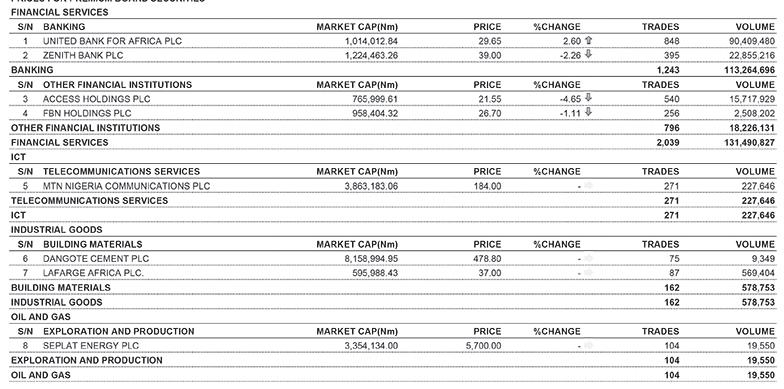
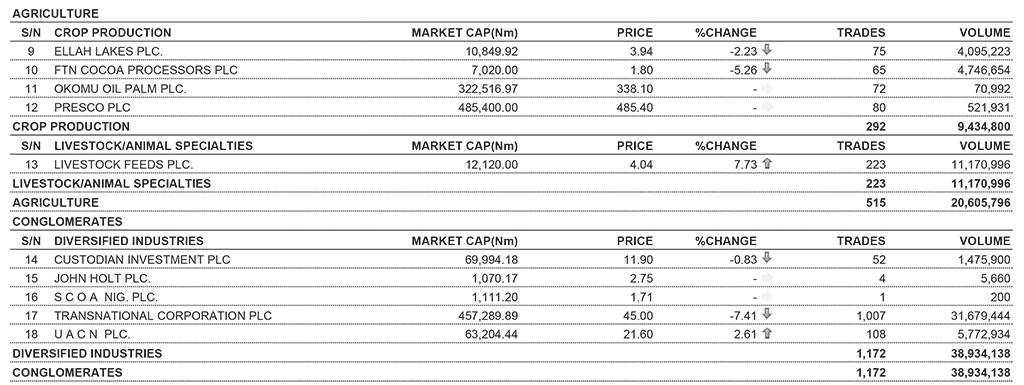
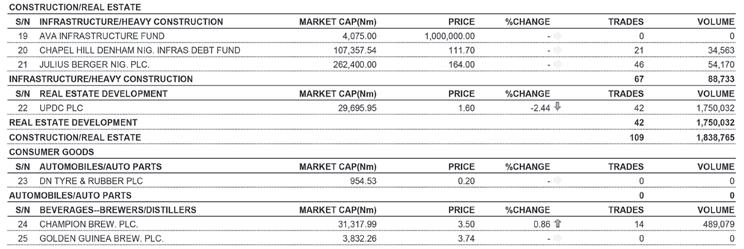
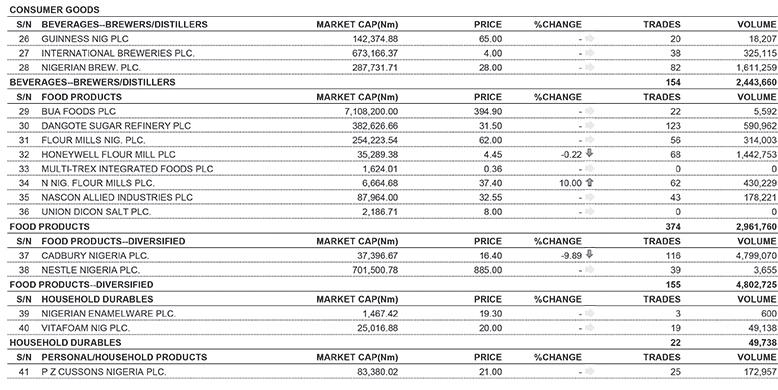

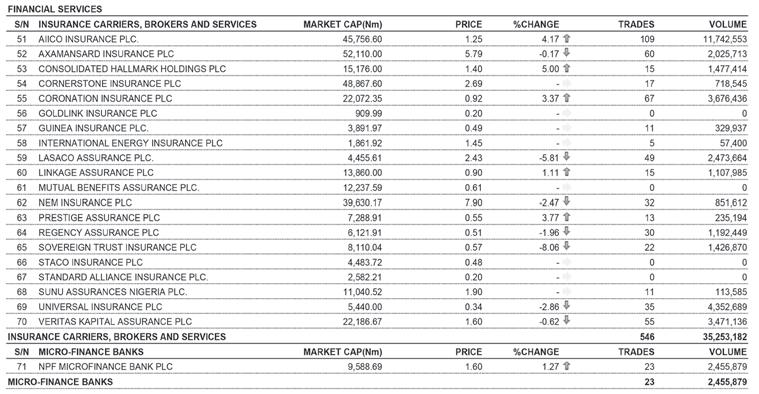

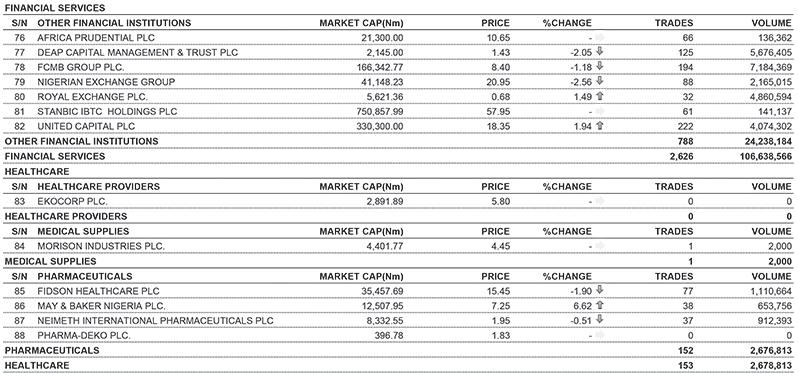
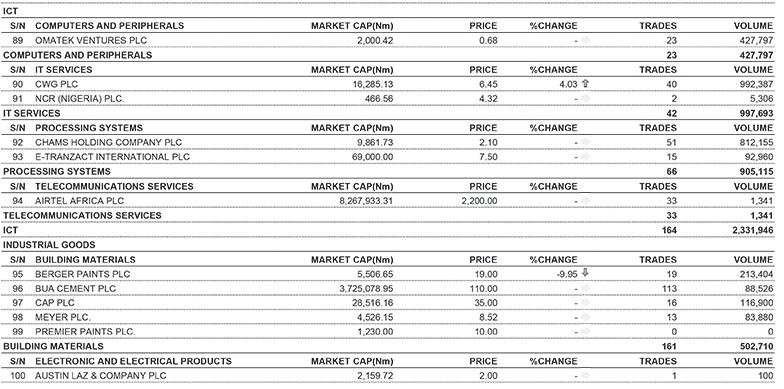
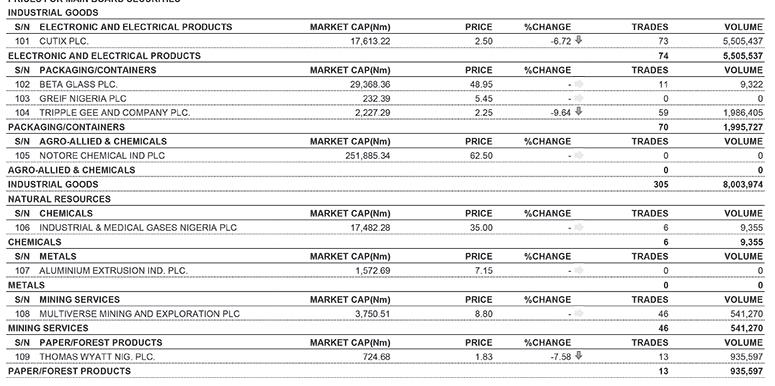


L-R
Patience Jonathan seeks God's intervention Gov, lawmakers, others celebrate OPM at 18 Police debunk rumours of violence in state
Blessing Ibunge in Port Harcourt Rivers State Governor, Siminalayi Fubara, yesterday, disclosed that the current political crisis in the state was about control of resources.
Fubara, however, assured that his administration will ensure the protection of state resources.
But former First lady, Mrs. Patience Jonathan, urged Christians and Nigerians, at large, to pray to God for the peace of Rivers State.
The governor and the former first lady spoke as they celebrated the General Overseer of Omega Power Ministries (OPM) Worldwide, Apostle Chibuzor Gift Chinyere, on his 51st birthday and 18th anniversary celebration of the church at Aluu, Rivers State.
In another development, the Rivers State Police command dismissed a rumour that security operatives attached
to Fubara had a fracas with some military officers loyal to the Minister of Federal Capital Territory (FCT), Nyesom Wike.
Speaking at the occasion, Fubara assured Rivers people that he will continue to utilise the state’s resources judiciously for their betterment and overall interest. He asked for continuous prayers from the church and the people in the state.
Fubara said his administration would remain focused on achieving the purpose of governance.
He said, "There is a reason for this crisis, and that reason is the control of the resources of Rivers State. Rivers State resources belong to you, and we will make sure that the resources are applied judiciously for the betterment of Rivers State.
"What you owe us is just one thing: continue to pray for us. Let us not lose focus because we know the devil is
always at war to derail people in governance.
“Continue to pray for us because what is most important is the interest of the people here, and I believe that with your prayers, we will not lose focus and the purpose of governance will be achieved in Rivers State."
The governor, who noted the decay of public amenities met on assumption of office, commended the General Overseer of OPM for his philanthropic works and contributions to humanity.
He stated that the educational programmes in the ministry aimed at providing children the requisite vocational and technical knowledge needed for future employment.
He said, "I want to commend you for what you are doing. Life is not about taking. What is important in life is giving, and anybody who believes that it is only taking, the person won't
go far in life."
He went ahead to donate the sum of N200 million to the church to support its ongoing infrastructure development projects.
Earlier, Jonathan urged Nigerians, especially Rivers people, to pray for peace and progress of the state and the country, at large.
She described Apostle Chinyere as a beacon of hope for the less privileged in the country, stating that if there is no peace in Rivers, there would be no progress.
The former first lady said, "If there is no peace in Rivers State, it will affect Bayelsa and South-south at large. I am appealing to every individual in the political crisis to sheathe their swords for peace in the state.
"I also call on all other pastors and churches to pray for Rivers and the governor of the state. Where there is
Adedayo Akinwale in Abuja
Pan-Yoruba socio-cultural and political organisation, Afenifere, has described the emergence of Mrs. Olukemi Badenoch as Leader of the Conservative Party in the United Kingdom as “a pride to the black race”.
Afenifere recalled that the 44-year-old politician was
elected as the new head of the Tories Saturday morning, after securing 53,806 votes against that of her closest rival, Mr. Robert Jenrick, who got 41,388 votes.
By this election, Badenoch became the first African and woman to occupy the highest major political office in the Western hemisphere. Afenifere, in a statement by
its National Publicity Secretary, Jare Ajayi, said the election of the British-Nigerian was a landmark achievement for the black race “as well as a proof that steadfastness and commitment have rewards.”
It stated, “Without doubt, the emergence of Mrs. Kemi Olufounto Badenoch (nee Adegoke) as the new leader of Conservative Party on
Saturday, November 2, 2024 is a thing of pride not only for Nigeria but also for Africa and the black race as a whole.”
While congratulating the new Tory chair, Afenifere praised her for the way she had conducted herself in the course of her political career “and especially in the campaigns leading to the Saturday voting”.
Adedayo Akinwale in Abuja
The ruling All Progressives Congress (APC) said the alleged presidential bid of the Oyo State governor, Seyi Makinde, at the expense of the job he was elected to do, was a disservice to the people of the state.
National Publicity Secretary of APC, Felix Morka, in a statement, recalled that Makinde at a recent event in Ibadan blamed APC for the turmoil in his Peoples Democratic Party (PDP) and
other opposition parties.
The statement said, “While our democracy affords Makinde the liberty to his political aspiration, however, engaging in reckless executive flippancy, at the expense of the job he was elected to do as governor is a disservice to the good people of Oyo State.
“If Makinde knew how best to keep APC’s influence at bay, exactly why has he not executed that strategy in ‘protection’ of his party nationally?
“Like the proverbial bad
workman that blames his tools, Makinde and his co-confused leaders of the PDP should quit pointing fingers at the APC and take full responsibility for their disgraceful failure to handle the party’s implosion and decay.
“Makinde’s unhinged 2027 ambition cannot be founded upon his unguarded and unjustified attacks against our great party or the administration of President Bola Tinubu that has launched the boldest and most ambitious reform effort in history to transform our
country’s economy and build a solid foundation for progress.”
Morka said Makinde had failed to prove himself as an effective leader, adding that his lacklustre performance as governor speaks for itself, and undermines his credibility.
He stressed that instead of prioritising the needs of Oyo people, who elected him to tackle their local issues, he had chosen to divert his attention and squander the state's resources in pursuit of unhinged 2027 ambition.
no peace, there will be no development. Our parents are here, so we don't know who the stone will touch.
"We are one irrespective of where you are from. We must love one another and not kill one another. Let God come down and save Rivers State. We are tired of the negative news that comes from the state."
The event was also attended by other prominent politicians in the country, including the governor of Abia State, Alex Otti, and former Senate President Adolphus Wabara.
Meanwhile, a statement by the state police spokesperson, Grace Iringe-Koko, said the rumour about confrontation in the state was false and manipulated by persons bent on stoking crisis reign in the state.
Iringe-Koko stated, "The Rivers State Police Command unequivocally refutes the unsubstantiated report currently circulating, alleging a violent altercation at the Rivers State Government House involving supposed military forces allegedly loyal to former Governor Nyesom Wike and current Governor Sim Fubara.
"We can confirm that there was no such incident, and this narrative is a
deliberate fabrication aimed at inciting fear, confusion, and unrest within Rivers State."
She confirmed that Fubara did not declare curfew or takeover security structure in the state.
The police spokeswoman said, "There have been no reports of armed confrontations or casualties involving Nigerian military personnel within Rivers State. Furthermore, Governor Fubara has neither ordered a curfew, nor called for any form of take-over of security operations within the state by militant groups.
“The Nigeria Police Force and other security and law enforcement agencies remain in full control, actively maintaining peace and security in Rivers State and across the state.
"This false narrative serves no purpose other than to disturb the peace and tranquillity in the State. The public is therefore urged to disregard these false rumours and refrain from spreading unfounded and destructive reports, while we call on all and sundry to verify information from credible sources and avoid sharing sensational and baseless claims targeted at causing discord."
Sylvester Idowu in Warri
A coalition of Itsekiri, Ijaw and Ilaje graduates, hasthreatened to shut down facilities belonging to Chevron Nigeria Limited in their communities over alleged deceit by the firm in response to employment dispute.
The coalition, also known as the "3Is" in a statement in Warri, yesterday, called on President Bola Tinubu and the Management of NUPRC and NCMDB to call Chevron to order to avoid being pushed into shutting down oil explorations in their communities.
According to the coalition in a statement signed by President, Egbema-Gnatamatu, Ogulagha graduates (KOMBOT); President, National Association of Itsekiri Graduates (NAIG), Esiategiwa Donald Mino and President of National Association of Ilaje Graduates (NAIG), alleged that members were being pushed to the wall with the
treatment of the management of Chevron in handling their grievances.
The coalition said host communities’ leaderships had to stage a walkout at a meeting summoned by CNL, having been delayed for hours before the management team of the firm showed up.
It also alleged that after being prevailed upon, the meeting went ahead but was short-lived when certain individuals that were not captured in earlier correspondences with the HCDTs and 3Is were included.
"These individuals were asked to be part of a meeting that was restricted to the HCDTs and 3Is. We see that as a divide and rule tactic to cause ill feelings and quarrel among us," the coalition added.
The graduates, therefore, vowed to shut down CNL operations in their territories over the company's misappropriation of job opportunities, all to the detriment of host communities.

L-R: Executive Director, Research and Training
Call on Tinubu, police to release them
Chuks Okocha, Michael Olugbode in Abuja and Segun Awofadeji in Gombe Rights group, including National Human Rights Commission (NHRC) and Socio-Economic Rights and Accountability Project (SERAP), among others, have condemned the recent arraignment for treason of minors, who allegedly participated in the nationwide #EndBadGovernance protests.
NHRC, in a statement, said the arrest, detention and arraignment of the minors by the Nigeria Police on charges of treason and attempting to overthrow a legitimate government, among other charges, clearly contravened a plethora of national, regional and international laws. Executive Secretary of the commission, Dr. Tony Ojukwu, who stated this in Abuja over the weekend, said the action of the police had raised concerns among senior lawyers and legal experts, the human rights community, development partners, sister national human rights institutions and well-meaning Nigerians. He said it was widely considered
an excessive and inappropriate use of state institutions against citizens and even worse when the victims were minors whose best interest were not considered at all in line with the law.
Ojukwu stressed the importance of ensuring that legal proceedings aligned with children's rights as protected under Nigeria's Child Rights Act 2003, the Administration of Criminal Justice Act 2015 (ACJA), and some regional and international legal frameworks, including the African Charter on the Rights and Welfare of the Child and the United Nations Convention on the Rights of the Child (CRC).
SERAP, on its part, urged President Bola Tinubu to use his “leadership position and good offices to direct the Attorney General of the Federation and Minister of Justice, Mr Lateef Fagbemi, SAN, to take urgent steps to ensure the immediate and unconditional release of all the #EndBadGovernance protesters including the 32 hungry and malnourished children.”
SERAP said, “These children and other protesters are detained solely for
the peaceful exercise of their human rights.”
It urged Tinubu “to direct Mr Fagbemi and appropriate law enforcement agencies to promptly investigate the circumstances surrounding the grave violations of the human rights of the children and other protesters in detention, and to identify and bring to justice those responsible, and ensure justice and remedies for the victims.”
SERAP also enjoined the president “to direct Mr Fagbemi and appropriate agencies to ensure the immediate access to medical treatment for all the protesters including the 32 hungry malnourished children for their apparently deteriorating health”.
In the open letter dated November 2, 2024 and signed by SERAP’s deputy director, Kolawole Oluwadare, the organisation said, “Bringing charges against children and detaining them simply for the peaceful exercise of their human rights is clearly not acting in the ‘best interests of the child’.”
Another group, the Movement
for the Transformation of Nigeria (MOTiON), said it was outraged and appalled by the display of government repression that led to the unconscionable detention of 76 protesters across the nation, including 32 minors.
The group, in a statement by its Convener, Hauwa Mustapha, said the protesters were being charged with ludicrous accusations of terrorism, attempted mutiny, and treason simply for exercising their democratic right to protest against government mismanagement of the commonwealth resources, hunger and hardship.
“This alarming attempt to criminalise peaceful expression as guaranteed by the 1999 Constitution, as amended, is yet another assault on the fundamental rights and freedoms of Nigerian citizens,” it said.
North East Youth Reformation Forum, while condemning the sentencing of minors arrested during the protest, expressed deep disappointment and concern over the verdict.
In a statement by its president, Comrade Abdurrazak Sani Albany,
ATIKU: FG SHOULD ADOPT MY MANIFESTO... PRESIDENCY: NIGERIA WOULD’VE DETERIORATED UNDER YOU
adopting a floating exchange rate system would be an overkill. We would have encouraged our Central Bank to adopt a gradualist approach to FX management. A managed-floating system would have been a preferred option.”
Presidency: Nigeria Would’ve Deteriorated Under Atiku
However, the presidency, in a statement titled, “Our Initial Response to Alhaji Atiku Abubakar,” by the Special Adviser to the President on Information and Strategy, Bayo Onanuga, maintained that if Atiku had won the presidential poll last year, Nigeria would have been worse for it. It explained that Tinubu inherited a country with a myriad of grave challenges, adding that in the over one year of the Tinubu administration, it has succeeded in correcting past mistakes made by President Olusegun Obasanjo, under whom Atiku served
as Vice President from 1999 to 2007.
The presidency also accused Atiku of supervising a suspicious privatisation programme as vice president, alleging that Atiku lost the 2023 presidential poll principally because he promised to sell NNPC and other assets to his friends.
The statement said, "We have just read a statement credited to former vice president, Alhaji Atiku Abubakar, in which he tried to discredit President Bola Tinubu's economic reform programmes while pushing his untested agenda as a better alternative.
"First, Alhaji Atiku's ideas, which lacked details, were rejected by Nigerians in the 2023 poll. If he had won the election, we believe he would have plunged Nigeria into a worse situation or run a regime of cronyism.
"Abubakar lost the election partly because he vowed to sell the NNPC and other assets to his friends. Nigerians have not forgotten this, nor would they be comforted by Atiku’s antecedents when he ran the economy in the first
term of President Olusegun Obasanjo’s government between 1999 and 2003.
"As vice president, Atiku supervised a questionable privatisation programme. He and his boss demonstrated a lack of faith in our educational system, and both went to establish their universities while they allowed ours to flounder.”
The presidency added, "Talk is cheap. It is easy to pontificate and deride a rival’s programmes even when there are irrefutable indices that the economic reforms yield positives despite the temporary difficulties.
"Despite the futile attempt to hoodwink Nigerians again in his statement, it is gratifying that the former Vice President could not repudiate the economic reforms pursued by the Tinubu administration because they are the right things to do.
"His advocacy for a gradualist approach only showed that he was not in tune with the enormity of problems inherited by President Tinubu. It is so easy to paint a flowery to-do list. It is expected of an election loser.
"President Tinubu met a country facing several grave challenges. Fuel subsidies were siphoning away enormous resources we could ill afford, and there was criminal arbitrage in the forex market.”
The statement also said, "No leader worth his name will allow these two economic disorders to persist without moving to end them surgically.
"While advocating for gradual reforms may sound appealing, Tinubu took measures that should have been taken decades ago by Alhaji Abubakar and his boss when they had the opportunity.
"Alhaji Abubakar calls for empathy and a human face to reforms. We have no problem with this as it resonates well with our administration's focus.
President Tinubu has consistently emphasised the need for compassion and protection of the most vulnerable.
"The administration has prioritised social safety nets and targeted support for those affected by recent economic transitions."
weekend, the forum called on the federal government to intervene and review the case. The group said the arrested boys were unable to feed themselves, let alone afford the hefty fine imposed on them.
Albany urged northern leaders to take action and demanded that representatives, governors, ministers, and other influential figures of northern extraction stand up for the boys' freedom.
Chuks Okocha in Abuja
National Chairman of the Labour Party, Julius Abure, is scheduled to join other political leaders across the world on the invitation of the United States government to monitor the presidential election in the US.
The stage is already set for the November 5, 2024, US presidential election, with the two leading candidates, Vice-President Kamala Harris, Democrat, and former president Donald Trump, Republican, in a dead run to the finish line.
Abure, in a message on his verified Twitter handle wrote: "I've just arrived Washington DC on the US Government invitation to join other Political Parties and World Leaders to participate in the series of activities leading to the USA election and to observe the election.
“Hopefully, experience gathered will help shape and reshape election processes in Nigeria. I'll keep all my followers and Labour Party members informed of developments."
The Country Director, The International Foundation for Electoral Systems (IFES) Nigeria, Seray Jah, had earlier in the Letter of Invitation to Abure disclosed this.
"I am writing to invite you to participate in the 2024 IFES United States Election Programme (USEP), which will take place from Sunday, November 3 to Wednesday, November 6 at the Marriott Marquis in Washington. DC.
"Every U.S. Presidential Election, IFES hosts its U.S. Election Programme, gathering electoral stakeholders from around the world to learn firsthand about the American election process and
discuss democracy and elections from comparative international perspectives—the 2016 Election Program — the last in-person Program — featured 550 participants from 90 countries.
"The Programme features a series of exchanges ahead of election day on key concepts and issues impacting elections and germane to elections in every country, specifically focusing on the U.S. case.
“Participants learn about the decentralised U.S. election experience, election dispute resolution and the role of the Federal Election Commission, the rights of states to conduct elections per their systems and regulations, and the relationship between campaigns, election authorities, candidates, media, and the voters.
“On election day, participants tour polling Stations across the District of Columbia, Maryland, and Virginia to see how neighboring territories conduct their elections using different technology and procedures. The event is capped off by an election night event and a post-election day debrief.
“IFES strongly believes that the U.S. Election Programme represents a valuable opportunity for you to gain knowledge and insights on effective party governance, campaign strategies, internal party democracy, inter/intra-party dispute resolutions, and develop skills to improve their parties’ electoral performance and engagement with voters.
“Through this programme, you will explore these vital topics, fostering a deeper understanding of the U.S. electoral system and its comparative experiences while interacting with peers worldwide."
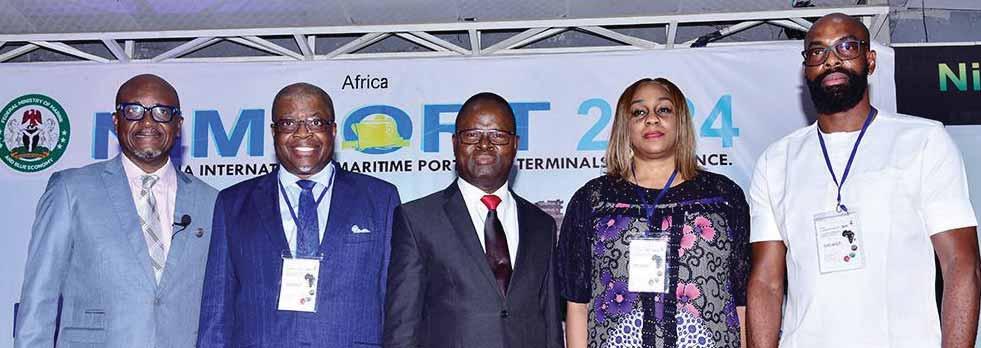
Goddy Egene
As the Peoples Democratic Party (PDP) challenges the result of the Edo State governorship election, in which the Independent National Electoral Commission (INEC), declared the All Progressives candidate, Senator Monday Okpebholo as the winner, the Executive Director of TAP Initiative, Martins Obono, has alleged that INEC actively participated in rigging the election.
INEC had declared Okpebholo the winner with 291,667 votes while Dr. Asue Ighodalo of the PDP was said to have come second with 247,274 votes.
Civil society organisations (CSOs),
which monitored the election, faulted the outcome, declaring that the results from several polling units were altered at collation centres.
Also, Yiaga Africa, which deployed the Process and Results Verification for Transparency (PRVT) methodology for the election, involving 300 stationary and 25 roving observers, covering a representative sample of polling units across all 18 local government areas of the state, equally faulted the conduct of the poll, declaring the results as lacking credibility.
Already Ighodalo has submitted a petition to the Election Petition Tribunal headed by Justice W. I. Kpochi. The Tribunal is expected to begin sitting
at the end of November.
However, speaking on ARISE News Channel’s Morning Show at the weekend, Obono presented what he described as “incontrovertible evidence” of electoral manipulation involving INEC’s own officials.
Backed by a series of documents, Obono revealed discrepancies between certified true copies (CTCs) of polling unit results issued by INEC and the versions uploaded to the agency’s official iREV polling unit result portal.
Obono, who is a lawyer, said: “What we found when we compared the CTCs issued by INEC to the results on iREV is staggering. It appears INEC printed a duplicate set of result
sheets to substitute the authentic ones. These duplicates carry the same serial numbers and other security marks, yet the iREV results are signed by party agents, while the CTCs are not.” Obono disclosed that his organisation, TAP Initiative, which advocates electoral transparency and accountability, had enlisted a forensic handwriting expert with global credentials, whose work is respected by institutions like the Nelson Mandela Foundation, who confirmed that many of these CTCs were, in fact, filled out by a single individual.
“One person sat down and forged these results. The findings shocked
Seriki Adinoyi in Jos
Gunmen suspected to be bandits have killed Mrs. Mary Jonathan and her son, Mr. Mark Jonathan at Mista Ali area of Jos North Local Government Area of Plateau State.
A member of the House of Representatives from Plateau State, Hon. Yusuf Adamu Gagdi, who confirmed the incident said the victims were his mother-inlaw and brother-in-law.
Putin’s “brutality” and warned that Trump would force Ukraine to “surrender” to Russia.
In the Middle East, Harris, again, has been broadly supportive of the administration’s approach to Israel’s widening war, which began in Gaza and now includes Lebanon, Yemen and Iran. Like Biden, Harris has called for a ceasefire in Gaza in exchange for the release of hostages taken by Hamas on October 7, 2023. e has signalled a continuation of Biden’s tough-on-China approach and has said she would honour the US’s commitments to Taiwan.
But Trump, who shares isolationist impulses, has repeatedly said that the world was a more peaceful place when he was in power.
He has long been a sceptic of global alliances. With many of his supporters opposed to continuing the flow of US aid to Ukraine, Trump has vowed to “fundamentally re-evaluate” the country’s approach.
He has claimed that he will end the nearly three-year war on his first day in office, but offered no details
Though details of the incident were still sketchy, THISDAY gathered that the victims who had been laid to rest at their family house along Zaria road Jos, were murdered at Mista Ali area of Jos, where the gunmen had operated.
Gagdi, who represents Pankshin/Kanm/Kanke federal constituency, shared photos from the funeral, describing the murder as violent and senseless acts.
“Today, alongside my wife
on how he might accomplish this. Trump has long cast himself as a champion of Israel, despite a long history of anti-Semitic remarks. Though he says he supports Israel’s mission, he has been critical of its tactics and has tangled with its leader, the right-wing prime minister, Benjamin Netanyahu. Harris has said unequivocally that the climate crisis is caused by human activity and represents an existential threat to the nation and the planet. She is a proponent of electric vehicles – though does not support a mandate – and backs clean-energy tax credits.
In contrast, Trump has questioned established climate science, previously dismissing the climate crisis as “mythical” and an “expensive hoax”.
He has also said that the warming climate is not necessarily responsible for making extreme weather events worse. On the campaign trail, he has summed up his position with the declaration: “Drill, baby, drill,” said a The Guardian report.
Jemimah, we laid to rest her mother, Mrs. Mary Jonathan and her brother, Mr. Mark Jonathan, who were tragically taken from us by violent and senseless acts.
“We honour their memories, pray and seek justice. Rest well, Mama and Brother Mark. May God Almighty expose the perpetrators of this heinous crime.
“It is appointed unto every soul to taste death, but yours regrettably came through the
BMI, a Fitch Solutions Company, in its latest report, stated that the election will have limited impact on Nigeria and Sub-Saharan Africa (SSA) because they remain low in Washington’s policy agenda.
But it argued, “Under a Harris presidency, we would see continued support for the US's key allies in SSA, such as Nigeria and Kenya. Harris is likely to adopt a softer tone towards countries with good relations with China and Russia, supporting US-South Africa ties
“US dollar would likely strengthen under Trump, leading to weaker SSA currencies and increased inflationary risks. Potential tariffs on China imposed by Trump could slow Chinese growth, negatively impacting SSA exports.”DirectorGeneral, Nigerian Institute of International Affairs (NIIA), Eghosa Osaghae, writing for the Council of
barrel of some trigger-happy men of the underworld. Nothing would have captured the vanity of human existence better than your senseless murder, alongside your son and my brother, Mr. Mark Jonathan.
“Your tragic murder has created a vacuum in our lives as we will miss your motherly love and care. Rest well Mama and may God Almighty expose the perpetrators of this heinous crime. Adieu, mama.”
Councils, an international initiative to connect leading foreign policy institutes, said the US presidential elections had always been of interest to Africa because of the crucial role the country played in the stability and development of the continent.
Osaghae stated, “Thus, the hope in Africa is that the U.S. presidential election can provide the opportunity for a positive reengagement with the continent’s flashpoints of decay and instability.
“Part of that hope is that the United States will support the reform and strengthening of the UN and other multilateral bodies to make them more inclusive and equitable agents of global governance.
“Developments in Sudan, Congo, and the countries of the Sahel-all of which have seen geopolitical realignment toward China and Russia-have already signalled growing discontent and impatience with the West as Africa struggles to surmount its existential challenges.”
He argued that the realignment of the US-Africa relations will require
us. If this is what democracy has come to, then the implications are deeply disturbing,” he said. Obono argued that the alleged manipulation marked a new, more insidious phase in Nigerian election fraud, noting that: “In the past, political
parties would rig elections. Here, we are witnessing institutional rigging by the very body entrusted to oversee the process - INEC itself,” he claimed.
“As custodians of our electoral records, they’ve betrayed the public trust by falsifying these documents.”
Benjamin Nworie in Abakaliki
he leadership crisis in the Ebonyi State chapter of the Peoples Democratic Party might have come to an end with the successful election of the state officers of the party.
The newly elected Chairman of the party, Peter Nwele, said the PDP would start bringing those that left the party back to form a formidable force to take over the state in 2027.
He said the state had been a PDP state and that the party would bounce back in 2027.
Nwele stated this during the state ward congress that produced him at the weekend.
The Congress held at the state secretariat of the party, was supervised by the 7-man committee from the National secretariat of the party (NWC), National Independent Electoral Commission (INEC) and security agencies.
a tempering of the US-centric rhetoric that had drien conversations on immigration, trade, aid, and multilateralism.
Senior Fellow for Africa Policy Studies, Council on Foreign Relations (US), Ralph Bunche, argued that although as was typical in the US election cycles, US- Africa policy did not figure prominently—or at all—Africa was changing rapidly, with old relationships and regimes under new stress.
Bunche stressed, “Afropessimism is lazy and reductive, as some changes do bring new opportunities to unleash the continent’s potential, but there is no escaping the reality that the region confronts massive challenges.
“... In a continent that has seen a rash of military takeovers and where polls show popular dismay with how democracy is working, struggles in the United States only exacerbate existing doubts.
"Ebonyi State is PDP right from time and it will continue to be in PDP. People say that there is crisis in PDP, there is no crisis in the party.
"The only thing we want to do now is to embark on bringing those who left the party back. PDP is a very large family that will accommodate all of us. So, we are ready to start bringing everyone back home.
"We are for forgiveness, we make peace for people to come back home so that we take back our lost mandate," he stated.
Ugonna Ogbonna, Chairman of the Congress committee, described the exercise as peaceful and transparent and commended members of the party for conducting themselves orderly.
National Vice Chairman, South East of the party, Chief Ali Odefa, said the enthusiasm and love for PDP in the state and the country in general was still very strong.
Former Nigerian foreign affairs minister, Professor Bolaji Akinyemi, argued on Arise Television that Harris will be a strong opponent for Trump in the election, highlighting that she will be difficult for Trump to defeat.
Akinyemi said, “President Biden’s choice of Kamala Harris as the presidential candidate of the Democratic Party is a good choice, not necessarily because of her own character but because she is the vice president.
“Kamala Harris is going to be a hard nut for Trump to crack. Be careful of lawyers, especially someone who has been an attorney general and prosecutor.
“She will take you to pieces with the way she will put her own questions and the way she will use you to wipe the floor. She won the Senate seat by 60 per cent from California when she ran, so you see that she is not an easy nut to crack.”
“As for the electoral outcome, another Donald Trump administration would presumably operate much like its first iteration, meaning that Africa policy will be largely an afterthought and the climate-related issues so important to the continent will be ignored by the United States.”

L-R: Chief Operating Officer, XEJet, Mr. Sukh Man; Chief Executive Officer, XEJet, Emmanuel Iza; Director, Air Transport Management, Mr.Hassan Tai Ejibunu; Chief Commercial Officer, XEJet, Ugonna Agubuokwu, and Regional Manager, Nigerian Civil Aviation Authority(NCAA), Aku Suleiman, during the XEJET inaugural flights launch in …recently
George Okoh in Makurdi
Again six people were reportedly killed in a renewed attack by suspected armed herdsmen in Ayilomo, a community in the Logo Local Government Area (LGA) of Benue State.
According to sources, the attack began on Friday evening and continued into Saturday, just two days after a similar assault in Anyiin, another community in the same LGA, where over 15 lives were lost.
Meanwhile, the Peoples Democratic Party (PDP) in Benue State has condemned the brutal attacks by Fulani herdsmen on communities in Anyiin, Logo and parts of Buruku and Agatu Local Government Areas of the state.
Segun James
A non-governmental organisation, Africa for Africa Initiative (AAI), has enjoined youths in the country to desist from massive migration abroad for greener pastures (popularly known as Japa), noting that there are more opportunities awaiting to be tapped in Nigeria.
The group insisted that given the number of people fleeing the country, most of them will be disappointed after wasting their time abroad for a greener pasture that is non-existent.
The NGO, whose founder is the popular gospel preacher, Pastor Chris Oyakhilome, is at
the forefront of mentoring youths in the country to position them to achieve prosperity at home instead of looking for elusive Eldorado abroad.
With the theme: ‘Constitutional Conference’, the AAI said the aim was to enlighten the youths on opportunities that are available to be exploited at home and unleash their potential where they thought none exist.
In his opening remark, the CEO of Africa for Africa Initiative, Henry Akasili, said the essence of the conference was “to help us build the future of Africa. Africa is rich in talents despite the challenges.
Caverton Offshore Support Group (COSG) Plc has announced the passing of a Non-Executive Director, Mr. Bashiru Bakare.
According to a statement, the passing of Bakare after a brief illness, represents an immense loss to the Caverton family and everyone who had the privilege of knowing him during his lifetime.
It said:“Mr. Bakare was an exceptional leader and respected financial expert, with a distinguished career spanning
over 25 years in the banking industry. An alumnus of the London School of Economics with a degree in Monetary Economics, he brought profound expertise and insight into every organisation he was involved with. His impactful contributions to First Bank Plc, where he served as Executive Director, and his roles on the Boards of its subsidiaries, exemplified his commitment to excellence and the betterment of Nigeria’s financial landscape.
Vintage Press Limited, publishers of the Nation Newspapers, has announced the birth of the Nation Journalism Foundation (tNJF), a not-for-profit body that will engage in causes beneficial to humanity.
According to Secretary of the Board of Trustees (BoT), Lawal Ogienagbon, the foundation is “a product of long planning in our desire to expand the frontiers of media advocacy, promotion and practice.” Ogienagbon noted that the
foundation will “enable us to go beyond the daily grind of breaking and reporting the news. It will afford us the opportunity to dig deeper into stories, events and other activities that are the essence of human values in a world that has become a global village through advanced technology,” He added: “Our job is not made easy by the many conflicts and crises, hunger, health and climate challenges across the world, especially in developing economies.
According to a local source, who spoke on condition of anonymity, the attack on Ayilomo began around 6.00 p.m. on Friday when suspected herdsmen entered
from neighbouring Taraba State and began shooting at residents, most of whom are farmers.
“The people had just returned from their farms when the
attackers stormed the community and opened fire,” he said.
The villagers fled their homes.
Security forces, including the military and police, arrived
to confront the attackers, who eventually retreated. However, three people were killed and many others injured in the initial assault.
Segun Awofadeji in Bauchi
The Bauchi State chapter of the All Progressives Congress (APC) has called on the federal government to assuage the current hardship being faced by Nigerians by providing more palliatives.
This is contained in a
communiqué issued to journalists at the weekend after a meeting of the party’s critical stakeholders from state.
The meeting was attended by Senator Shehu Buba (Bauchi South), Minister of Health and Social Welfare, Prof. Ali Pate; Minister of Foreign Affairs, Yusuf Tuggar; former state Governor, Isa Yuguda, and members of the House of Representatives from the state.
Others were serving and former members of the state House of Assembly, former party chairmen and the representative of the former governorship candidates, Abubakar Sadique.
The party in the communiqué signed by its Chairman, Muhammad Hassan, said: “On the current hardship being faced in the country, we call on the federal government to make further effort to alleviate the suffering of citizens while the citizens shall pray for our leaders to deliver on their mandates.
Onyebuchi Ezigbo in Abuja
The national leadership of the Joint Action Committee (JAC) of Non-Academic Staff Union of Universities (NASU) and Senior Staff Association of Nigerian Universities (SSANU) has agreed to suspend its week-old industrial action.
‘Tinubu
Deji Elumoye inAbuja
The unions had embarked on an indefinite strike on October 27, 2024, to protest the non-payment of their withheld four months salaries by the federal government.
However, in a statement jointly signed by the General Secretary of NASU, Prince Peters Adeyemi and
SSANU president Mohammed Ibrahim the two university-based unions said that after an exhaustive meeting with representatives of the federal government, including the new Minister of Education, they have agreed to end the strike.
“These high-level engagements culminated into extracting an irrevocable commitment from the federal government that the 2 months of the 4 months withheld salaries would be paid in staggered form. One month by the end of October, 2024 (which has largely been done), then the second month to be paid by the end of November, 2024.
The Independent Media and Policy Initiative (IMPI) has declared that contrary to insinuation in a section of the media, the economic reforms of the President Bola Tinubu administration are based on a clear plan to steer the country away from
the tragic path of another oil-rich country, Venezuela.
This, according to the policy think-tank in a statement issued by its Chairman, Niyi Akinsiju, is because years of populist macroeconomic policies have sunk the country to a level that the country had to change course or be doomed.
The policy group said: “We have observed with interest the criticisms that continue to trail the reforms implemented by President Bola Ahmed Tinubu’s administration. Of particular interest are two opinions that gained some traction.
“One of the critics finds the reforms to be a: “wreckage of the past 15 months, from which the country is reeling.” The other viewpoint, an editorial, brands the “government as insensitive and strategy-deficient. It also sees the government as “incompetent to perform its primary duty of delivering welfare and security to the people.
The South-south Monarchs Forum (SSMF) has backed reforms being carried out by the Administrator of the Presidential Amnesty Programme, Dr Dennis Otuaro, to reposition the programme for greater and better service delivery to the Niger Delta people. Body, which is made up of firstclass traditional rulers, particularly
applauded Otuaro for his robust policy of stakeholder engagement aimed at strengthening the peacebuilding process and development in the Niger Delta.
Chairman of the SSMF and former Minister of Petroleum Resources, His Royal Majesty, King Edmund Daukoru, stated this during a meeting with Otuaro on Friday in Yenagoa, Bayelsa State.
This was just as some Niger Delta youths made up of members of the Ijaw Youths Council, Central Zone, and Phases Two and Three of PAP staged a solidarity rally in the Bayelsa State capital to express their support for the leadership of Otuaro and the administration of President Bola Tinubu. IYC’s national director of mobilisation, Harry Fubara, and the Central Zone Chairman, Perekosufa Ineife, warned sponsors of negative campaigns against Otuaro to stop their ill-advised activities, noting that the PAP Administrator had achieved a lot since he was appointed.
Bassey Inyang in Calabar and Igbawase Ukumba in Lafia
The ruling All Progressive Congress in Cross River State has won all the 18 Chairmanship positions, and 196 councillorship seats in the local government councils election conducted on
Saturday throughout the state. Similarly, the party won all the 13 local government chairmanship seats and 140 councillorship seats, out of the 147 Council Wards of the Nasarawa state on Saturday. The Cross River election results were officially announced yesterday by the Chairman of
the State Independent Electoral Commission (CROSIEC) Dr. Ekong Bocco. Following the announcement, all the elected chairmen were presented with certificates of return.
Among the 18 elected local government council leaders, are three women. In his address to the newly elected council heads, the CROSIEC Chairman congratulated them and emphasised the importance of fulfilling campaign promises and the responsibilities associated with local government councils in democratic governance.
Yinka Olatunbosun
Art X Lagos Founder, Tokini Peterside-Schwebig has revealed how the prestigious art fair has evolved from its initial marketfocused approach to embrace a broader social mission.
Reflecting on the fair’s journey since its 2016 inception, Peterside-Schwebig described how Art X Lagos initially sought to elevate visual artists to the same prominence enjoyed by musicians and filmmakers in Nigerian society. The early years
concentrated on developing the art market and inspiring young Nigerians to pursue artistic careers. However, the watershed period of 2020/2021 marked a significant shift in the organisation’s perspective.
“We looked even more deeply into what was happening in our society,” Peterside-Schwebig explained, highlighting how this introspection led to a more ambitious vision for the fair’s role in shaping Nigerian and African futures.
these boys’ faces was the opposite of what Adejobi said. Nigeria Correctional Service [NCoS], which is not a famous hotel chain, rushed at the weekend to distance itself from the spectacle. Its PRO said “there were misleading reports making the rounds in some sections of the media purporting that the suspects were remanded in one of the adult custodial centres in Abuja. There is no iota of truth in such reports.” The prison service is not famous for its good treatment of prisoners but it nevertheless found this affair to be so scandalous that it rushed to distance itself from it, leaving the police to carry its cross. Compounding the PR disaster were the charges the prosecutors brought against these boys. Terrorism, arson and treasonable felony, which rank higher on the scale of Nigerian criminality than armed robbery, rape, cultism, kidnap, banditry, secessionism, Boko Haramism and Yahoo Yahoo. Sure, what happened in some cities during the EndHunger protests of August was deplorable in the extreme, including the sacking of some police stations, looting of super markets, smashing of street lights, drinking all the milk in a yoghurt depot, carting away all the computers in a Nigeria Communications Commission skills acquisition centre just about to be commissioned, setting some public buildings on fire and pelting and injuring policemen.
It is important to punish anyone who partook in those sordid events. It is even more important to prevent a reoccurrence. It is however important not to kill a mosquito with a sledge hammer. Could what happened in August properly be described as terrorism, as we know it in Nigeria? Could we by any stretch of imagination compare what happened during the EndHunger riots to, for example, the Madallah church bombing of December
2011, the Nyanya bus bombing of 2014, the Kano Central Mosque bombing of 2014, the Maiduguri Monday Market bombing or the Federal Government College Buni Yadi student massacre of 2014, all by Boko Haram? If you charge a teenager who burnt a public building with terrorism and treason, which charge will you use when someone explodes a bomb in a crowded market square, such as the Banex Plaza bombing of 2014?
It is important not to degrade the meaning of terrorism in the psyche of Nigerians. Every crime is a crime and should attract its just punishment, but not all crimes are equal on the scale of punishment. Former President of the Nigeria Bar Association J. B. Dauda, for instance, wrote at the weekend that these boys’ crimes should have at best warranted a charge of unlawful assembly and willful destruction of public property, that they should have been charged to a magistrate’s court in the state where they committed the offence [mostly Kano and Kaduna], and that they at worst would have bagged a few months’ jail sentences, possibly less than the three months for which they have now been in detention. Another controversial charge is treasonable felony. The last time we heard that in Nigeria was during the trial of coup plotters during the military era. What the soldiers called treason, which was an attempt to overthrow the military government, was a coup plot by military officers who obviously would use heavy arms to achieve their aim. This definition became etched in the minds of Nigerians. Between 1976 and 1997 there were five coup trials, of Dimka in 1976, Vatsa in 1986, Okar in 1990, Obasanjo/Yar’adua in 1995 and Diya/ Adisa in 1997. When the Obasanjo military government was about to depart in 1979, it placed full-page adverts
in all the newspapers saying Capt. Dauda Usman and Sergeant Clement Yilder were still wanted for “treason and murder,” to do with the killing of General Murtala Mohammed in 1976. Even though there were numerous student riots, two nasty anti-fuel price increase riots and innumerable inter-communal riots during the military era, involving the loss of hundreds of lives, military rulers did not charge the captured suspects with treasonable felony or even for terrorism. The only civilians that General Babangida charged with treason were the NEPA Eleven who threw the country into darkness as part of a strike.
I think it is important that the civilian administration should not lower the criminal esteem of the word treason in Nigerians’ minds. Maybe from the public relations point of view, it is better to use the lesser word insurrection. I am borrowing the phrase from the late Talban Bauchi, Dr. Ibrahim Tahir. As former Second Republic Minister of Internal Affairs, when he testified before the judicial panel that probed the Tafawa Balewa riots of 1991, he said most Nigerians do not know that throwing stones at a police station, not to mention attacking a policeman, is insurrectionary because it means you have taken up arms against the state. I had occasion to recall Dr. Tahir’s words when I read a statement last year in which an NGO said Nnamdi Kanu and IPOB’s “campaign for Biafra is peaceful.” Opening fire at a military patrol vehicle is peaceful, when Tahir said even throwing stones at a DPO’s office is insurrectionary?
That such young boys partook in destruction of public and private property and arson, if that was what they did, was despicable and the authorities must feel that they should send a message to future miscreants. They probably succeeded in that regard because youths in the
northern states shunned a renewed attempt to stage another anti-hunger protest in October. Yet, government lost the public relations contest when images of the emaciated young boys raced through all social media platforms and television screens on Friday. Partly because, to be frank, many Nigerians sympathized with the cause of the August protests, which was to protest steep increase in living costs occasioned by the steep increase in petrol prices and the steep fall of the naira against the dollar. Equally controversial last Friday was the trial judge, Justice Obiora Egwuatu, granting the accused persons bail in the sum of ten million each with two sureties, one of which must be a Grade Level 15 civil servant, and then adjourning the case to January, by which time some of the boys might have died. I am not sure I know a Grade Level 15 civil servant who can bail me. Ten million naira when, only three days earlier, another Abuja Federal High Court judge granted House of Reps member Alex Ikwechegh bail of half a million naira for allegedly assaulting a Bolt driver. Skits quickly went viral in the social media comparing the two bail conditions. This case has already caused much PR damage to the police, Presidency and the country. Indications at the weekend were that Attorney General of the Federation Lateef Fagbemi, who appears to have restored professionalism and lack of controversy to the office, took over the boys’ case files, is seeking an early resumption of the court case and is considering terminating it. It reminds me of the man who was freed from a US prison when he heard that new evidence had established his innocence after he had already spent 22 years in prison for a crime he did not commit. He puffed at his cigar and said, “’Tis about time.”
return to democracy at the end of the 20th century was believed in many quarters, and for good reasons too, as the ultimate elixir to catapult Nigeria to its true place of greatness. The rich promises of democracy, and the enthusiasm with which it was embraced after years of anticipation, convinced many that the 21st century was ours to take.
In view of our ugly experiences with military dictators headlined by false and unfulfilled promises, corruption and plain disregard for civil rights, millions of Nigerians pinned their hopes of national revival on the shoulders of the newly elected democratic leaders, believing firmly that the participatory governance model will usher in a new era of mass prosperity, restoration and expansion of our stock of public infrastructure, and ascension in the order of global importance. It has been 25 long years since Nigeria took this path; sadly, the outcome has been a far cry from what was expected at the turn of the new millennium.
Democracy in Nigeria has regrettably left very sour taste in the mouths of millions of patriotic citizens. Many lives have been lost through violence, often in pursuit of core democratic ideals such as exercising one’s right to vote or be voted for. Millions have fled their communities and the country altogether — believing that it is safer to watch things from afar, without the risks of getting involved. For scores of millions of others, their faith in democracy has been greeted with eviscerating poverty, insecurity and job losses. The basic amenities that are taken for granted, even in neighbouring African countries, are a distant reality for millions of our people.
Across Nigeria, there is disillusionment with how the country has fared over the last 25 years. In 1999, it would have been impossible to suggest that after twenty five years, we will still be struggling with public electricity supply, petrol scarcity or that the public schools and hospitals
would be where they are today. Unfortunately, that is our reality. Getting out of the quagmire requires some truth telling, an honest assessment and an admission that we could have done better — and then evaluate the options before us.
Across the world, there is a great reawakening amongst the Nigerian diaspora community, the body of professionals and the army of educated but thoroughly dissatisfied young people who are simply frustrated with the reality and misery of their daily existence. Many Nigerians living within and outside the country are coming to the awareness that the destiny of our country is too important to be left in the hands of career politicians and their cronies. This is not a good time to talk about patriotism to millions of our compatriots because of the bad experiences, unpleasant memories, and ugly reports we are regularly fed with, some bordering on the most bizarre and ridiculous. Our situation, to say the least, is very distressing.
Although doubts and cynicisms remain about what to do and what outcomes may be achieved in the renewed agitation for a country that serves the yearnings of its citizens, the new consciousness that we deserve better, could be a great turning point in our journey to national restoration. It needs to be said at once that the efforts to turn things around will not yield immediate results and not much will be achieved if we imagine that the quest for a more functional society should only be restricted to just a few persons or groups. While I would agree that like in every significant venture, some persons will, for variety of reasons, make more sacrifices than others, it must nevertheless be made known that there is a role for everyone in the on-going struggle to reclaim our country from the grip of the vicious forces that have held it down for ages, and finally set it free to attain its fullest potential.
Although it is true that Nigerians must, as a matter
as a safe and efficient means of connecting people and goods across the country.
However, the cost of air travel in Nigeria has surged in recent years, making it unaffordable for most Nigerians. For instance, the price of a one-way flight between Lagos and Abuja has risen from around 75,000 (approximately $47) in 2020 to over 170,000 ($100) today, effectively pricing out the average citizen.
Several factors are responsible for these soaring prices, with currency exchange rates playing a significant role. Since most aeroplane spare parts are priced in US dollars and airline operations are generally denominated in US dollars and other stronger currencies, the declining Naira means that Nigerian passengers must pay more. Aviation fuel, which now constitutes 40% of airline operating costs, has seen a price increase of over 300% since 2020 due to limited refining capacity and global oil price fluctuations. Additionally, Nigerian airlines are subject to over 15 separate taxes and regulatory fees, ranging from value-added tax to passenger service charges. These fees significantly increase the cost of doing business for airlines, ultimately passing on the burden to consumers. Inflation, which has remained above 30% in recent years, compounds these issues, reducing Nigerian consumers' purchasing power and further limiting air travel access. These rising costs have profound implications, particularly for a nation where freedom of movement is vital for economic and social inclusion. The aviation sector is not just a mode of transportation but a key driver of economic growth and social mobility. Affordable air travel enables Nigerians to access jobs, markets, and opportunities far beyond their immediate surroundings. When air travel is reserved for the wealthy, it limits social mobility and restricts the benefits of a connected society. However, if made affordable and accessible, air travel can promote social inclusion by providing access to remote and underserved regions, improving living standards and supporting poverty alleviation. This promising vision underscores the importance of restoring affordability and accessibility to air travel in Nigeria.
Given these challenges, Nigeria must adopt a comprehensive approach to restore affordability and accessibility to air travel. First, substantial investment in alternative public transportation infrastructure is essential. This could be achieved through public-private partnerships. Expanding and maintaining long-distance roads and rail networks would relieve demand pressure on air travel and provide more affordable options for Nigerians. Nigeria could look to countries like India, where extensive railway networks connect rural and urban areas, providing a reliable and low-cost alternative to air travel. Improving water transportation could also offer new solutions, as Nigeria has over 10,000 kilometres of inland waterways that could be leveraged to move goods and people efficiently. Developing these alternatives would improve mobility and foster healthy competition within the transportation sector, potentially driving down air travel costs and opening new economic and social development opportunities.
Another critical issue is the insecurity that has plagued Nigeria’s transportation network, particularly on roads and waterways. Banditry, kidnapping, and piracy make these modes of travel dangerous, prompting more Nigerians to rely on air travel for safety, which increases demand and, consequently, costs. By addressing security concerns in road, rail, and water travel through increased policing, surveillance, and enforcement measures, the government can make these alternatives safer and more viable. This would reduce the demand for air travel, creating a more competitive environment that could lead to more affordable fares.
The government's role in this process is crucial, and its intervention is necessary to restore affordability and accessibility to air travel in Nigeria.
Regulatory reforms are essential for creating a more efficient and less costly aviation sector in Nigeria. By streamlining administrative and regulatory processes, we can reduce airline operational expenses, leading to lower consumer costs. Countries like South Africa have demonstrated the benefits of streamlined regulations,
of patriotic duty, stay at the forefront of this enormous struggle to tilt things along a more productive path, it has to equally be acknowledged that we shall need all the help we can get from our friends around the world to rebuild our country from the ruins of the bad decisions of yesteryears. The crises of today, including challenges in governance, economic upheavals, widespread insecurity across several parts of the country, hunger and poverty, and other pointers to national failure, can be traced to the misjudgements of the past — especially in our choice of leaders across the national and subnational levels, and the terrible decisions made by those leaders on our collective behalf. We can no longer afford to play the ostrich. Nigeria is where it is today because we had either refused to fully acknowledge, and take up our obligations as patriots, or had gone about it the wrong way in the choices we made over the years. The good news however is that our country is not beyond redemption, irrespective of whatever doomsday cynics say.
Nigeria, and its democracy, can be recovered and restored but that will only happen when we come to terms with the responsibilities and obligations of citizenship. The inescapable truth is that our duties as citizens, leaders, friends and lovers of Nigeria can no longer be put off. The only way out of the present quagmire which has made millions of Nigerians refugees in their homelands and hundreds of thousands of others unwilling migrants overseas, is to appreciate that as citizens, we have all it takes to turn the tide around.
The theme of our intervention today rightly acknowledges that all is not well, that democracy has not taken us to the destination we desire — that what started as a beautiful dream, has become for millions, a terrible nightmare. Freedom comes from knowledge so we have to ask ourselves the hard questions that will ultimately bring
where simplified frameworks reduce costs without compromising safety standards. In Nigeria, reforming the aviation sector to reduce bureaucratic hurdles could enhance affordability. Tax reform would also provide significant relief. The government could reduce airlines’ operating costs by reducing aviation-related taxes, potentially lowering passenger ticket prices. In the long term, these changes could stimulate the aviation sector, boosting job creation, economic activity, and increased connectivity. This potential for positive change should inspire us to push for these reforms.
Competition within the air travel market is another vital component of affordability. By promoting the entry of new airlines, Nigeria can foster a competitive environment that generally leads to lower prices for consumers. For example, competition between national carrier Kenya Airways and local airlines has created more affordable options for consumers in Kenya. Nigeria’s recent signing of the Cape Town Convention, an international agreement facilitating aircraft financing, presents an opportunity to attract new airline entrants and encourage a more dynamic aviation market that benefits travellers.
Minister of Aviation Festus Keyamo is critical in spearheading efforts to make air travel accessible and affordable for all Nigerians. To reduce air travel costs in Nigeria, the Minister of Aviation can adopt several strategies targeting taxes, fuel costs, competition, infrastructure, and innovation. Reducing aviation taxes, fees, and redundant charges would lower airline operating costs, allowing for more affordable fares. Subsidies on aviation fuel or investment in local fuel production could stabilize and reduce fuel costs, a significant airline expense. Additionally, establishing a foreign exchange window for aviation could mitigate currency volatility.
Encouraging competition is also essential. Lowering entry barriers and incentivizing low-cost carriers would make more affordable options available. Bulk procurement of essential airline parts, collective insurance, and fuel-efficient operations could further decrease airline costs, benefiting consumers. Establishing strong infrastructure alternatives,
us to the place where responsibility replaces blames and all fingers pointed outwards, towards others, redirected at ourselves.
Democracy can be likened to a medical prescription. In regular medical prescriptions, there are responsibilities the patient must undertake to bear such as avoiding certain foods and beverages, and other exposures that may hurt the potency of the drugs administered. This same system of regulations and responsibilities applies to democracy. Unfortunately, that is where we have largely failed because we had assumed, perhaps in error, that once this prescription is taken, all will be well, irrespective of what we did, or refused to do. Regrettably, that has not worked. The failures of the last 25 years, vis-à-vis the progress recorded in other democratic societies across the world, even within Africa, tells us clearly that the fault is not in democracy, but in the way we have interacted with it. Like the man who hopes to overcome his health challenges by diligently taking his drugs, the time has come for us to go through the prescription booklets, read the fine prints to find out what we may have missed. Returning to the basics will help us to get our acts together in terms of how we make choices at the polls, and interact with public officials, whether elected or appointed. We may also need to re-evaluate how we engage with the broad spectrum of stakeholders, officials and institutions including the law enforcement agencies, political parties, law makers and of course, the courts. From a careful study of governance systems across the world, one thing I can say with certainty is that democracy and docility cannot go together.
NOTE: Read the full article in the online edition on www.thisdaylive.com
like high-speed rail, road, and water transport, would relieve demand pressure on the aviation sector, thereby driving down prices.
Regional collaboration, such as Open Skies agreements with neighbouring countries, could increase route options and affordability. Supporting local maintenance and training programs could reduce dependence on foreign expertise, lowering labour expenses. Lastly, encouraging digital solutions and a subsidized frequent flyer program for low-income travellers could make air travel more accessible.
Beyond infrastructure and regulatory reforms, establishing an online complaint mechanism for passengers could improve transparency and accountability within the aviation sector. A similar initiative in India, called AirSewa, allows passengers to submit grievances directly to authorities, ensuring faster response times and promoting a consumerfocused airline industry. Implementing a similar platform in Nigeria would empower passengers to voice their concerns and encourage airlines to improve service quality. These initiatives, combined with streamlined licensing, local skill development, and efficient operations, would reduce air travel prices and foster excellent connectivity and economic growth in Nigeria. Such a comprehensive approach would make air travel more affordable and accessible for a more significant population.
Nigeria’s aviation sector faces complex challenges, but with targeted reforms and strategic investments, air travel can once again become a service for all rather than a luxury for a select few. Addressing infrastructure, security, taxation, and regulation limitations will require commitment and vision, but the potential benefits are vast. By making air travel accessible, Nigeria can enhance its connectivity, create economic opportunities, and ensure that all citizens benefit from a modern, mobile society. Restoring air travel as a bridge to opportunity will open economic possibilities and solidify Nigeria’s commitment to equal access, inclusion, and national growth. Through these efforts, Nigeria’s aviation industry can take off, empowering millions and supporting the country’s journey toward a more connected, prosperous future.


Dr Mumuni Alao Panel recommends $5,000 compensation for Ofili
Ikhazuagbe
United States of America-based Nigerian sprinter, Favour Ofili, who was denied the opportunity
to compete in the 100m event of Paris 2024 Olympic Games may be compensated with $5,000 (about N8million) if the recommendation of the Dr Mumuni Alao panel of inquiry
Ahmed Musa scores winner as Kano Pillars beat Plateau
Femi Solaja
In what looks like the biggest upset of the weekend, former champions, Rivers United, finally tasted the bitter pill of defeat following their comprehensive 2-0 loss to hosts, Ikorodu City, yesterday at the Mobolaji Johnson Arena in Lagos.
The result did not only halt Coach Finidi George’s impressive run so far this season, it also enables Remo Stars of Ikenne who defeated Lobi Stars 1-0 to now climb to same 21 points with leaders Rivers United at the top of the NPFL.
After a goalless first half, Cole Ayomide, puts Ikorodu City in the lead in the 48th minute and Rivio Ayemwenre doubled the lead in the 53rd minute but another one scored in the 78th minute was disallowed.
The result leaves the Lagos side still a the top of the relegation zone with 11 points ahead of Bayelsa
United, Akwa United and Lobi Stars in that order.
In Aba, Heartland FC under Emmanuel Amuneke, continues their impressive run lately after a bad start with 2-0 away victory at Abia Warriors.
Michael Ogu opened score for the visitors in the 12th minute while Chukwuma Agor in the deep into injury time sealed the victory. The result practically gave the Owerri side a relief as they are out of the relegation zone with 12 points and now in the 12th position.
In Ijebu Ode, Bendel Insurance recovered from their last week’s home defeat to inflict a 2-1 defeat on Sunshine Stars of Akure.
Kayode Oke Solomon opened score for the visitors in the 17th minute but the home side secured parity in the added time of the first half. But Nnamdi Anthony got the winning goal for Insurance in the 60th minute.
Chief Executive Officer of Monimichelle Group, Ebi Egbe, has declared that the new Chairman of National Sports Commission (NSC), Mallam Shehu Dikko, must pay special attention to infrastructure if he plans to succeed. Egbe, a stadium facilities construction expert said for Nigeria to compete and win laurels at the highest level of international competitions the country must invest properly in the area of sports infrastructure.
“Most times we heap all our sporting woes on the administrators and athletes forgetting what the real problems are.
“The biggest challenge facing sports in the country is that we lack state of the art facilities. You don’t expect an athlete who is not exposed to world-class facilities to dazzle at the Olympics no matter how talented the athlete may be.
“We must invest in sports facilities if we are to make any head way,” Egbe said.
is accepted by the government.
Ofili who qualified for the 100m event of Paris 2024 was denied the chance to race in the event at the Games. Her name was omitted from Nigeria’s official entry list. The lapse occurred between the Athletics Federation of Nigeria (AFN) and the Nigerian Olympic Committee (NOC).
Following the omission and the outcry that it generated, Immediate past Sports Minister, Senator John Owan Enoh on return from Paris 2024 Olympic Games where Nigeria failed to win any medal, set up a panel of inquiry headed by Dr Mumuni
Alao to unravel those behind the lapses and recommend appropriate sanctions.
THISDAY learnt at the weekend that part of the recommendations made by the Dr Alao Committee to government is for Ofili to be compensated for the disappointment and depression that she suffered on account of her omission from the 100m event at the Games.
“The Committee takes the view that the Athletics Federation of Nigeria is vicariously indicted in the Favour Ofili issue and should pay a compensation to the athlete

as a collective responsibility of the organization. We view this monetary compensation as a symbolic gesture for sports officials and federations to know that there will be consequences for their actions beginning from now. This is particularly so for the AFN some of whose athletes were disqualified from the Tokyo 2020 Olympic Games due again to some tardiness on the part of the federation,” THISDAY scooped from the recommendation made to government.
Although the panel was unable to unravel the official that directly
was involved in the non-entry of Ofili for the 100m event, two AFN officials, were however indicted for the embarrassment caused the country in France.
Secretary General of AFN, Rita Mosindi and Technical Director of AFN, Samuel Onikeku were recommended for sanction for their roles in Ofili missing the 100m event. In the recommendation to government, the panel said of Onikeku: “The Technical Director of the federation , Samuel Onikeku, should be sanctioned by the AFN Board of which he’s a member.”
Ademola Lookman’s incredible form continue to manifest as he scored twice as Atalanta stunned Italian Serie A leaders Napoli 3-0 yesterday at the Stadio Diego Armando Maradona.
The Super Eagles forward has now scored four goals in three starts against Napoli. This brace has now raised his tally to six Serie A goals and five assists this season.
The away win shot Atalanta to second place on 22 points from 11 matches, three points behind Napoli.
Interestingly, Serie A top scorer, Mateo Retegui, was left on the bench but Lookman took charge as the visitors inflicted Napoli’s first defeat since the opening day of the season.
Retegui was brought on with 14 minutes remaining and scored in stoppage time for his 11th goal
in as many matches. Atalanta are up to second but could be leapfrogged by Inter Milan if the defending champions beat Venezia in a late fixture last night. Atalanta took the lead when Charles de Ketelaere nodded the ball for former Everton forward Lookman to slot into the bottom corner.
Napoli almost levelled immediately but Scott McTominay’s powerful effort crashed off the post. De Ketelaere then raced down the right and squirmed between two players before passing across to Lookman, who slotted a shot into the far corner.
Retegui was brought on for De Ketelaere late on and he volleyed a cross into the bottom corner to seal a fine win for Atalanta in Naples.
The final match of the First Senator Abiru Mixed Team Table Tennis Championship was a thrilling spectacle, showcasing the exceptional skills of the finalists – Lagos State and the Nigeria Security and Civil Defence Corps (NSCDC).
Held at the Molade OkoyaThomas Hall of Teslim Balogun Stadium, this historic event marked the first mixed team tournament in Africa.
The tournament sponsor, Senator
Mukhail Adetokunbo Abiru, along with distinguished guests including Lagos State Commissioner for Information and Strategy, Gbenga Omotoso, were captivated by the intense and entertaining matches that kept spectators on the edge of their seats.
Out of the 28 teams, including participants from Togo and Benin Republic, Lagos and NSCDC emerged as the top contenders, drawing fans from across Lagos to witness the grand finale.
Olawale Ajimotokan in Abuja
The main organisers of the ongoing football scouting tournament, JURIS FC, is collaborating with former Super Eagles coach, Samson Siasia, and Argentine licenced football agent, Marcelo Houseman, to discover talents and promote unity in the country. No fewer than six clubs from across the country are featuring in the scouting tournament. They include; Shooting Stars of Ibadan feeder team, SiaOne Football Academy, Galadima
FC, the Guards Brigade team, Phoenix FC and Unique Stats FC. Niyi Ayoola-Daniels, who runs JURIS FC, said he aims to nurture, train and develop talents whilst working with powerful personalities like Samson Siasia to help coach these talents and foreign scout and player manager like Marcelo Houseman who will discover these talents and set up a trail brazer future for them. Ayoola-Daniels said his trajectory was expressing love and passion for youth development and talent hunting in the football constituency.





Arewa Group toTinubu,
“Those who have axe to grind with President BolaTinubu should not use arraignment of these minors as an opportunity to lampoon the government.The President should stand up firm now and deal with those who have encouraged this embarrassment.We want to believe that PresidentTinubu is not aware of this arrest of this category of children...withdraw the charges against them and return them to their states and homes" –ArewaThinkTank(ATT), blamesarrestofminorsin#EndBadGovernanceprotest,ongovernmentsaboteurs.


Nigeria Police is not exactly new to public relations scandal, but last Friday’s episode, when it charged 32 severely malnourished boys before an Abuja Federal High Court for alleged offences including treason was probably its lowest moment in public esteem since March 1980. That was when policemen packed 70 suspects into a Black Maria truck, within the premises of a Lagos magistrate’s court, left them inside for three hours on a very hot day, until 50 of them died of suffocation. That, even though the men were shouting and banging at the door to complain that they had no air to breath.
The men at the helm of the Nigeria Police today were not even constables in 1980 but last Friday, they added to the Tinubu Administration’s basket of problems including insecurity, petrol prices, fuel supply, food prices, power outage affecting several states and attacks from Afenifere. Even though the cost of living crisis is yet to abate, most of us had almost forgotten about the EndHunger protests of last August, until the spectre of

over a hundred protesters charged to court last Friday provided a rude awakening. Why did it take so long to charge them to court? Why in Abuja; are there no courts in Kano and Kaduna where they were arrested? However, it was the boys’ appearance that caused shock all over the country. Luckily there were no girls among them, which would have compounded the shock. The age of these boys was said by the prosecutor to be between 16 and 30, but most of them were clearly teenagers. From all indications their detention facilities were horrible. They looked to be underfed, emaciated, skinny, bony and dirty, their eyes betraying hunger and misery. Four of them collapsed within the court premises, “causing the judge to flee,” according to some media reports. The Police High Command caused more outrage when it said the collapse was stage managed. Was it, when anyone could see from video clips that the boys were emaciated and sick? The prosecutor himself then asked for four of them to be discharged because they were sick. He however promised that they will
be prosecuted when they recover, adding to the charge of insensitivity.
No wonder that at the weekend, most print and online newspapers used the word “Outrage” to describe the scene in Friday’s court room. Human rights groups, women societies and lawyers all rushed to condemn the spectacle. Police PRO ACP Muyiwa Adejobi was quoted as saying in a statement that the treatment of the EndHunger protesters “was in line with global best practice.” If this is global best practice, one would love to see global worst practice. Adejobi said “in managing the detention and arraignment of these suspects, the Nigeria Police has rigorously adhered to legal provisions to ensure fairness and accountability under the rule of law.” He added that “the police worked to balance justice with compassion, ensuring that each suspect’s basic rights and privileges are respected, including access to medical care and other necessary provisions.” Looks on
Continued on page 54
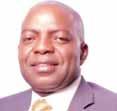
Across the world, there is a consensus that Nigeria is a very strategic country. Its enormous population size of more than 200 million people clearly sets it apart as one of the most populous destinations on earth, and home to the largest concentration of black people in the world. Our beloved country is also renowned for its large mineral deposits and extensive gas reserves, economic and political influence in Africa, especially in the West African region. This great nation also enjoys longstanding trade and diplomatic relationships with the most dominant global powers including the US, China, and the European Union. Beyond all of these, and as important as they are, my estimation of the most important strength of Nigeria lies
in the dynamic adaptability, intellect and resilience of our people. Our true greatness, I dare say, comes from the power and reach of ordinary Nigerians, the individuals whose energy, passion and imagination are creatively expanding the frontiers of our awareness, interactions, and the cultural memories we shall leave for future generations. Through the traffic gridlocks along Lagos roads to the ever-busy markets in Aba and Kano, the most common descriptions that capture the Nigerian spirit are energy, resilience, creativity and industry. Outside the shores of our country, from Washington to Boston, London, Brussels, Rio de Janeiro and Shanghai, Nigerians are remarkable for our exceptional ability to adapt to new environments and realities, systems and cultures. Nigeria, many who are familiar with the country
and its dominant ethos will agree, is a very beautiful country; but it is also a deeply controversial place. To the incurable optimist, Nigeria is the most fantastic place on earth — good weather condition, friendly population and a fine mix of urban and sub-urban locations. At the opposite end of the pole are implacable cynics, those who can effortlessly place all the troubles in the world within Nigeria’s geographic boundaries. This latter group are very likely to remember Nigeria as the origin of most of the scam proposals that hit their emails, a place of poverty and hopelessness, and definitely, a country with very corrupt political and business elites. In all honesty, there is no exact way to exhaustively look at Nigeria. To be able to understand it quite objectively, one must appreciate the good without attempting to downplay the not-so-good.
ANigeria is troubled and that’s very true. But it is also a place of opportunities, a land of dreams and a cradle of hope for tens of millions of people. To properly situate Nigeria’s objective reality is a very difficult assignment; it requires one to take a step back, and then gaze into the future to imagine what could be, as against what is, and what was. Nigeria at the beginning of the new millennium was a place of hope, a land brimming with expectations. Many had looked forward to the future with great optimism around the middle of 1999 as the country, after years of uncertainty with its attendant cost in human lives and material resources, returned to democratic rule. The
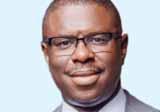
military officer who served as Nigeria’s Aviation Minister between 1985 and 1993 during the Babangida years once remarked that air travel was a luxury not meant for the poor. At the time, this comment sparked public outrage for its apparent insensitivity. Yet, more than thirty years later, that statement has proven eerily prophetic, as air travel has become increasingly inaccessible to most Nigerians. In Nigeria, the significance of air travel is even more profound. With an underdeveloped transportation infrastructure and the risks posed by road and rail travel, air travel has become both convenient and necessary. Despite this importance, soaring ticket
prices are reversing decades of progress, making air travel a luxury for the wealthy again. The soaring costs threaten the accessibility of air travel for the average Nigerian, restricting mobility and posing a barrier to economic inclusion. This problem cannot be delayed for another day. It demands immediate attention and action. This reality is compounded by Nigeria's unique economic and infrastructural challenges, which have made alternatives to air travel scarce, unsafe, or unreliable. As air travel becomes increasingly out of reach, so do the social and economic benefits it brings, from tourism to job creation. To restore air travel as a widely accessible service, Nigeria must address its infrastructural, regulatory, and
economic challenges with targeted reforms and strategic investments. These investments, if made wisely and with a long-term vision, could transform the current state of air travel in Nigeria, making it more affordable and accessible for all.
The limited alternatives to air travel make Nigeria particularly reliant on its aviation sector, especially given the poor state of the country’s road infrastructure.
According to a 2023 report by Nigeria's National Bureau of Statistics, approximately 60% of the nation’s roads are classified as “poor,” with many roads riddled with potholes, lacking signage, and without proper maintenance. These conditions are not only inconvenient but also dangerous, as travelling on these roads can
lead to vehicle breakdowns, accidents, and exposure to kidnappings and banditry. Between January and July 2024, over 500 cases of kidnapping were reported along Nigerian roads, highlighting the severe security challenges that plague ground transportation. Rail infrastructure, though expanding, remains limited, covering only 3,500 kilometres compared to India’s 65,000 kilometres, a stark illustration of Nigeria’s lag in connecting its vast geography. Water transportation is similarly underutilized, with infrastructure inadequacies and safety concerns making it an unreliable option for most Nigerians. Air travel holds unique importance in this environment
BENEATH THE SURFACE Continued on page 54